
©nicolasdecorte/Getty Images
Mozambique beckons with its coastline and swaying palms, its traditions, its cultures, its vibe and its opportunities for adventure. This enigmatic southeast African country is well off most travelers' maps, but it has much to offer those who venture here: long, dune-fringed beaches, turquoise waters abounding in shoals of colorful fish, well-preserved corals, remote archipelagos in the north, pounding surf in the south and graceful dhows with billowing sails. Add to this colonial-style architecture, pulsating nightlife, a fascinating cultural mix and vast tracts of bush. Discovering these attractions is not always easy, but it is unfailingly rewarding. Bring along patience, a tolerance for long bus rides, some travel savvy and a sense of adventure, and jump in for the journey of a lifetime.

Attractions
Must-see attractions.
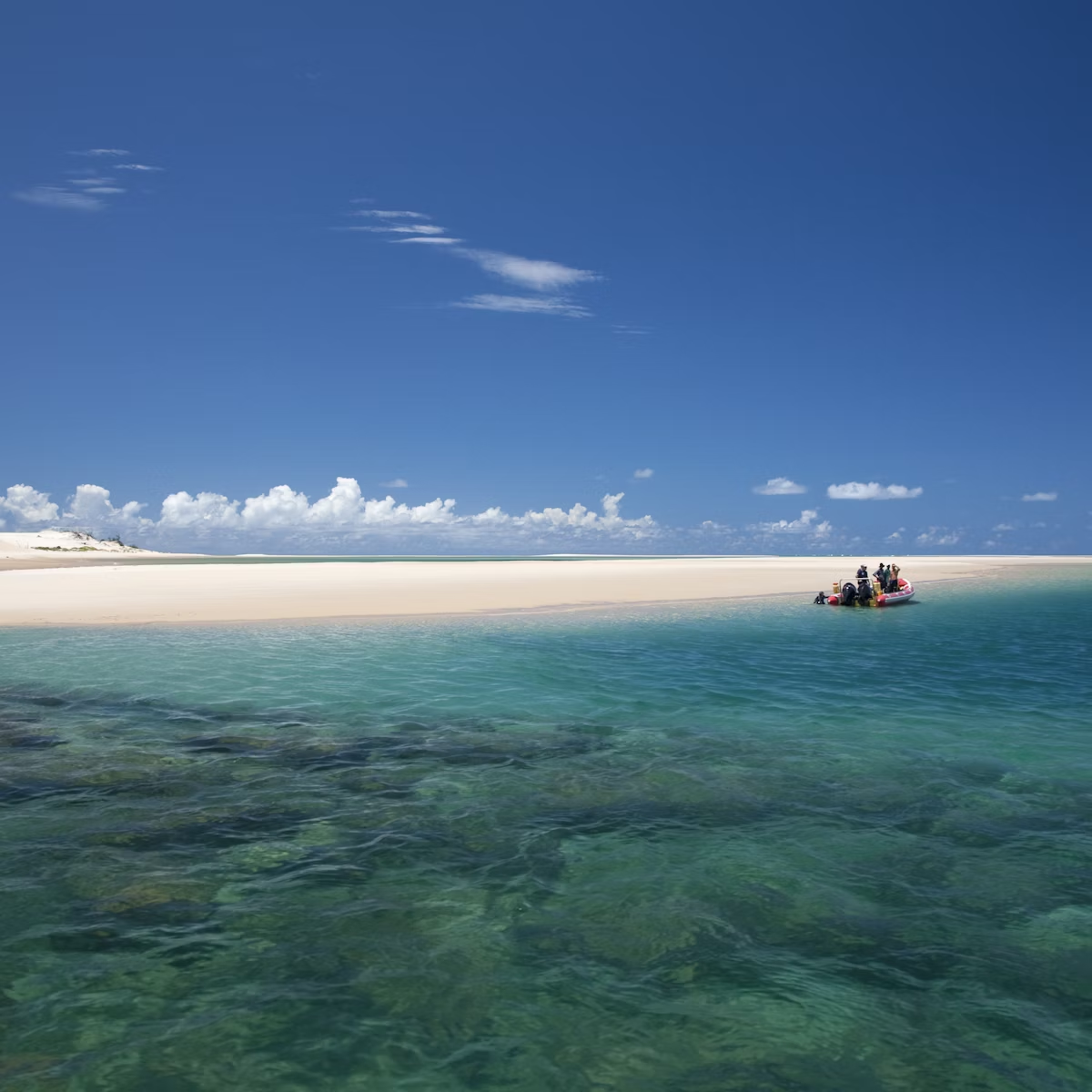
Bazaruto National Park
Bazaruto Archipelago
This1400-sq-km park protects the five islands of the Bazaruto Archipelago, plus surrounding waters. Thanks to this protected status, and to the…

Don't worry if you haven't the time or energy to summit Mt Namúli. Equally memorable is the 8km (one way) hike to the cascata (waterfall) in the hills…

Chissano Gallery
Works of renowned sculptor Alberto Chissano, as well as his remains, are on display in his family’s residence at the Chissano Gallery. Taxis from central…

National Art Museum
Half a block west of Avenida Karl Marx, the National Art Museum has an excellent collection of paintings and sculptures by Mozambique’s finest…

Centro Cultural Franco-Moçambicano
An excellent place, with art exhibitions, music and dance performances, films, theatre, a craft shop, a cafe and more.

Train Station
Maputo’s landmark train station is one of the city’s most imposing buildings. The dome was designed by an associate of Alexandre Gustav Eiffel (of Eiffel…

Gorongosa National Park
Though Gorongosa’s infrastructure is still being rehabilitated after the ravages of the civil war, and animal populations can’t yet compare with those in…

Parque Nacional das Quirimbas
Northern Mozambique
The Quirimbas National Park contains most of the southern Quirimbas islands (including Ibo, Medjumbe and Matemo) along with a large tract of coastal…
Plan with a local
Experience the real Mozambique
Let a local expert craft your dream trip.
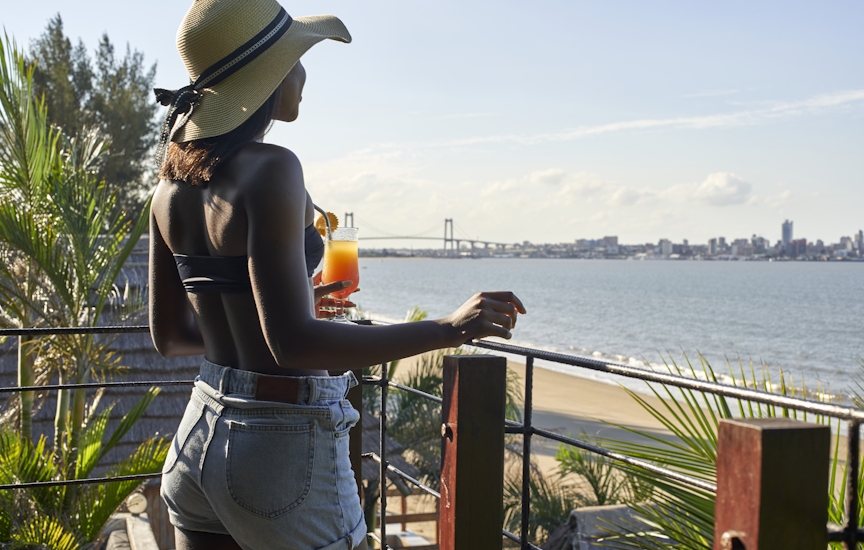
Latest stories from Mozambique
Filter by interest:
- All Interests
- Adventure Travel
- Art & Culture
- Beaches, Coasts & Islands
- Food & Drink

Dec 21, 2022 • 7 min read
From cruising across turquoise lagoons to hiking otherworldly coastlines, these island escapes offer something for every type of couple.

Nov 29, 2019 • 2 min read
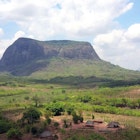
Oct 1, 2018 • 2 min read

Aug 22, 2018 • 6 min read
in partnership with getyourguide
Book popular activities in Mozambique
Mozambique and beyond.


- Travel Tips
- Reasons to Visit
Top 10 Reasons to Visit Mozambique Travel Guide

1. Mozambique has some of the most pristine dive sites in the world. The reefs of the Bazaruto Archipelago are home to over 1200 species of marine creatures including the rare Dugong.
2. With over 2500km of un-spoilt beaches Mozambique is the ideal secluded beach destination.
3. The deep channels that flow off the coast of Mozambique offer some of the best Big Game Fishing for Marlin and Sail Fish in the world.
4. Gold, slaves, Ivory and Pirates! Ilha de Mozambique and Ibo Island have long and fascinating histories and visitors can learn about the intriguing past of this coastline.
5. Beautiful tropical Islands. The Bazaruto and Quirimbas Archipelagos are some of the most romantic and secluded beach destinations in the world - ideal for a honeymoon.
6. Mozambique is also famous for the quality of its fresh seafood. The Portuguese influence is felt in dishes such as Peri-Peri (hot and spicy) Prawns and Peri-Peri Chicken.
7. Fantastic artwork - the northern regions of Mozambique are famous for their crafts, including sculptures produced by the Makondo people. Lots or art work depicts traditional beliefs, the struggle for independence and the civil war.
8. The Gorongosa National Park is one of the wildest and unspoilt national parks in Africa where visitors can have a true wilderness experience.
9. Music - as well as its great crafts Mozambique is famous for its traditional music, especially its marimba bands. Modern Mozambican music has been likened to Reggae and Calypso.
10. There are many great community projects and eco friendly developments that will appeal to the socially conscious and green travellers.
- Mozambique Beach Lodges

Mozambique Holiday Packages

- Customer Support
- Tel: +27 21 424 1037
- Fax: +27 21 424 1036
- Contact by Mail
- Business Hours
- Mon - Fri. 08:00 - 17:00
- Saturday. 08:00 - 12:00
- Reservations and Bookings
- Booking Conditions
- Visa and Passport
- About Siyabona Africa (Pty) Ltd
- Popular Pages
- Mozambique Package Holidays
- Diving in Mozambique
- Vilanculos Accommodation
- Inhambane Beach Lodges
- Mozambique Self-drive Tips
- Mozambique Wildlife
- Family Travel in Mozambique
- Mozambique Regions
- Lake Niassa
- Ponto do Ouro
TRENDING...
Africa Wanderlust
Here is a brief history to get you excited about our Mozambique travel guide.
Mozambique has traces of many civilizations that lived and ruled here. It was first inhabited by the Bantu tribes after the great Bantu migration. Even before the arrival of the Portuguese, it was a trade center between other African countries.
The arrival of Vasco de Gama in 1498 started a massive Portuguese settlement that lasted for four centuries until the country gained independence from Portugal in 1975.
However, the first multiparty elections weren’t held until 1994 due to a devastating civil war.
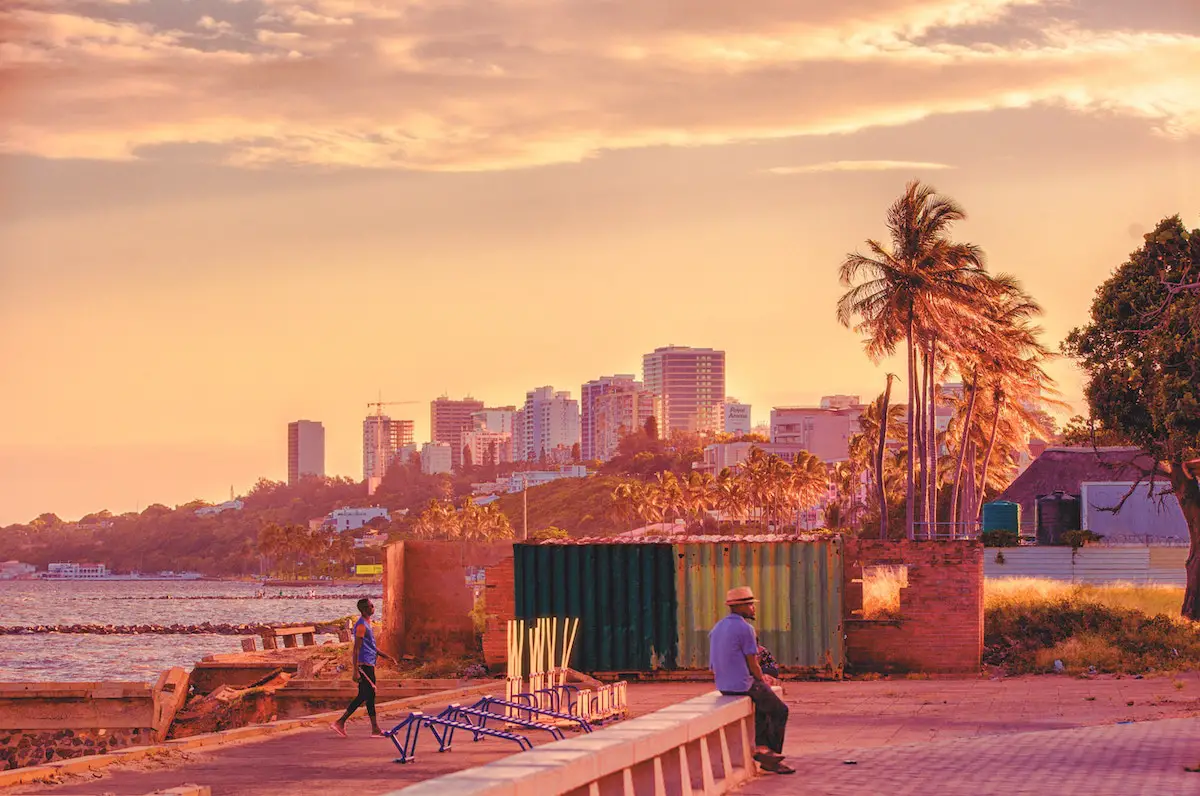
Ever since the first elected president, Mozambique demonstrated significant economic growth owing to its rich natural resources, with the dominance of agriculture, tourism, and manufacturing to some extent.
The discovery of a gas field with 4200 billion cubic meters of natural gas in Mamba made the country a potential candidate for producing liquefied natural gas.
Mozambique Travel Guide: Things to Do, Places to Stay, Culture, and Travel Tips
Capital: Maputo Official language: Portuguese President: Filipe Jacinto Nyusi Currencies: Mozambican metical
Plan a Trip to Mozambique
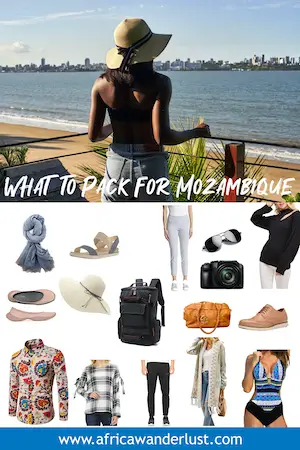
Points of Interest: Bazaruto Archipelago, Quirimbas Islands, and more… Average Flight Time: 24 h 45 min flight Fun Fact: The Island of Mozambique, just off Northern Mozambique, is a UNESCO World Heritage site.
Why Visit Mozambique
With the turquoise beaches and rich marine life, Mozambique is already the number one choice of tourists from South Africa and overseas.
[su_gmap address=”mozambique” zoom=”4″]
Whether you are at the vibrant capital city of Maputo or chilling on a hammock in the coastal city of Tofo, you are guaranteed to be mesmerized. Besides the lovely coastline, the country offers spectacular wildlife that is often underestimated.
In this travel guide, we aim to give you a quick yet comprehensive review of everything you need to know about this beautiful country.
Best of Mozambique
Best places to stay in mozambique.
#1 Maputo Afecc Gloria Hotel
It is located in Polana Cimento A district and walking distance from the shore of Maputo Bay and other top tourist destinations. If you are seeking luxury without the price tag, Maputo Afecc Gloria Hotel is the way to go.
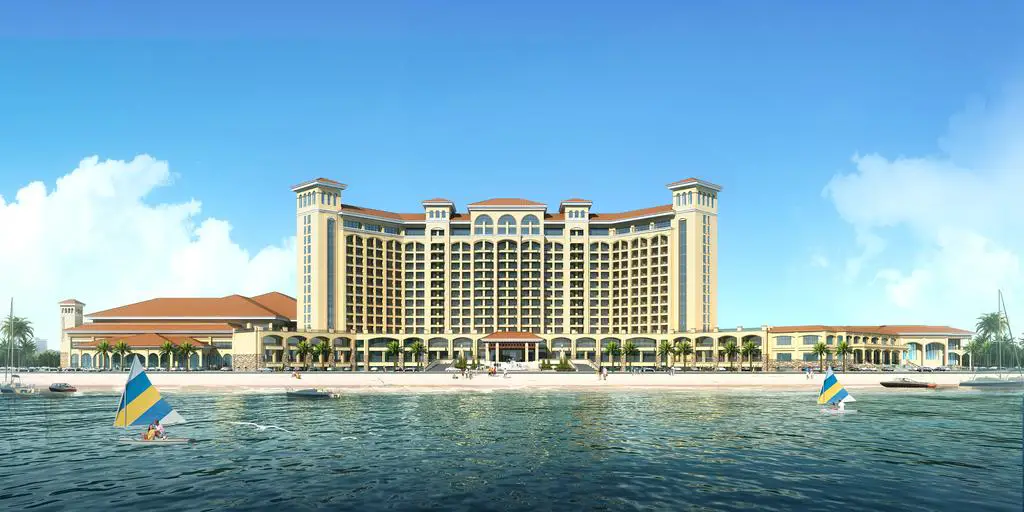
#2 Southern Sun Maputo
For the ultimate rest and relaxation, Southern Sun Maputo offers the perfect atmosphere. Located on the beautiful shores of the Indian Ocean you get everything you need including an in-house hair salon and boutique.
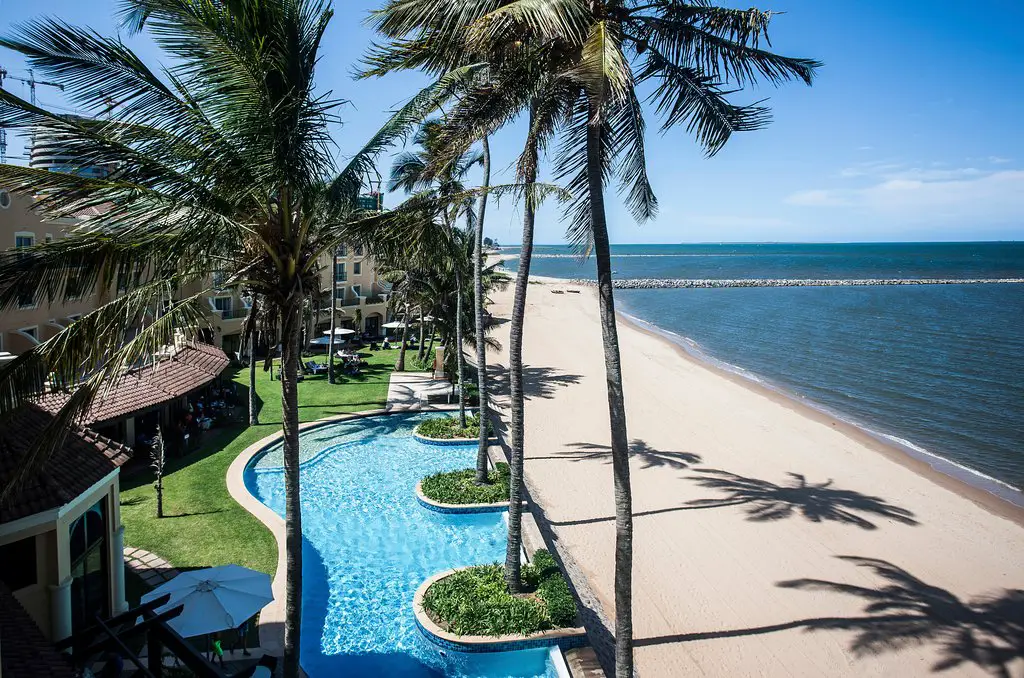
#3 Radisson Red/Blue Maputo
Line about Radisson
#4 Taka-Taka Hotel, Maputo
The Taka-Taka hotel is just 3.2 miles from the Maputo International Airport and is located in the Central A district in Maputo (~0.6 mi from Peace Square). The hotel features an on-site restaurant and room service with a beautiful atmosphere and beaches for guests.
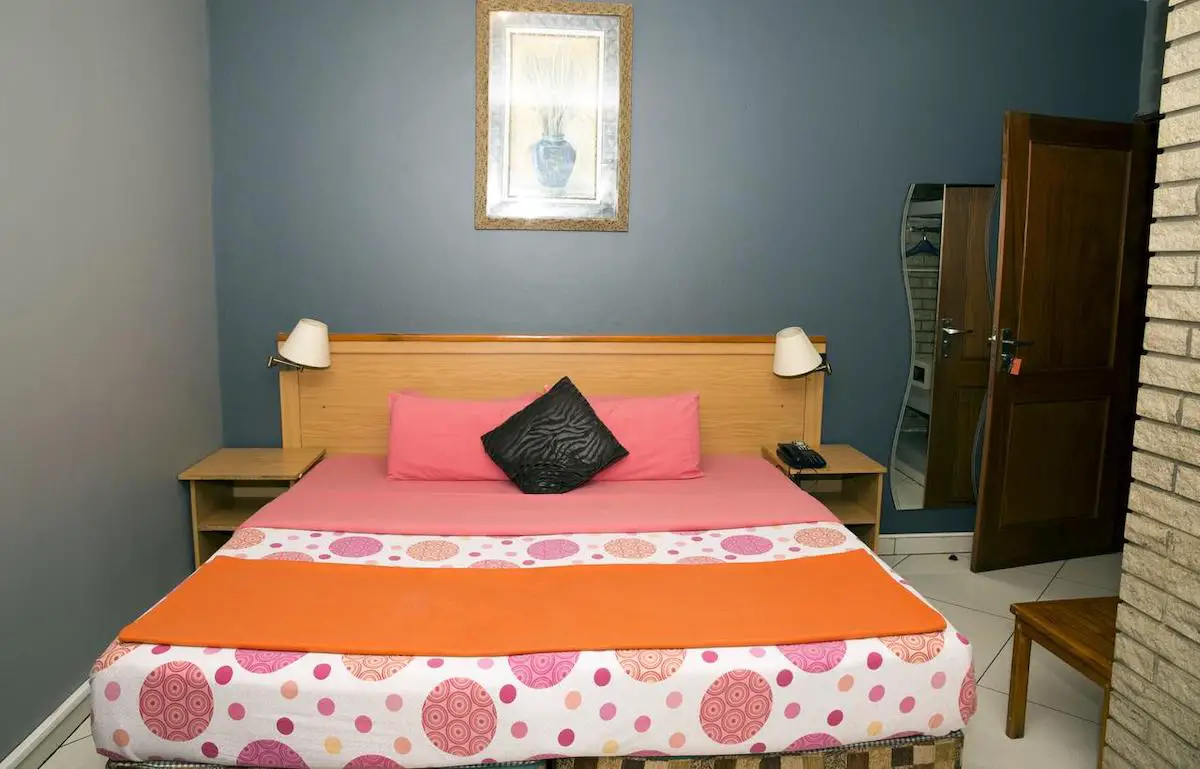
#5 Baia Sonambula, Tofo
Baia Sonambula in Tofo is a stunning hotel with lush gardens and a terrace for guests. The hotel features room service, continent breakfast, hairdryer and more. Baia Sonambula is just an 18-minute walk from the Tofinho Monument and other points of interest.
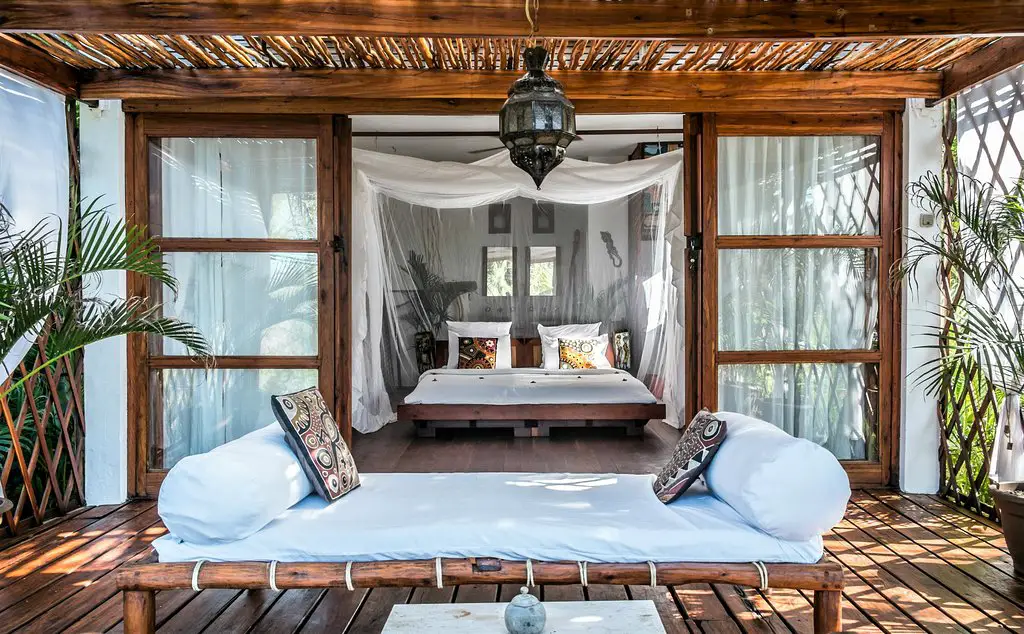
#6 Chuiba Bay Lodge, Pemba
For those looking for the tropical vibes in the Pemba, the Chuiba Bay Lodge offers over 24 acres of pure, undiluted nature situated between the dunes of a clear blue beach. Chuiba Bay Lodge is less than 5 miles from the Pemba International Airport.
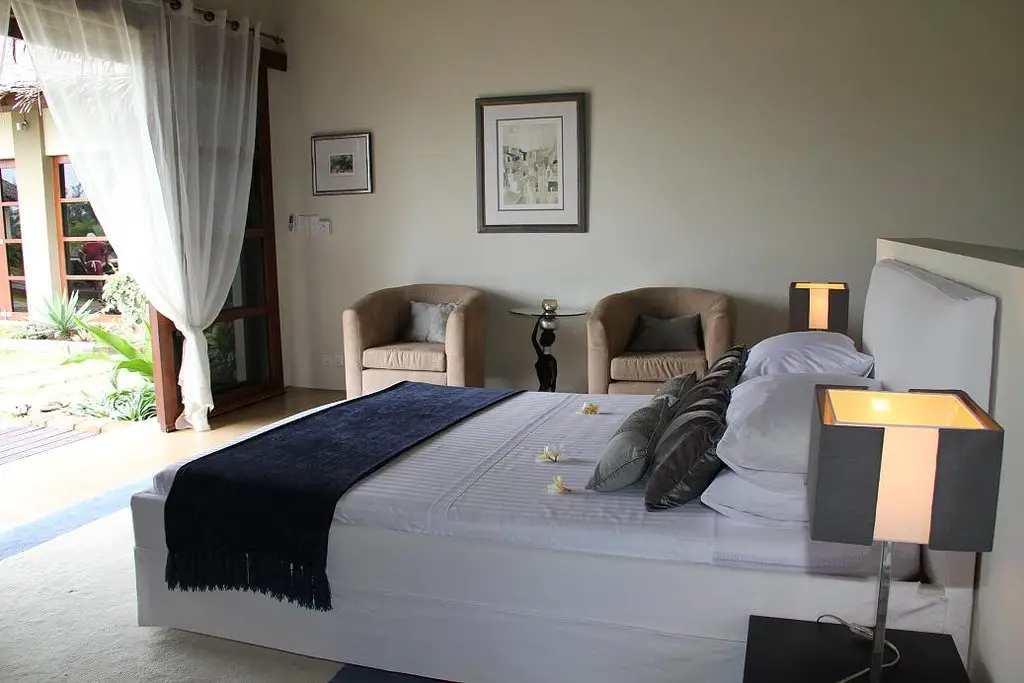
#7 Ruby Backpackers, Nampula
The ultimate backpackers’ paradise and top-rated accommodation in Nampula is Ruby Backpackers. At a rate of ~$30/night, you get a comfortable spot to lay your head inclusive of breakfast!
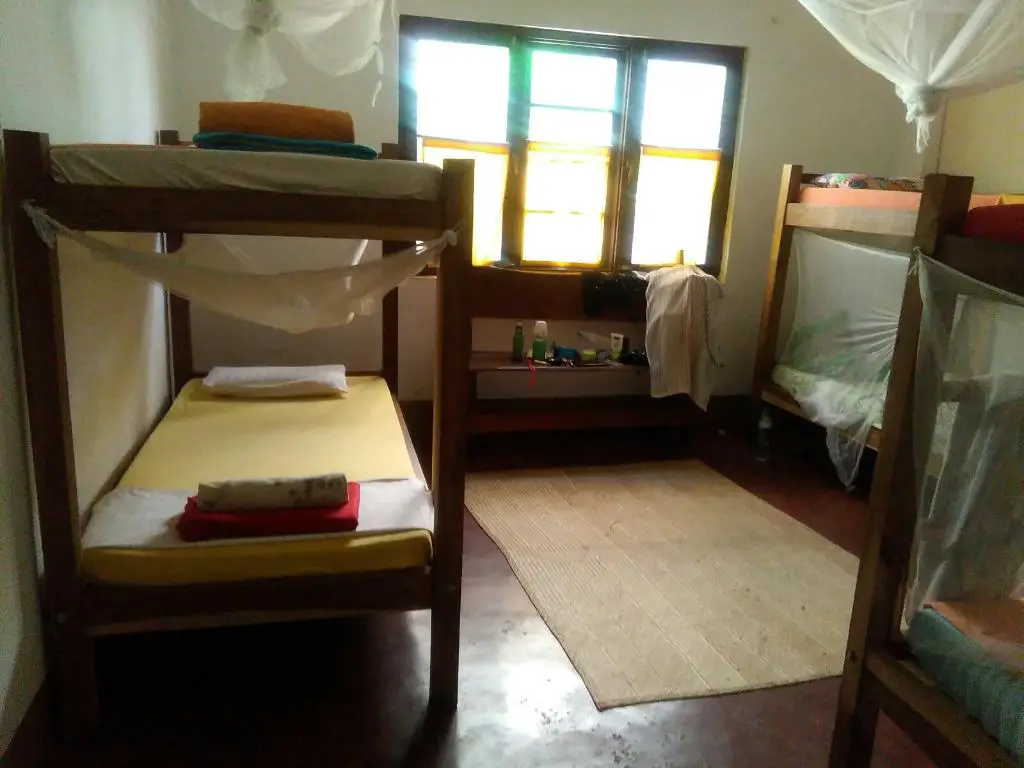
Best Things to Do in Mozambique
#1 Explore the beaches
Mozambique’s coastal towns will make you believe that you went to heaven while still alive. Port cities like Tofo, Vilankulo , Ponta do Ouro in the south, the Quirimbas Islands and Pemba in the north are full of turquoise beaches with crystal clear waters.
You can either sip a cocktail and relax by the beach all day or join the diving tours to see marine life from whales to dolphins.
#2 Visit the national parks
Although excessive hunting and civil war damaged the wildlife in the past, an enormous attempt is being made to bring it back. It seems that partial success was achieved.
The wetlands in the country still boast thriving wildlife of antelopes and occasional big game animals. The Maputo Special Reserve gives you a glimpse into the wildlife of this country.
#3 Explore the cultural heritage
Mozambique’s rich culture was influenced by Portuguese settlers, Bantu tribes, and many other civilizations. In the cities, you can admire the captivating architecture.
You can then visit the rural towns in the Zambezi Valley and Makonde Plateau in the north to witness the Bantu traditions that the people still practice. This is a great 9-day cultural tour of the coastal areas of Mozambique including Tofo, Vilanculos, and Chidenguele.
Related Content What should I pack for Mozambique? Bazaruto Archipelago Mozambique: Where Luxury Travel Meets Adventure Is Maputo safe for tourists? Beira Mozambique Tourist Attractions andBeyond Benguerra Island Mozambique: A First Look at Luxury
Best Things to See in Mozambique
#1 Archeological Site of Manyikeni
It contains the archeological remains of the Menu Mutapa Kingdom dating back to the 12 th century. The site is 52 km to the west of Vilankulo. There is not left of the remains but it’s a great stop if you need some time away from the beach.
#2 Gorongosa National Park
Gorongosa National Park is the largest national park in the country and the one with the most diverse wildlife. The thick vegetation of the park is home to wild animals like lions, elephants, and hippos. Lake Urema, Murombodzi Falls, Mount Gorongosa, and Cheringoma Plateau are main attractions.

#3 Bazaruto Archipelago
The group of six islands belongs to the mainland Vilanculos, creating picturesque sandy beaches, coral reefs suitable for many water sports.
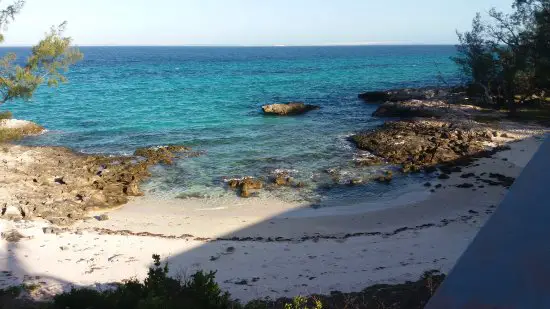
Ready for your trip to Mozambique? Don’t forget these key essentials . You might also find this post about Gorongosa National Park insightful.
Best Places to Eat in Mozambique
Mozambican cuisine is heavily influenced by Portuguese, African and Arab cultures. Needless to say, you will reach the Nirvana of seafood here.
#1 Zambi, Maputo
#2 Dhow Café, Maputo
#3 Piri Piri, Maputo
#4 Branko’s, Tofo
#5 What U Want Restaurant
Typical Costs
Average Flight Cost from Maputo to Inhambane: $100 Set low fare price alert for Mozambique!
Accommodation
Fatima’s Backpackers in Maputo: $8.50 per night Baobab Backpackers in Vilanculos: $32 per night Standard hotels in Maputo: $30-40 per night Standard hotels in Tofo and Vilanculos: $60-100 per night
Meals such as seafood platter: $6 Beer: $2 Fruits: $0.006 each
Transportation
Chapa from Maputo to Tofo: $12 Single tuk-tuk ride in the city: $1-2
A full-day diving tour in Vilanculos: $50 Shark-whale-dolphin spotting in Tofo: $40 Full single-day tours : $45 – $350
Total Travel Cost
By African standards, Mozambique is a pretty affordable country to explore. You’ll likely spend the most on accommodation. Depending on your budget or luxury needs, you might spend about $100/day which includes your hotel.
That comes out to $700, give or take, for a one-week trip. There is a $50 fee for a single-entry visa on arrival.
Mozambique Travel Tips
Weather in mozambique.
Mozambique is one of the countries where the Tropic of Capricorn passes through. Therefore, it has a wet and a dry season.
The wet season is in summer between December and April, with temperatures varying between 22 and 32 degrees. The dry season is slightly colder, but still warm enough between 18 and 24 degrees.
Best Months to Visit (When to Visit)
The wet season is when the cyclones occur. Although they don’t occur every year, you must still follow the weather forecast for the most recent reports.
The dry season between June and September is much more plausible for touristic activities, especially if you are looking to sail out into the ocean. This is the best time for diving because of high visibility, absence of strong winds and weak currents.
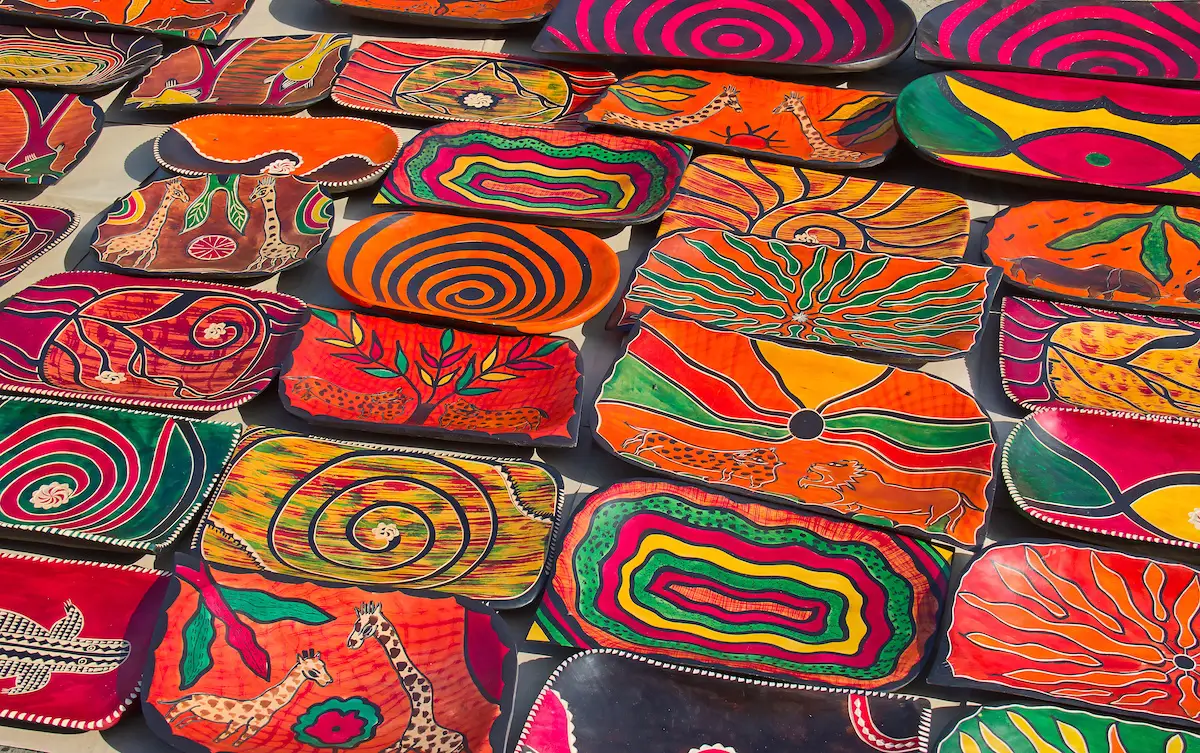
How to Save Money in Mozambique
- Food is incredibly cheap in Mozambique, but you can still save up from transportation and accommodation.
- Public transport between towns- although a bit painful and overcrowded – is as cheap as $5 – $10 for a 6-hours-long ride
- Ruby Backpackers is always accommodating for budget travelers. Fatima’s Backpackers is an alternative with two branches; one in Maputo, one in Tofo.
Mozambique Travel Guide: What You Need to Know About Mozambique
- Mozambique is unfortunately in a high-risk-malaria zone, so you need to include anti-malarial pills when you are preparing your packing list. There are options at varying prices. The rule of thumb is, the cheaper the pills are the more severe the side effects become.
- You must only buy water and drinks from trusted brands with proper packaging. In January 2015, a mass poisoning occurred due to contaminated beer, causing the death of 72 people.
- Mozambique is safer compared to African countries like South Africa; however, that doesn’t mean you shouldn’t be street-smart. Take necessary precautions, don’t flash your valuables, don’t walk alone at night; you will probably be just fine.
- The northern half of the country is under the threat of cyclones such as cyclone Ida that caused massive destruction. You should always keep an eye on the weather forecast before you plan your trip.
Culture & Customs
The official language is Portuguese; however, several Bantu languages are also spoken in the rural area. These include Tsonga (Tswa-Ronga), Shangaan, Makhuwa, Zulu, Makonde, and Chopin.
The currency is Mozambican Metical (MT)
1 USD = 62 MT 1 CAD = 46.06 MT 1 AUD = 41.22 MT 1 EURO = 67.68 MT 1 GBP = 74.67 MT
A tip of 10% is expected at restaurants. Guides, kitchen and cleaning staff will also appreciate the tipping of 3-5 USD.
Although Mozambique’s wildlife suffered from extensive poaching and hunting, current attempts are successful at re-introducing a huge portion of the animals.
The fertile soil of the terrain accommodates thousands of antelopes, elephants, giraffes, rhinos, lions, hippos and crocodiles. The wetlands are also in perfect condition for the birdlife.
You can read our detailed guide about Gorongosa National Park for more information.
Getting Around Mozambique
Renting a car in South Africa is possible for driving to Mozambique; however, it is not recommended. The police are inclined to pull over international drivers for bribery.
You can take the chapa-type buses between towns and tuk-tuks in the cities. (see the prices above)
There are also flights between major cities. Check LAM Mozambique Airlines for details and booking.
Entry & Exit Requirements
- Mozambique does not require a visa from SADC countries for up to 30 days
- The other countries are required to obtain a visa, which can be granted at the borders on arrival for 50 USD. The visa allows a single entry and is valid for 30 days.
We hope you found our detailed Mozambique travel guide helpful. To help you get started on your trip, check out our Mozambique resource page for everything you need to know for your trip. Depending on what city in Mozambique you visit, you may also want to consider visiting Zimbabwe , Eswatini (Swaziland) , Tanzania, Zambia , and/or Malawi since they will be within driving distance from Mozambique.
Love it? Share & Pin it!
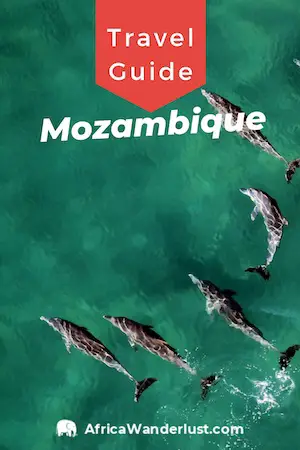

- Write for Us
- Travel Shop

Solo Female Travel Diaries: Experiencing the World Alone
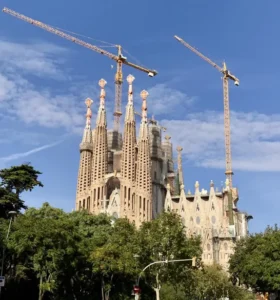
Best Destinations for Educational Travel for Females
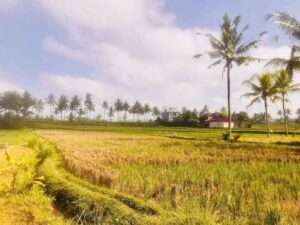
Top Picks for Solo Travelers: Female Weekend Getaways

Solo Travel Adventures: Tips for Safe and Rewarding Exploration
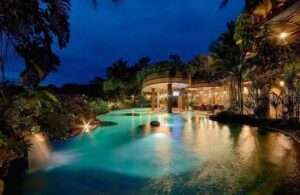
12 Best All-Inclusive For Girls Trip | The Ultimate Guide
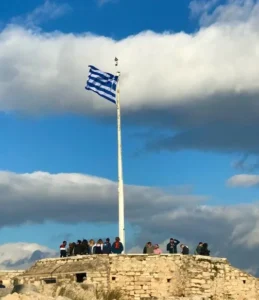
The Best Places for Luxury Girls Trips in Greece
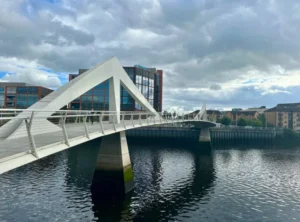
The Best Places for Adventure Girls Trips in the UK

Travel Safety Tips | How to Travel Safer and Mitigate Risk

Best Hotel by Kearsage Pass Kmt for Hikers
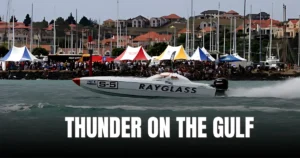
Offers Thunderonthegulf.com: Top Gulf Coast Adventures
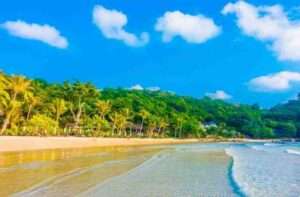
Best Nude Beaches in Thailand 2024
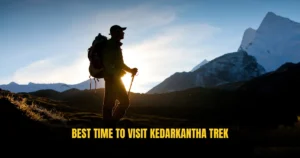
Best time to Visit Kedarkantha Trek | A Month & Season Guide
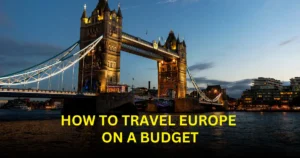
How to Travel Europe on a Budget: Everything You Need to Know
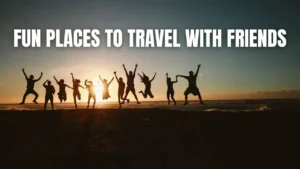
From Thrills to Chills: Fun Places to Travel with Friends
Best Budget-Friendly Trip To Kashmir & Ladakh 2024
How to Travel on a Budget Without Compromising the Experience 2024
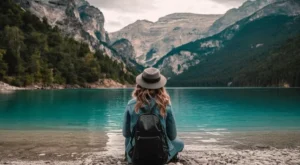
Why a Luxury Villa is the Perfect Place for Solo Travel
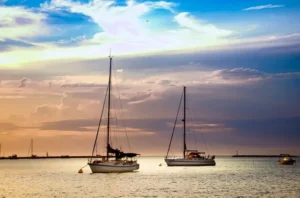
The Best Places for Luxury Girls Trip in Croatia

Best Places for Luxury Girls Trips in Indonesia

Conquering the Alps in Style: Luxurious Taxi Transfers for Unforgettable Experiences

7 Top Reasons Why You Should Need to Visit Mozambique

Mozambique is a country that’s full of surprises. From its long, sandy coastline to its dramatic mountains, there’s a little something for everyone. Mozambique is a country with a complex history, having gained independence from Portuguese colonial rule in 1975. It subsequently experienced a prolonged civil war that ended in 1992. Since then, Mozambique has made strides in peace and development. It’s known for its warm and welcoming people, stunning natural beauty, and a growing tourism industry. If you’re a solo traveler on the fence about whether or not to Visit Mozambique, here are 5 reasons that might just convince you to visit Mozambique.
It’s Home to Pristine Beaches
Imagine lying on the beach , the sun warming your skin and the waves crashing against the shore. Now multiply that by a thousand, and you’ll start to get an idea of what Mozambique has to offer. This is a country with an abundance of pristine beaches, making it the perfect place to relax and escape the hustle and bustle of everyday life. In the Bazaruto Archipelago and the Quirimbas Islands, you can have the opportunity to go swimming, diving, or snorkeling; Mozambique has something for you. The Mozambique Channel along the country’s coastline is a hotspot for scuba diving and snorkeling. The warm waters are home to a plethora of marine life, including colorful coral reefs, manta rays, whale sharks, and various species of fish. Pemba, Tofo, and Vilanculos are popular diving destinations .
The Food Is Delicious and Diverse When You Visit Mozambique
Have you ever had Mozambican food? If not, you’re in for a treat. The cuisine here is delicious and diverse, with flavors that will tantalize your taste buds. You can find all sorts of dishes , from seafood to curries to pizza. And the best part is, you can find restaurants serving up all sorts of different cuisines in every corner of the country. Whether you’re in the mood for something spicy or something sweet, you’ll be able to find it. Mozambique is also a great place to try traditional dishes like piri-piri chicken or cassava bread. So, make sure you sample as much of the food as possible while you’re here—you won’t regret it!
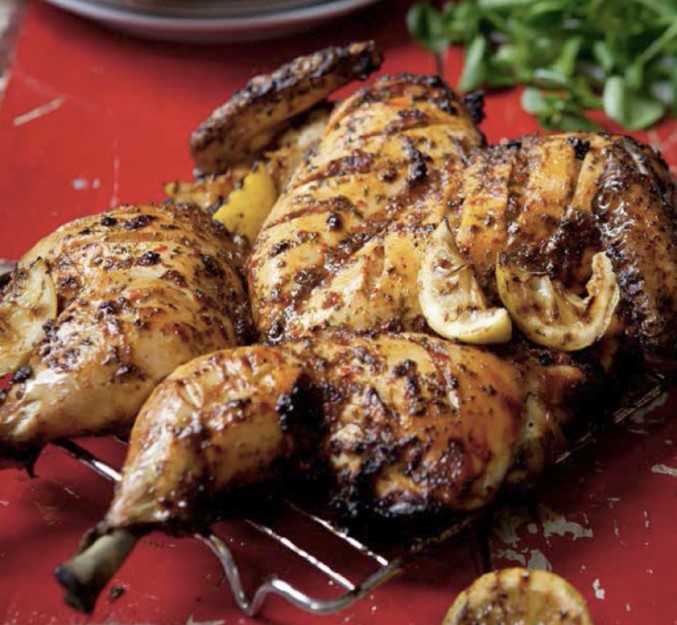
There’s a Rich Cultural Heritage to Explore
There’s so much to explore when visiting Mozambique when it comes to its culture. From the vibrant art and music scene to the traditional cuisine, you’ll find a wealth of experiences to enjoy. One of the best ways to get a sense of Mozambique’s culture is to visit one of its many cities. Be sure to visit the city of Macuti. It’s home to some of the country’s most important cultural heritage sites. One of the most popular sites is the Fort of São José, which was built in 1762 by the Portuguese.
It’s now a museum that showcases the history and culture of Mozambique. Another important site is the Cathedral of Our Lady of Conception, which was built in 1892 and is considered one of the most beautiful churches in Africa. There, you can meet the locals and learn about their way of life. You’ll see how they live, work, and play, and you’ll get a taste of their delicious cuisine. So, if you’re looking for an authentic cultural experience, be sure to add Mozambique to your list!
The country’s history is marked by the influence of various indigenous tribes, Arab traders, Portuguese colonial rule, and the struggle for independence. Visitors can explore this heritage through traditional dance and music performances, craft markets, and historic sites like the Island of Mozambique, a UNESCO World Heritage site.
The Wildlife Is Incredible
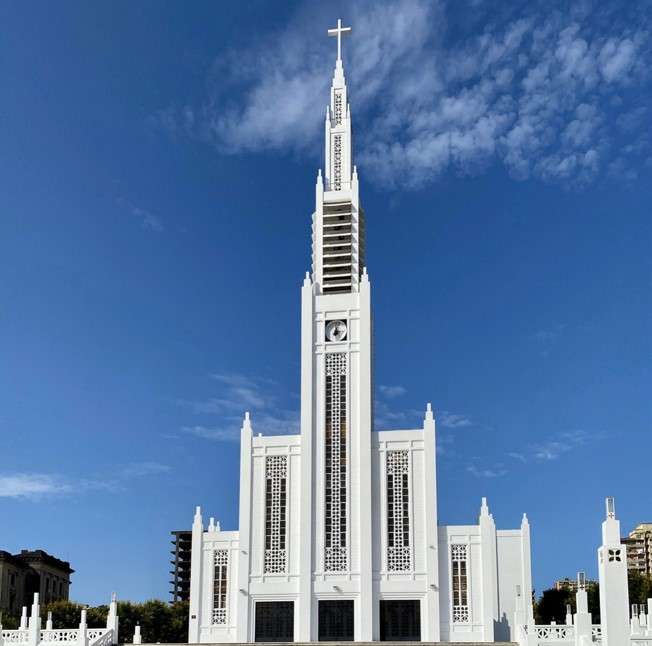
It’s an Affordable Travel Destination
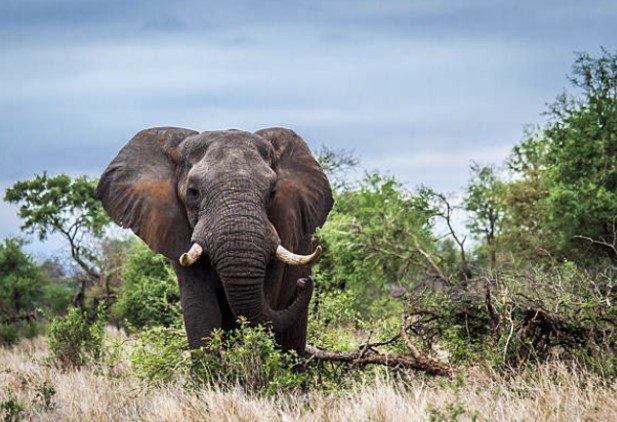
When it comes to Visit Mozambique is an affordable destination . You can find some great deals on airfare and hotels, and the cost of living is relatively low. You can stretch your dollar further here than you could in other parts of Africa. But don’t let the low cost fool you—Mozambique is a beautiful country with a lot to offer. From pristine beaches and crystal-clear waters to dense jungles and rolling hills, there’s something for everyone here. With a rich history and culture, you’ll get a real sense of the African continent while you’re exploring this wonderful country.
The Island Paradises of Mozambique
Bazaruto archipelago.
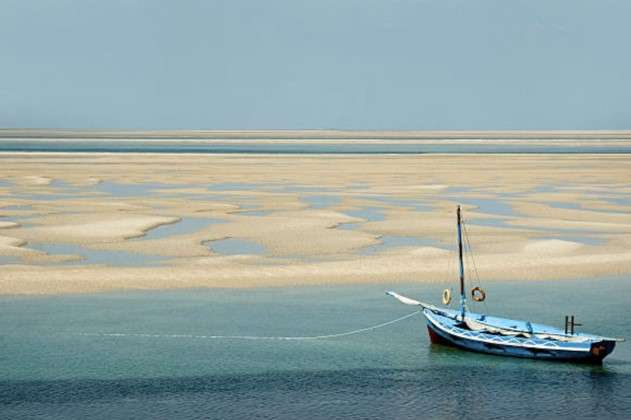
Prepare yourself for a dose of exquisite beauty off the coast of southern Mozambique. These islands are like the Instagram filters of nature, boasting pristine white sandy beaches, crystal-clear turquoise waters, and vibrant coral reefs that will have you reaching for your snorkeling gear faster than you can say “under the sea.”
We’re talking about an absolute feast for the eyes with colorful fish, coral formations, and other underwater wonders that will leave you feeling like a character in a Disney movie.
Now, let’s talk water activities! The Bazaruto Archipelago doesn’t mess around when it comes to keeping you entertained. Snorkeling , diving , kayaking , sailing — you name it, they’ve got it. The calm and warm waters make it a dream environment for both beginners and experienced water enthusiasts.
The Bazaruto Archipelago isn’t just about adrenaline-pumping activities. It’s also a sanctuary for relaxation. With luxurious resorts and secluded coves, this place screams “tranquil retreat.” Picture yourself lounging on the beach, sipping a mojito, and indulging in spa services that will make you forget what stress even means.
Quirimbas Archipelago
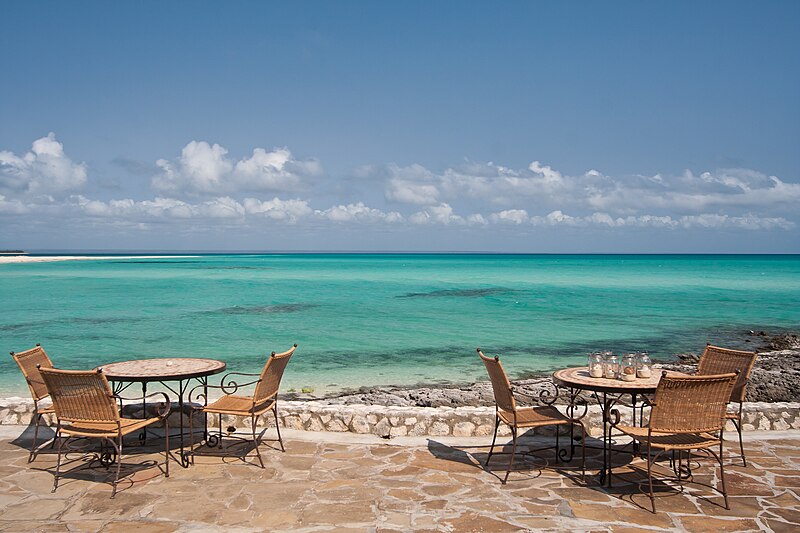
Now let’s venture up to the Quirimbas Archipelago in northern Mozambique, a collection of coral islands packed with untouched beauty that will make your jaw drop. We’re talking about 32 islands, each with its own unique charm. Forget about selfies, because these islands deserve a full-on photoshoot to capture their pristine natural beauty.
History buffs, listen up! The Quirimbas Archipelago has got some serious historical significance going on. You’ll find remnants of ancient Arab and Portuguese settlements scattered across some of these islands. Cue the dramatic music and pretend you’re in a historical documentary.
Quaint villages along the waterfront offer a glimpse into the local way of life. Get ready to immerse yourself in the rich cultural tapestry of the region as you encounter the hospitality of the island communities .
The Quirimbas Archipelago is like a buffet of diverse ecosystems . Mangrove forests, coral reefs, marine sanctuaries — it’s a treasure trove of natural wonders waiting to be explored. Strap on those hiking boots, grab your snorkel gear, and get ready for adventure. There’s no shortage of landscapes to appreciate and fall head-over-heels in love with.
Laid-back Atmosphere

Cultural Influence: Embrace the Slow Life
So, Mozambique’s got this seriously chilled-out atmosphere, and guess what? It’s all thanks to its cultural fabric. You see, this place is like a melting pot of African, Portuguese, and Arab influences, creating a lifestyle that’s all about leisure, community, and connecting with nature. It’s like they said, “Screw the hustle and bustle, let’s just kick back and take it easy.”
Time-Honored Traditions: All Hail the Unhurried Pace
The laid-back pace of life reflects a commitment to preserving time-honored customs and, get this, connecting with the natural rhythms of the environment. It’s like they’ve taken the “stop and smell the roses” saying and turned it into a way of life. I don’t know about you, but I’m ready to hop on board with that.
Unhurried Pace of Life: Wave Goodbye to the Rat Race
It’s the ultimate escape from the fast-paced routines and suffocating stress. In this land of relaxation, you can slow down, unwind, and savor the simple pleasures of each moment. So go ahead, take a deep breath and let all that stress just float away on a hammock by the beach.
Friendly Locals: Come for the Vibes, Stay for the Hospitality
Let’s talk about the locals, shall we? The people you’ll meet in Mozambique are as warm and friendly as a sunbeam on a lazy summer day. Their genuine hospitality and easygoing nature contribute majorly to the overall relaxed atmosphere. And don’t be surprised if you find yourself making lifelong friends and feeling like a part of the community. Because in Mozambique, they make you feel like you’ve found your second home.
There’s no denying that Mozambique is one of the most beautiful and under-the-radar countries in Africa. From its stunning coastline to its lush inland forests, there’s something for everyone in Mozambique. With its beauty and affordability, you truly should consider adding Mozambique to your bucket list of places you need to see in this lifetime. And no matter where you choose next, always remember to Travel Till You Drop!
Book Your Trip : Check Out My Resources for Your Travel Needs
Use Skyscanner to find a cheap flight. This is my very first stop when I’m looking for my next trip . It’s a fast, easy-to-use search engine that is perfect for finding an affordable flight, a perfect hotel, and the right rental car for you in locations around the globe.
Book Your Accommodation
If you are looking for a super budget friendly location and are open to a hostel stay, make sure you book your hostel with Hostelworld . It offers the broadest range of quality hostels around the world.
If you’d prefer a hotel or a guesthouse for stays less than 28 days, drop on over to Booking.com It’s perfect for providing excellent options, a ton of user reviews, and prices to fit every budget.
For stays over 28 days, AirBnB still remains my #1 choice. User reviews and monthly pricing allow for some incredible deals all around the world.
Don’t Forget Travel Insurance
Travel insurance is but a small up-front investment that you won’t want to leave home without. After just one experience of having to delay or cancel your trip or having your luggage stolen, you’ll wish you would have made that investment. I’ve hated my life a few times when the moment arose, and I decided to skip out. Let’s just say, I’ve changed my ways and recommend each of the following companies to protect your ass-ets.
My favorite companies are:
- SafetyWing (best for All Travelers)
- World Nomads (best of Adventure Travelers)
- MedJet (great for additional evacuation coverage)
Want to Travel for Free?
Travel credit cards allow you to earn points that can be redeemed for free flights and accommodation — all without any extra spending. Check out my guide to getting free flights to get started.
Ready to Book Your Trip?
Check out my Resource Page for the best companies to help you book your travel at reduced rates! This list will help you get to where you’re going. I know-I use them ALL the time!
- jill charpia
- July 18, 2023
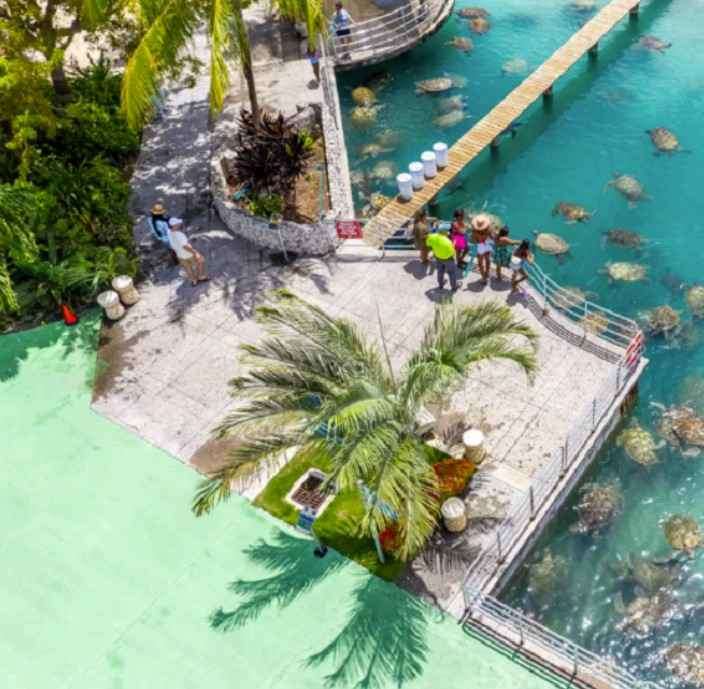
10 Best Places to Visit in the Cayman Islands

Packing Perfection for Women on The Go: Jet Setter’s Style

Travel by BlaBlaCar in Europe | 3 Tips to Save Money on Travel

Hi, Jill Here
Hi! I’m Jill, a Dallas, Texas girl traveling the world. After a career in the Air Force and touring over 50 countries later, my need to explore keeps going! It’s time to rock & roll and find all those places I never knew I was missing.
Table of Contents
Join me to get exclusive travel tips, giveaways and more!

Quick Links
Useful Links
Subscribe to get special offers, free giveaways, and once-in-a-lifetime deals.
Get Connected
Copyright © 2023 | All Right Reserved
Review Cart
Mozambique Island: Things to Do + Travel Guide
Mozambique Island (Ilha de Moçambique) is the quintessential UNESCO World Heritage Site destination, embodying all that we love about travel.
Ilha somehow feels like what a UNESCO site was meant to feel like—a living, breathing place pulled from the brink of ruin, with the hope of preserving something unique and significant to humanity’s story.
Now, be forewarned, Mozambique Island won’t have the level of tourist infrastructure one might expect in places like Zanzibar , nor is it a popular holiday destination like those found on numerous Kenya beaches .
This is an intrepid traveler’s destination, where the journey and the destination are one and the same.
Mozambique Island, like the country of Mozambique in which it’s located, demands more from travelers than simply being a passenger along for the ride.
Expect to work a bit to get here and to step out of your comfort zone once you’ve arrived.
For your efforts, also expect to be rewarded beyond your imagination with stunning sea views and sunsets, extraordinarily friendly and charming residents, and an authenticity found in few UNESCO towns in the 21st century.
In short, expect a travel adventure of the best kind.
Read on to discover more about this breathtaking, off-the-radar destination, including why you should go and where to stay , what not to miss , how to get to Mozambique Island , and so much more!
Why Visit Mozambique Island?
What is the island of mozambique known for, where to stay on mozambique island, what to see & do on mozambique island, our favorite places to eat & drink, what to pack for mozambique island, how to get to mozambique island, final thoughts, planning a trip to east africa.
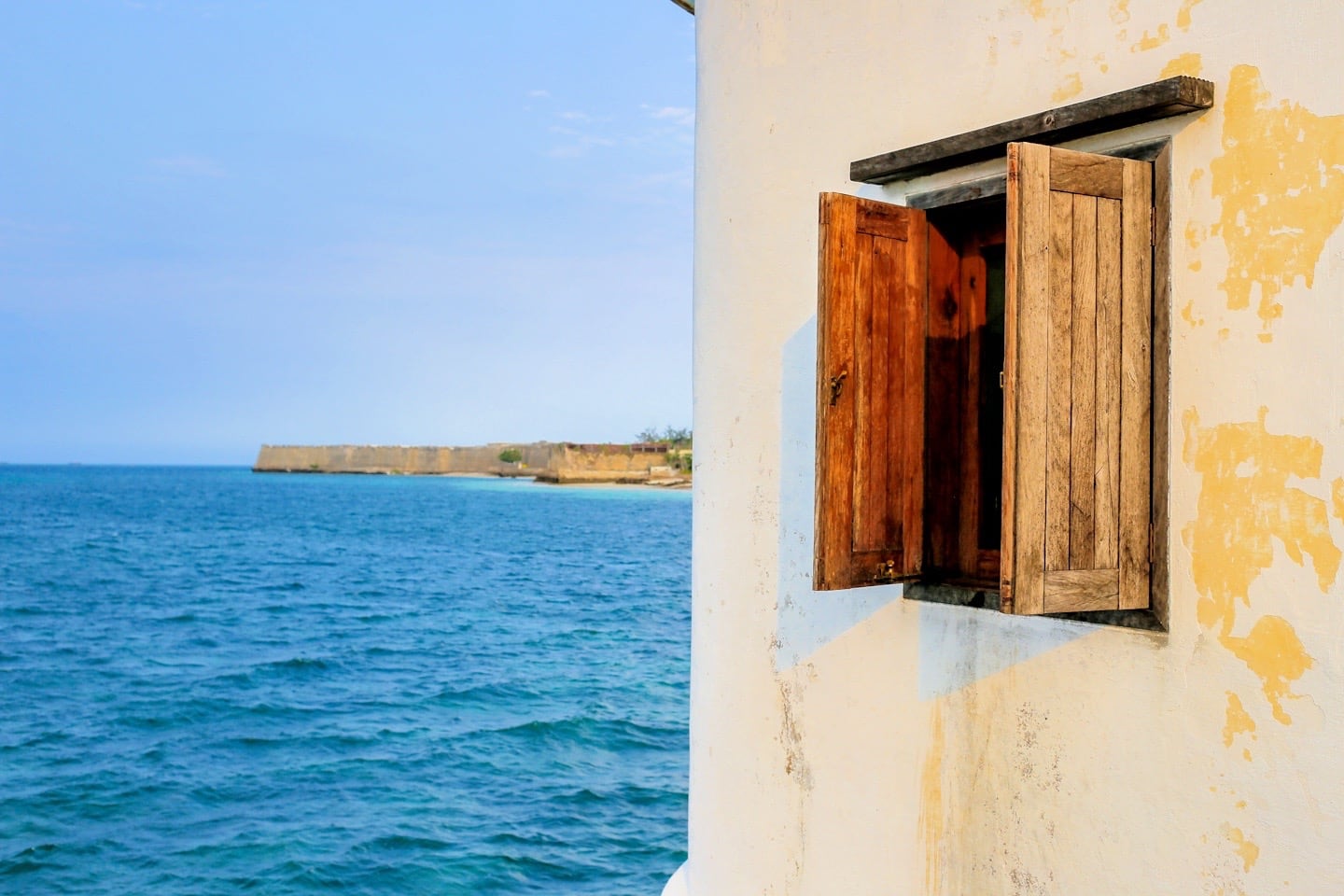
Many travelers like to compare Mozambique Island to Zanzibar and Lamu, Kenya , two ancient Swahili settlements also along the coast of East Africa and UNESCO sites as well. But to do so is to lose sight of what makes Ilha so special.
At present, the island simply isn’t set up to absorb large amounts of visitors, nor does it receive tourist numbers comparable to Zanzibar or even Lamu. Like much of Mozambique, tiny Ilha still falls short of offering its own residents the level of infrastructure enjoyed by residents of Zanzibar or Lamu.
Ilha de Mozambique is not easy to reach, nor is the island cheap. There are many mid-range lodging options, but few budget or luxury options (but this is slowly changing). That puts Mozambique Island squarely off the tourist trail.
And that is perhaps why Ilha is so fantastic for travelers willing to make the leap.
It’s a vibrant community of 14,000 Mozambicans that just happens to host the occasional smattering of intrepid travelers throughout the course of the year.
Because of the island’s virtual overnight abandonment a century ago, most of the old city remains as it once was, albeit crumbling—much of it ruined by time and neglect—which makes the island all the more fascinating.
But there’s no denying that the island, itself, is the real attraction here. Walking the sand and cobblestone roads through winding allies of steady decay and pockets of restoration—passing dhows gliding lazily across the bay, and the incomprehensibly friendly residents—forms the real charm and mystique of this place.
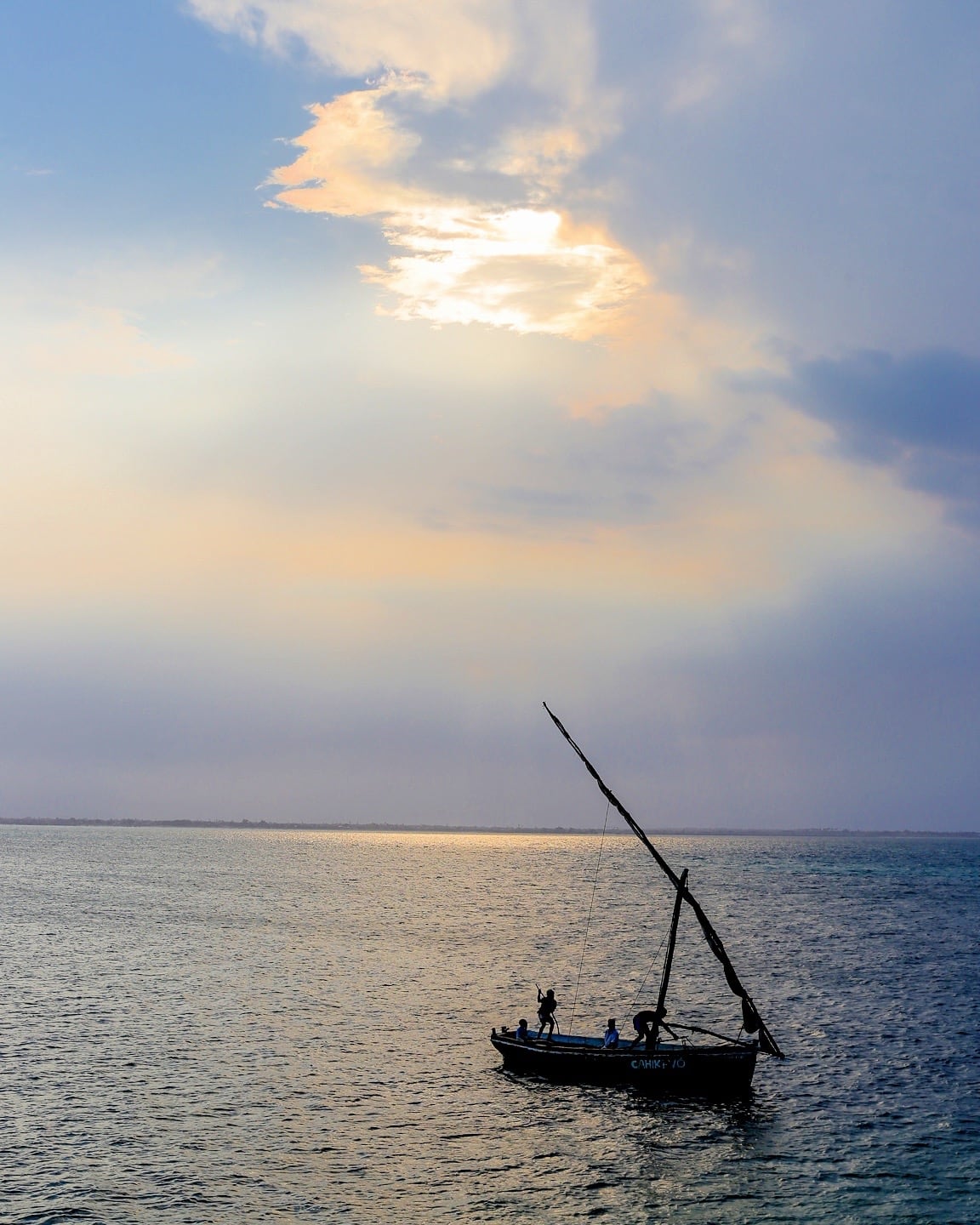
The story of Mozambique Island is one of meteoric rise—from relative obscurity to one of the most significant trading ports in the known world of its time—followed by a massive reversal of fortune, leading to decline and return to obscurity.
Following decades of political instability, UNESCO status and traveler interest has again fueled a resurgence signaling an upswing in the island’s fortune.
In the late 15th century, Portuguese explorer Vasco da Gama landed on Sultan Ali Musa Mbiki’s small island of Arab shipbuilders. Within a decade, the Portuguese took control of the island and named it in honor of the deposed sultan: Moçambique .
By the close of the 16th century, Moçambique would become the capital of Portuguese East Africa and one of the largest centers of slave trade on the continent.
Following independence in 1975, the entire country was re-christened “Mozambique” (Portuguese: Moçambique).
By that time, however, the Island of Mozambique had been in decline for some time. The island’s fate was sealed with the opening of the Suez Canal, signaling a move of the capital to Lourenço Marques (present-day Maputo) in 1898.
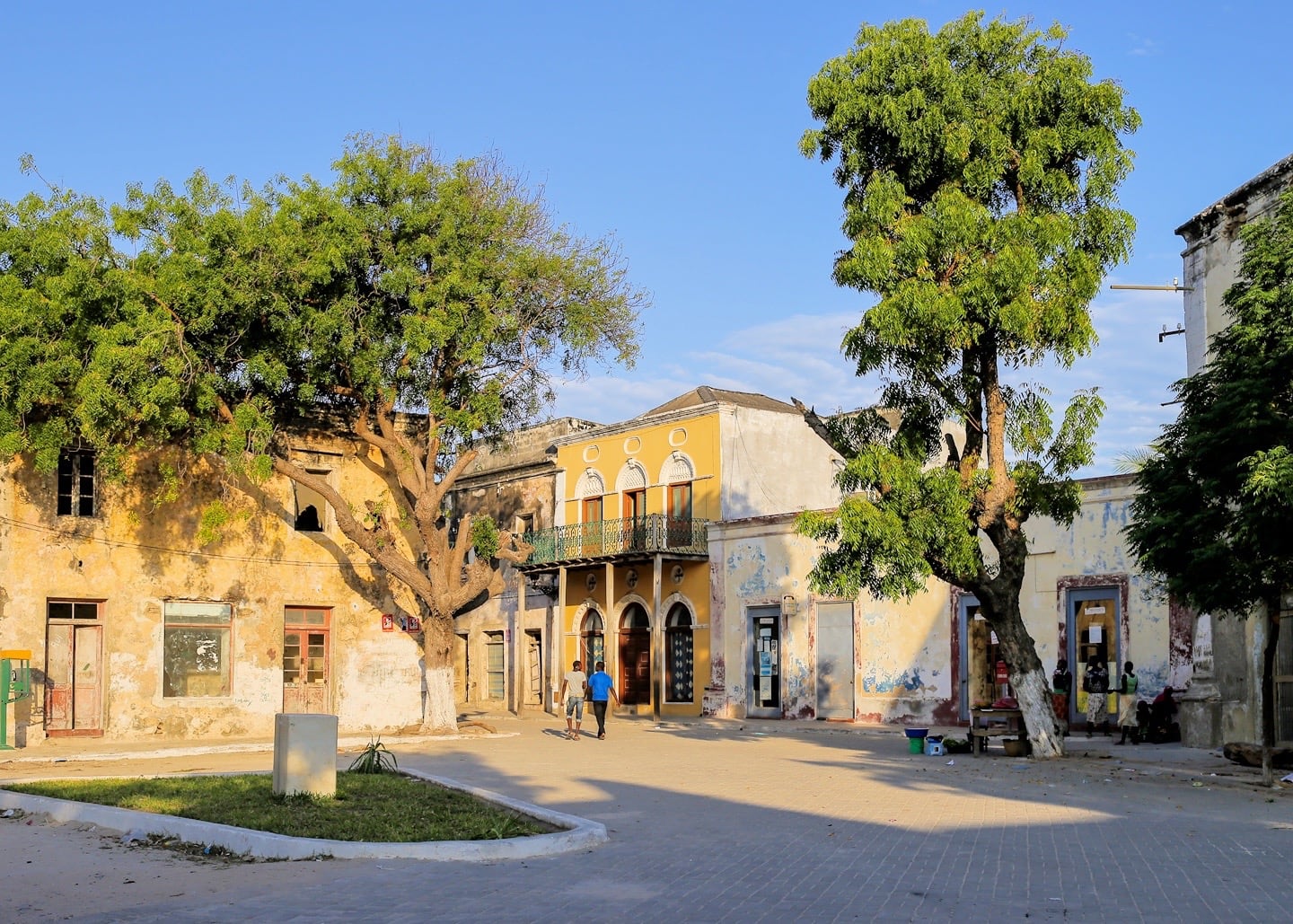
As with the rest of Mozambique, the Island of Mozambique is not a budget travelers paradise. There are few reliable bets centrally located on the island that would pass for cheap.
But that doesn’t mean there isn’t good value to be found on Ilha!
Our carefully selected top picks below represent some of the best value for the money found anywhere in the country.
We’ve stayed in hundreds of hostels, hotels, guesthouses, homestays, and apartments over the years across the globe and have our selection process down to a science.
Below, we’ve taken what we learned from a month of independent travel up the length of Mozambique (on top of having lived here for two years!) and combined it with all-new hotel research for this year .
All of our top picks are top-rated , centrally-located , and are considered budget to midrange accommodation in Mozambique. They also exude some sense of place and/or local charm because we like that.
Bottom line: if we were planning our trip to Ilha de Mocambique RIGHT NOW, we’d book one of these four places.
Our Top Picks for Lodging on Mozambique Island
Our Top Pick! Feitoria Boutique Hotel is an exceptional beachfront stay in the heart of Stone Town, boasting a private beach area, outdoor swimming pool, sun deck, and exquisitely decorated AC rooms. If you’re looking for upmarket accommodation in Ilha de Mocambique with all the comforts and amenities, Feitoria Boutique is your ticket (from US$112/night).
Top Budget Choice If you’re looking for centrally-located UNESCO charm on a budget, look no further than Cafe Central . Includes breakfast, air conditioning, en suite bathrooms, and pool! If street noise bothers you, be sure to ask for a quiet room, as some rooms are quieter than others (from US$49/night).
Heart of Stone Town Sunset Dream B&B is another great budget to midrange choice in the heart of Stone Town. Old world charm and stunning rooftop views! Dorm beds and sea-view fan rooms with shared bathroom for budget travelers. En suite rooms with aircon for a bit more. Includes breakfast.
Top Mid-Range Choice Jardim dos Aloes Boutique B&B is a bit more upmarket than the previous offerings. But expect a lot more amenities and value for your money at this place. Balconies, air con, and en suite bathrooms with an exceptional breakfast included (from US$103/night).
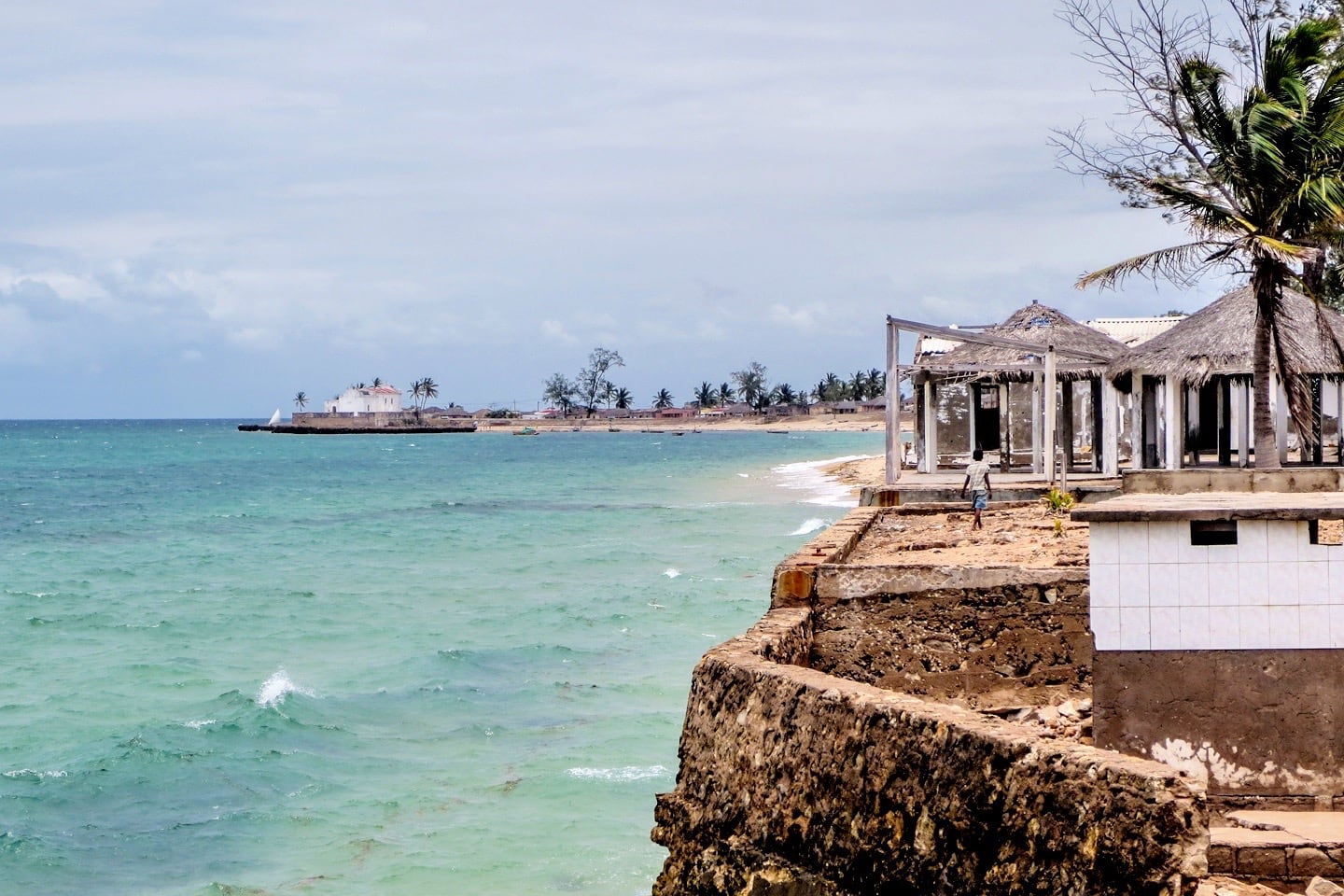
Having UNESCO status means there are no shortage of historic (if dilapidated in many cases) structures across the island.
While these structures make up the majority of places to visit on Mozambique Island for visitors, there’s so much more to the island! Here’s a list of our favorites.
The 3km-long island is divided into two main parts: Stone Town (the old, and largely uninhabited, colonial quarter) and Makuti Town (the very-much lived in former laborers’ and freed-slaves’ section, now home to 14,000 people).
Unlike previously mentioned Lamu or Zanzibar, Ilha’s Stone Town is quiet and sleepy, save for Sunday mass and student traffic between Makuti Town and the large Secondary School near the 15th century fortress.
Top Sights in Stone Town
Ilha has a handful of historical sites that are very much worth your time. All of these (with the exception of the off-island Ilha-Fortim de São Lourenço) are located in Stone Town.
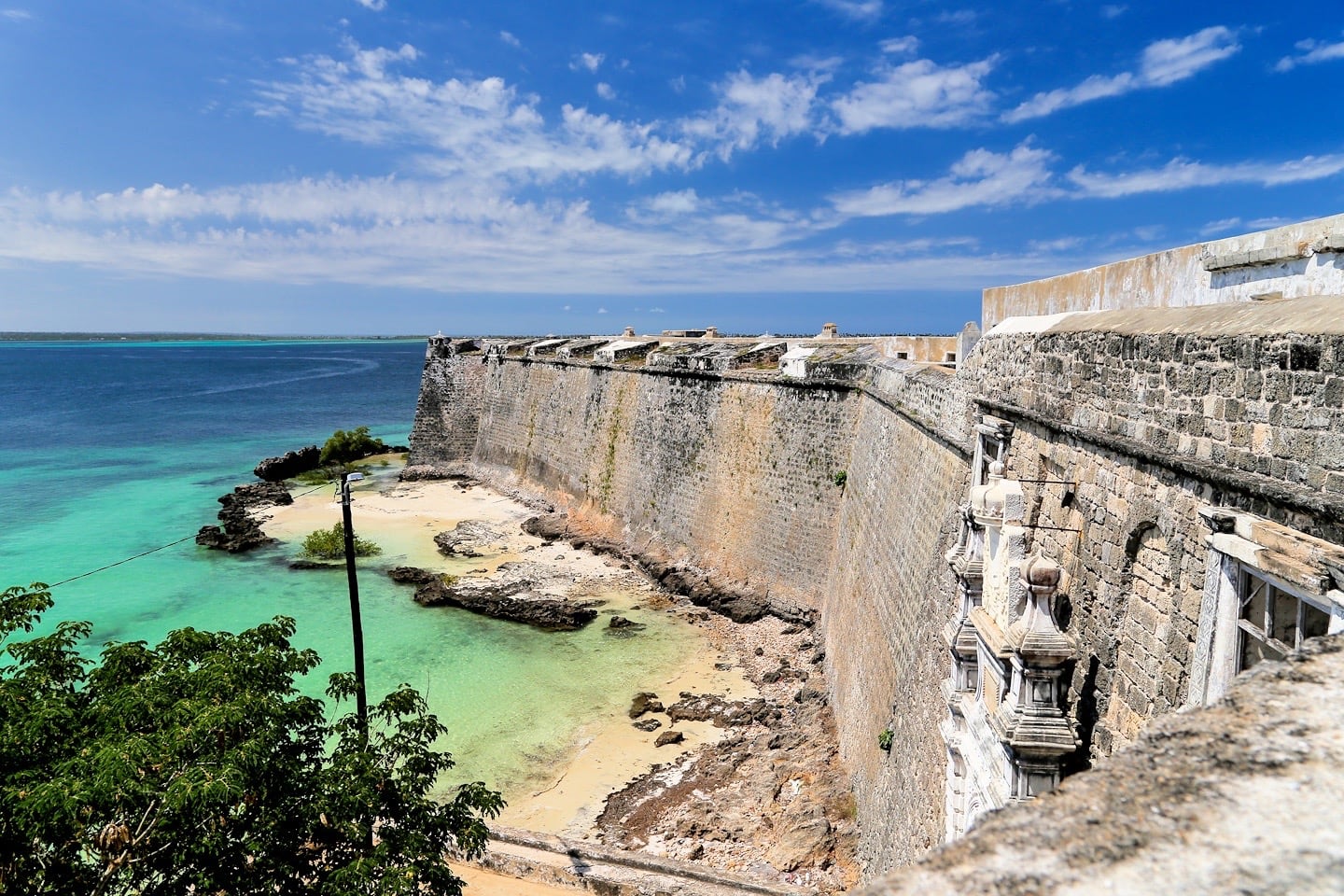
Of the historical sites of Ilha de Mocambique, Fortaleza de São Sebastião is perhaps the most impressive. This 15th century Portuguese installation is as enigmatic as it is old, and chances are, you’ll have the vast complex all to yourself!
In addition to being the oldest surviving fortress in Sub-Saharan Africa, it is also home to the oldest surviving European structure in the entire southern hemisphere— Chapel of Nossa Senhora de Baluarte (Our Lady of the Stronghold chapel).
Plus, the views from the ramparts are some of the most stunning to be found anywhere on the island!
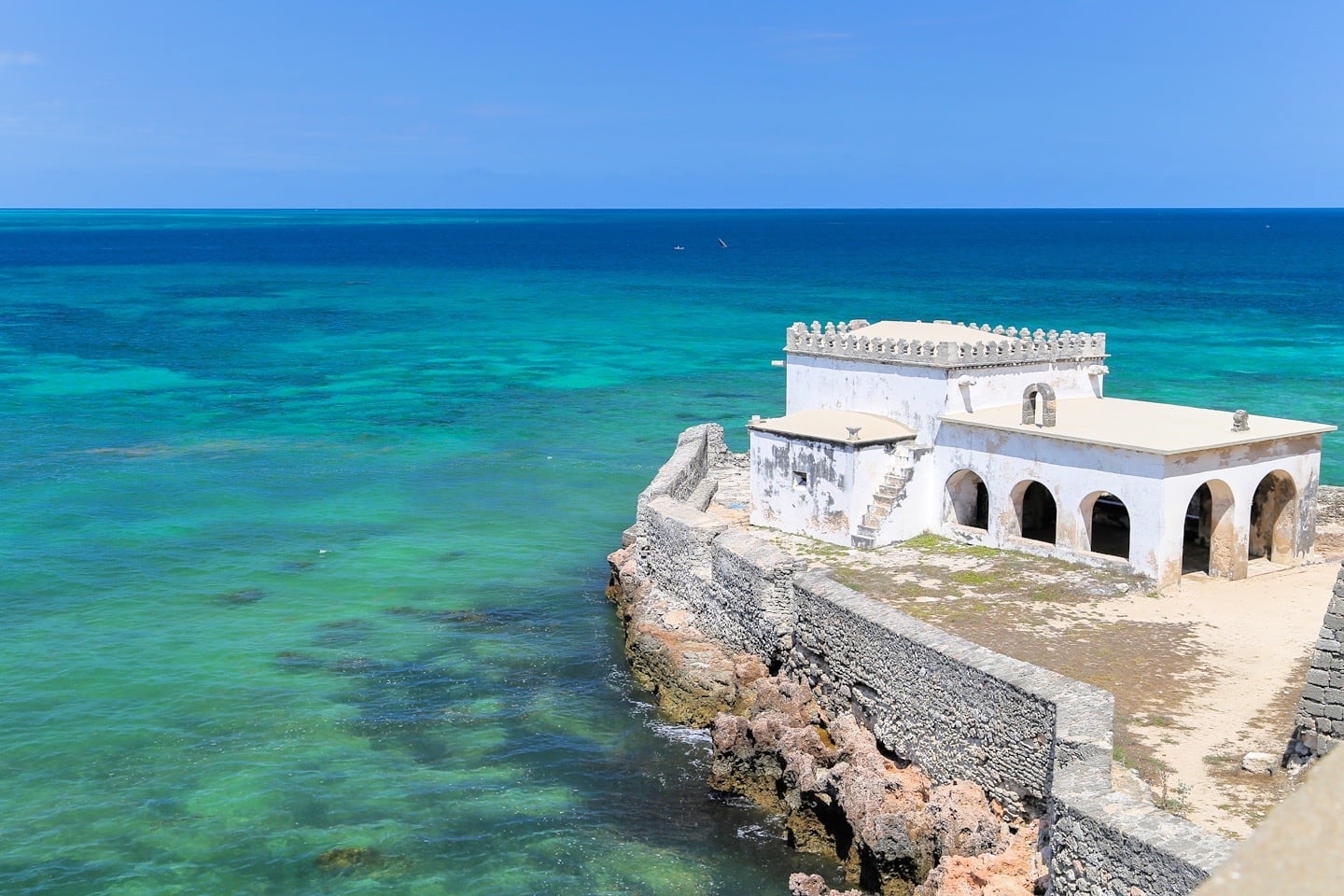
Next up, we have one of my personal favorites, the city’s former Governor’s Residence , which now serves as the island’s hospital . The peeling plaster and hacked trees out front gave it a haunting aura that both terrified and fascinated me every time we passed the place.
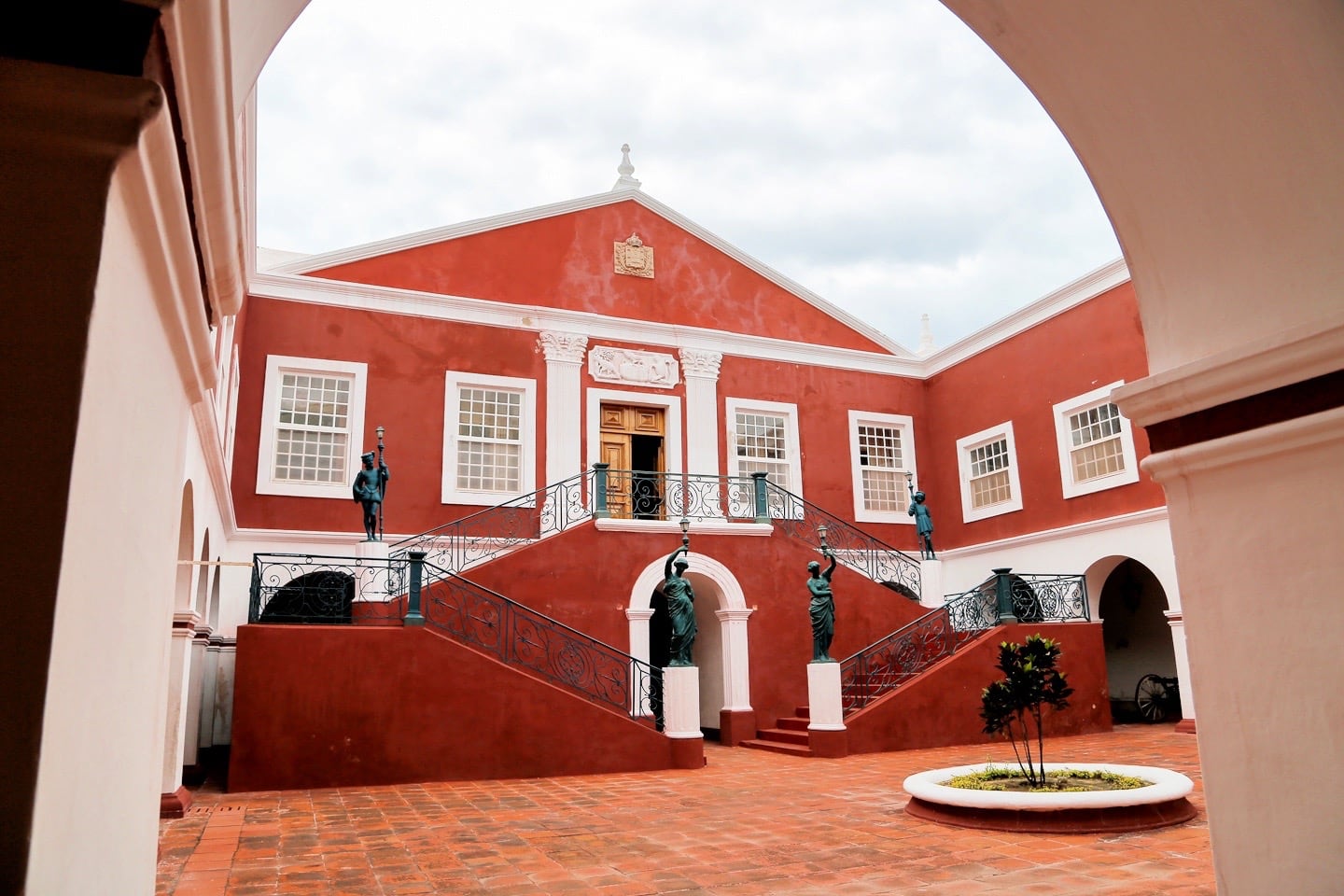
The Museu da Ilha de Mocambique (Museum of Mozambique Island) is a good place to start your self-guided tour of the city.
The former Palace of São Paulo also happened to be one of the more freshly restored of the town’s historic structures when we visited.
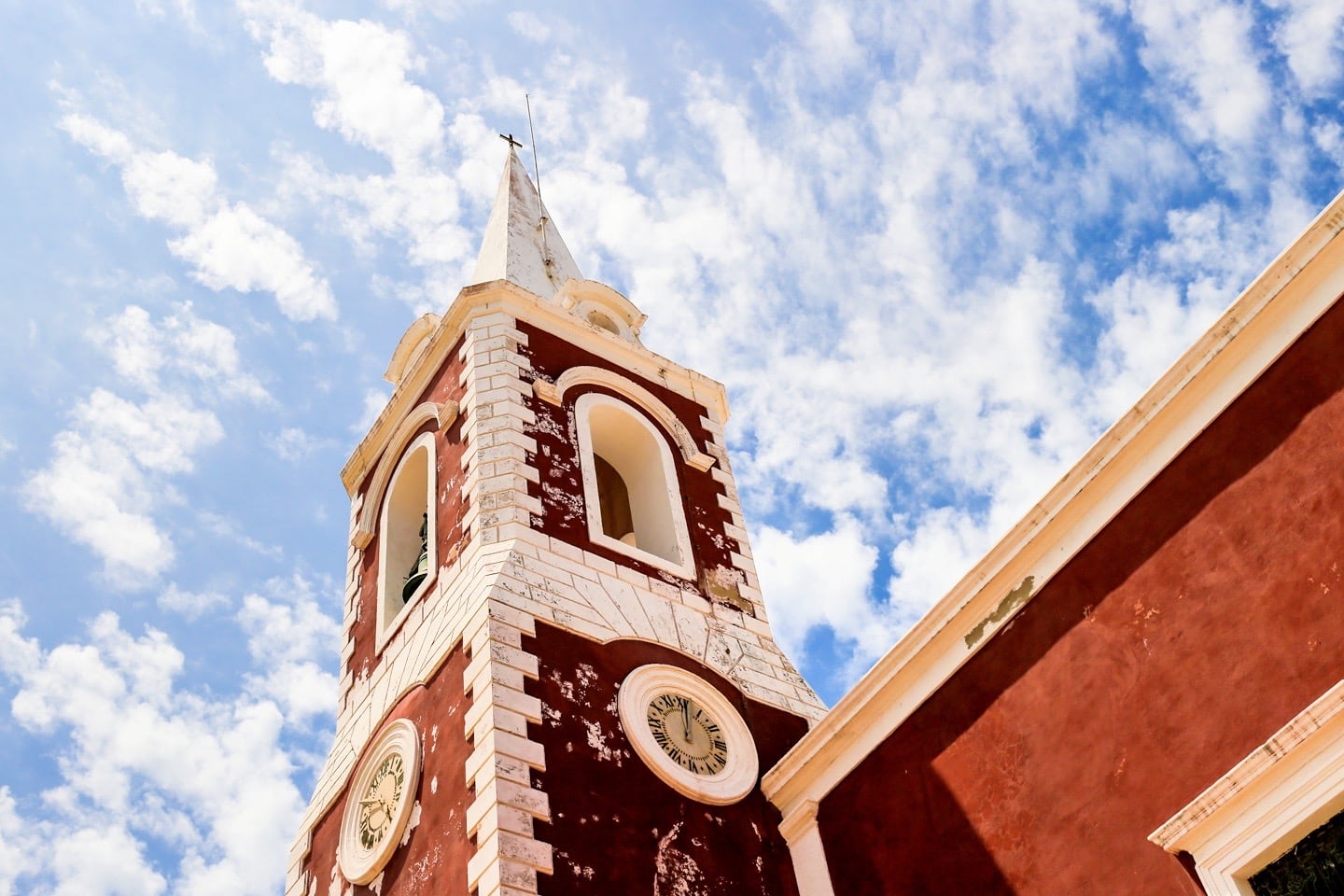
The Misericordia Church is also worth a stop, particularly if you happen to be visiting during Sunday morning mass.
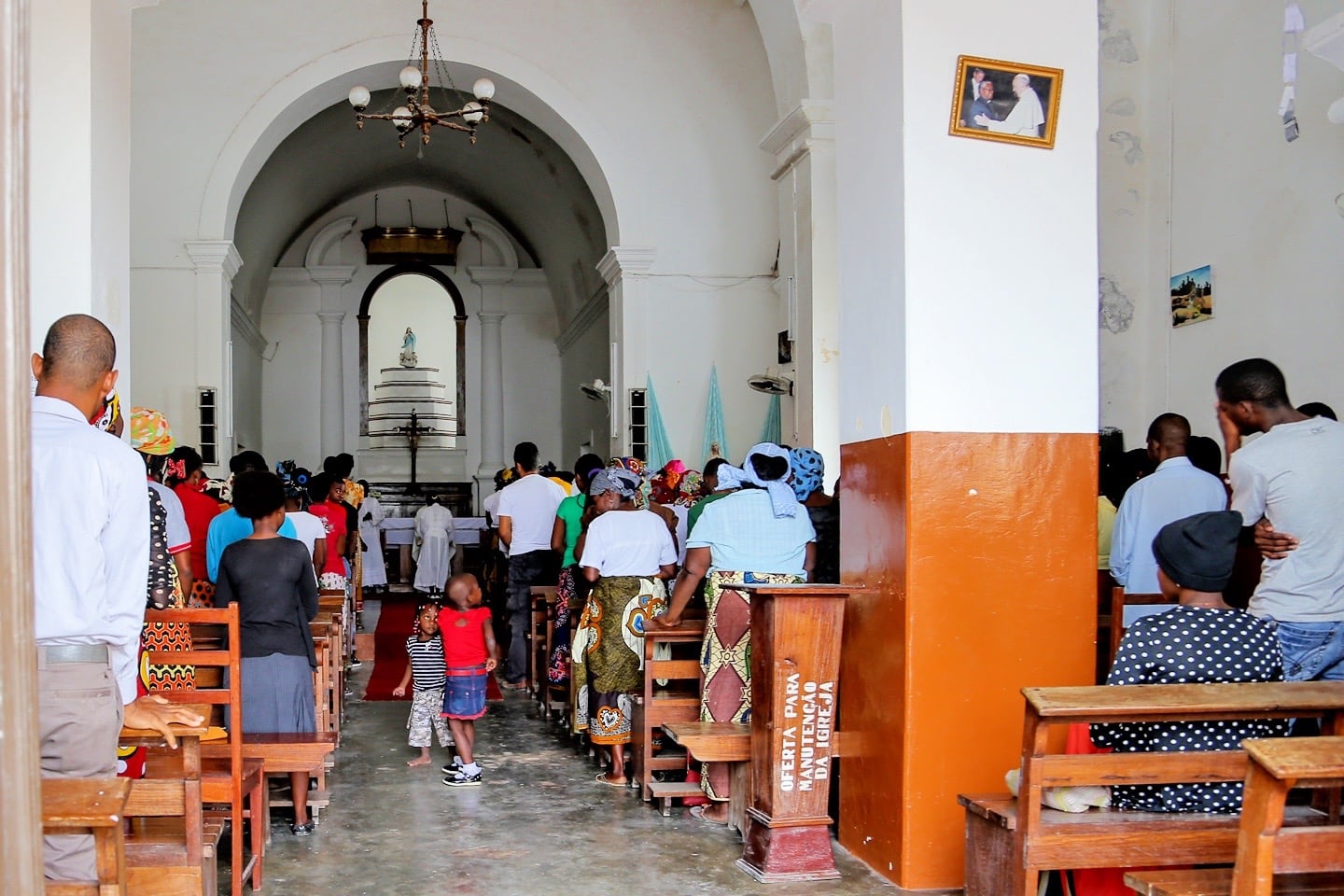
While the above historic sites offer a glimpse into the island’s colonial heritage, a stroll through the winding alleyways of today’s Ilha is just as worthwhile, if not more so.
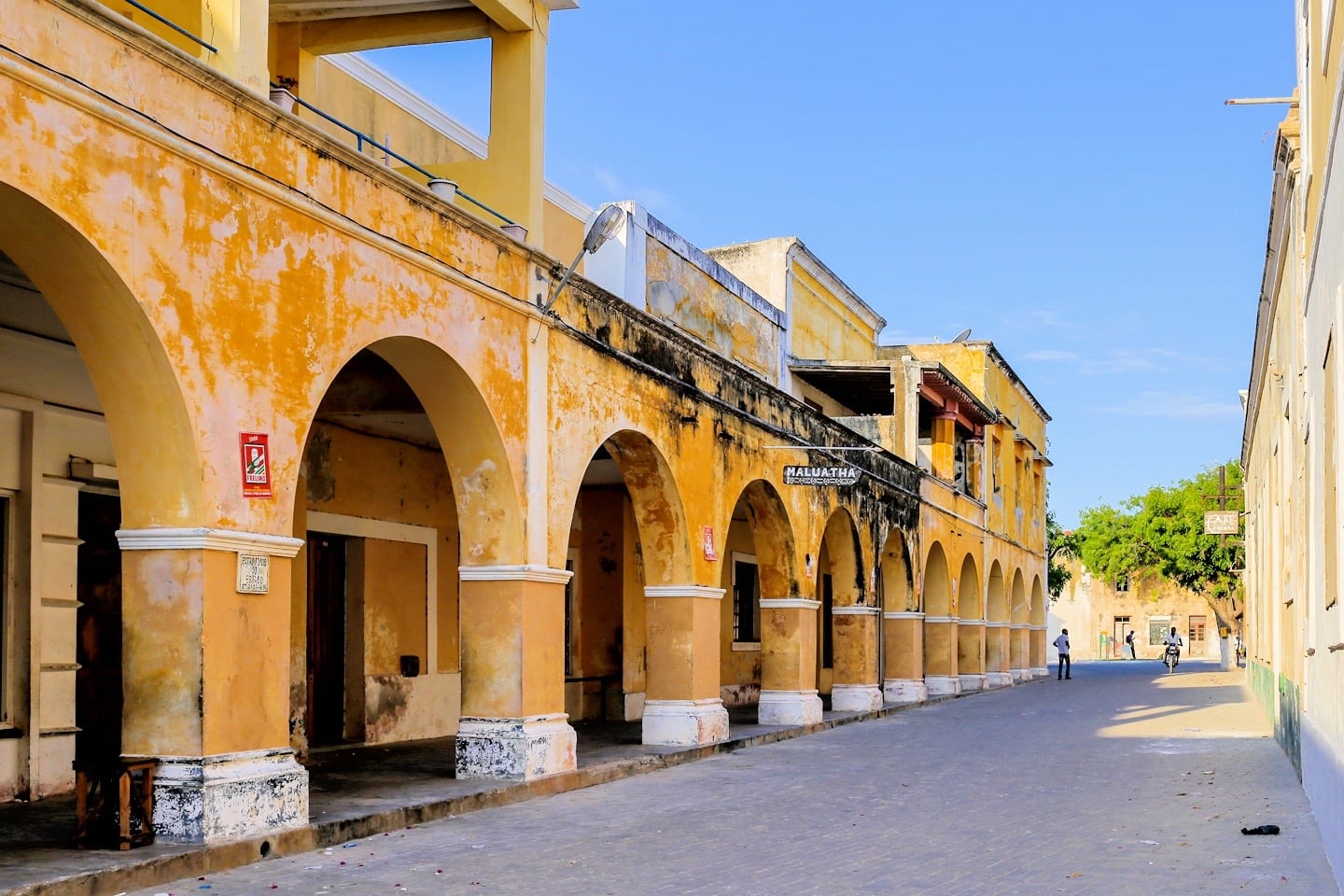
Places to Visit Elsewhere on Ilha de Mocambique
The concentration of historic buildings in Stone Town makes for a fascinating, if somewhat short, journey back in time. But there’s much more island to be explored outside of Stone Town, and many fascinating discoveries to be had.
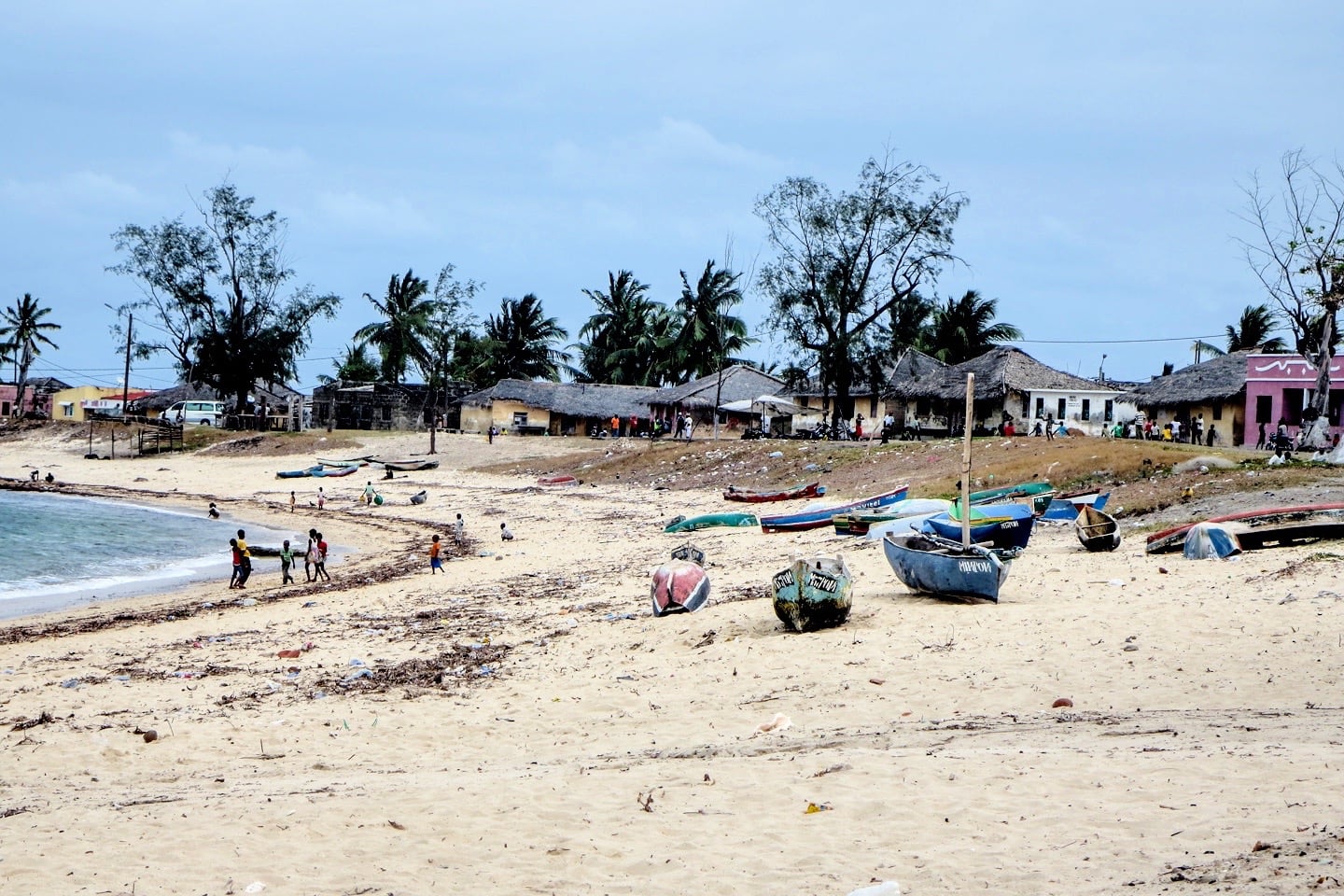
Makuti Town contrasts starkly with the old colonial Stone Town, not only in the materials used to construct the dwellings (stone and thatch), but also in its layout.
Makuti Town is the vibrant heart of the island where most of the town’s residents call home. This section of the island is much more dense than Stone Town and also sits about 8-10 ft. below street level, making life even more challenging for residents in the rainy season.
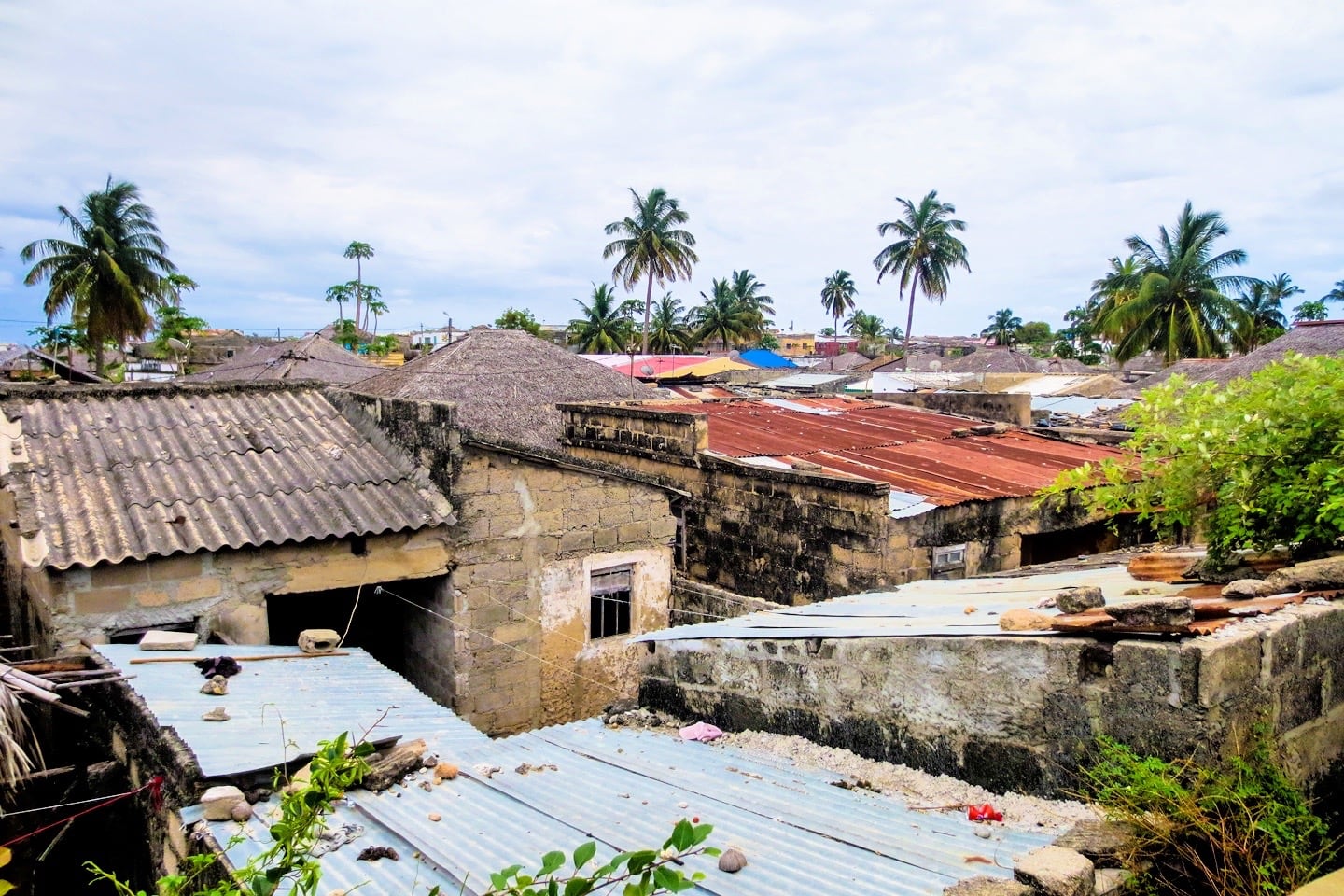
The Fortim-Igreja de Santo António (Fort-Church of St. Anthony) dominates a small palm-fringed peninsula, making for a focal center-piece of the island’s shores.
In the evening, residents spill out from Makuti Town onto this beach to do everything from collecting seaweed to fishing, playing to burning refuse.
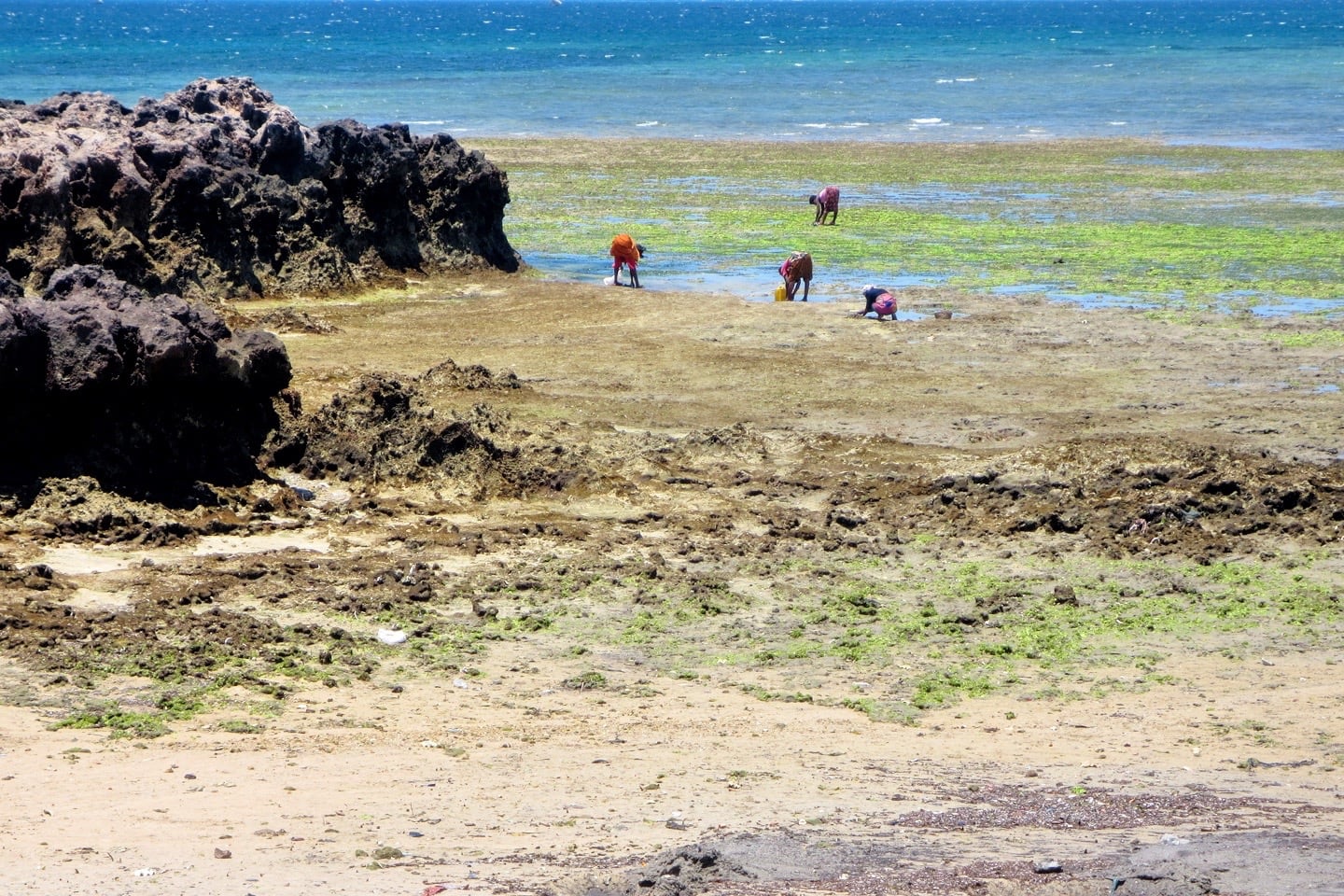
Perched on the shores of the island, these gates stand as a sober reminder of Mozambique’s dark past. Over the course of a few hundred years, nearly a million Mozambicans passed through these gates on their way to enslavement in the Americas. This was the last view these people saw before stepping off their homeland for the final time.
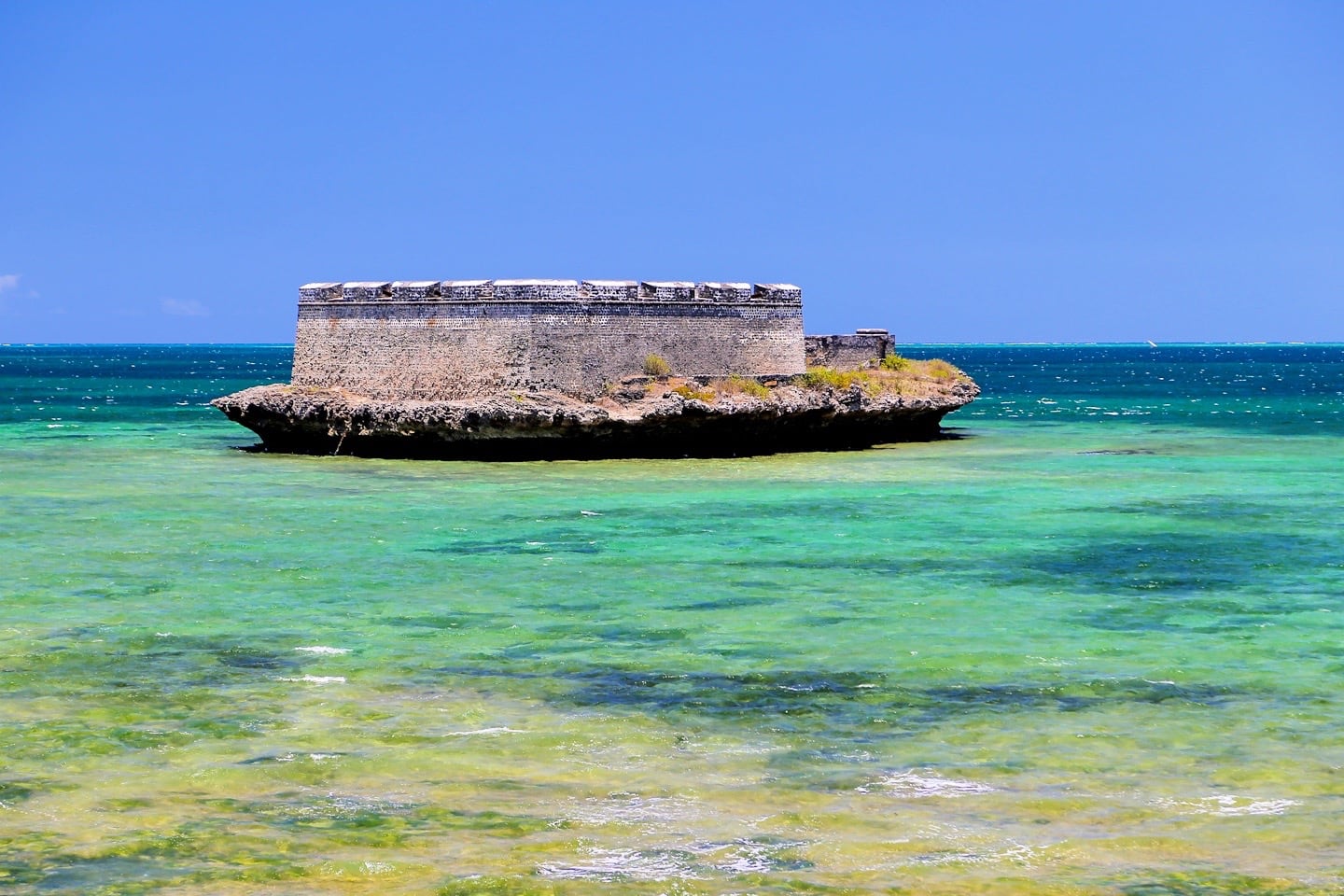
Tiny Ilha-Fortim de São Lourenço makes for a unique adventure at low tide. But be careful to watch the tides as it’s easy to get stranded.
Ilha-Fortim makes for a good snorkel site as well.
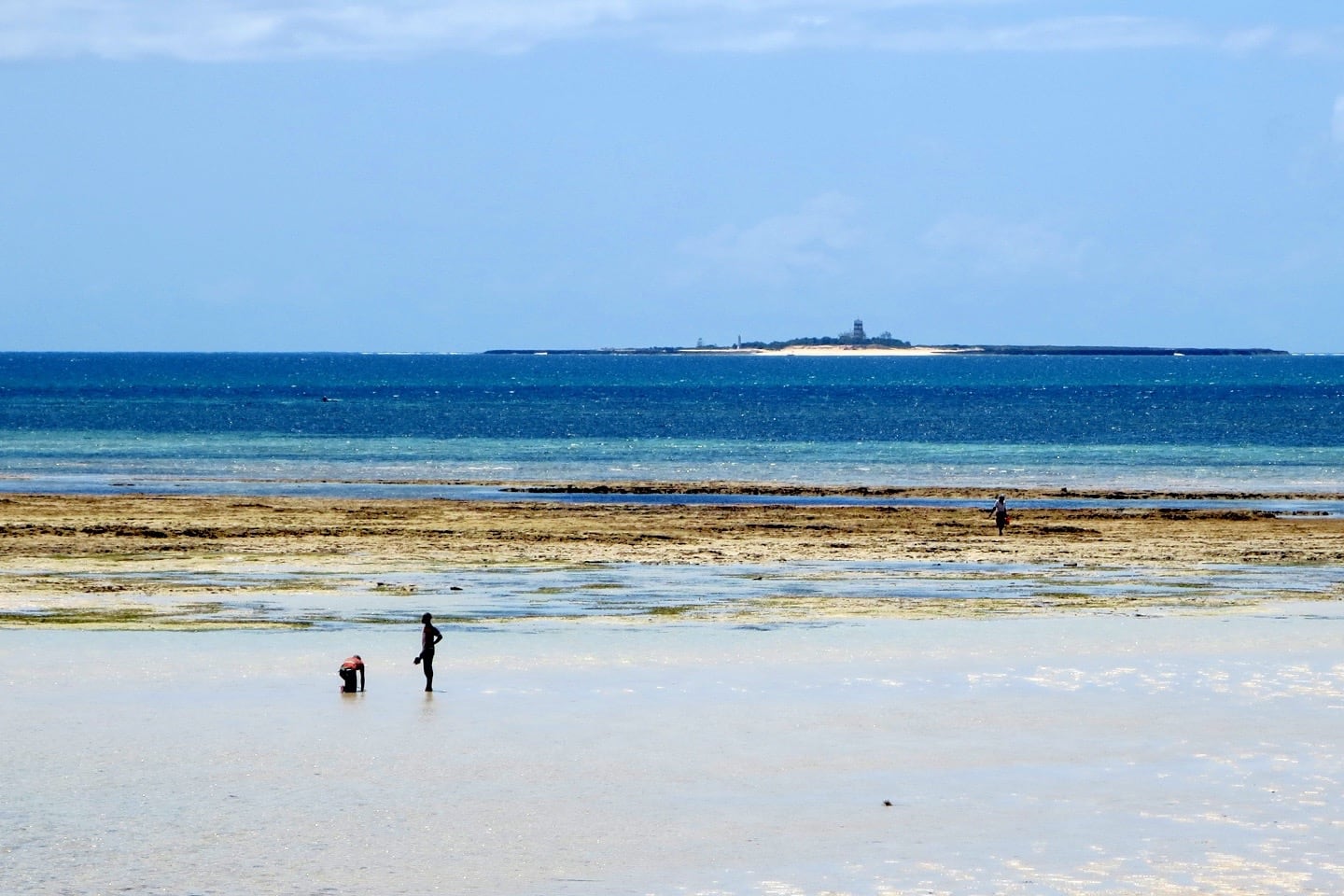
Swimming, Snorkeling & Dhow Trips
The water around the island is crystal clear, awash in a million shades of blue. In most cases, however, Ilha’s waters are not really suitable for swimming right from the shore (certainly not on the eastern/windward side), as the entire town’s waste eventually makes its way to the seashore in some form or another.
Remember, this isn’t some tiny fishing village, but a town of 14,000 people concentrated on an island 3km long by 200-500m wide. Several of the town’s beaches are strewn with trash, sewage, and everything in between (like dirty diapers).
So if you do go swimming or snorkeling , it’s advisable to take a kayak or dhow and go out far or visit one of the beaches on the nearby mainland. Dhow trips and kayaks can be arranged at a handful of tour operators in Stone Town.
RECOMMENDED TOURS ▸ For dhow trips and snorkeling tours, check out top-rated Isla Blue Island Safaris .
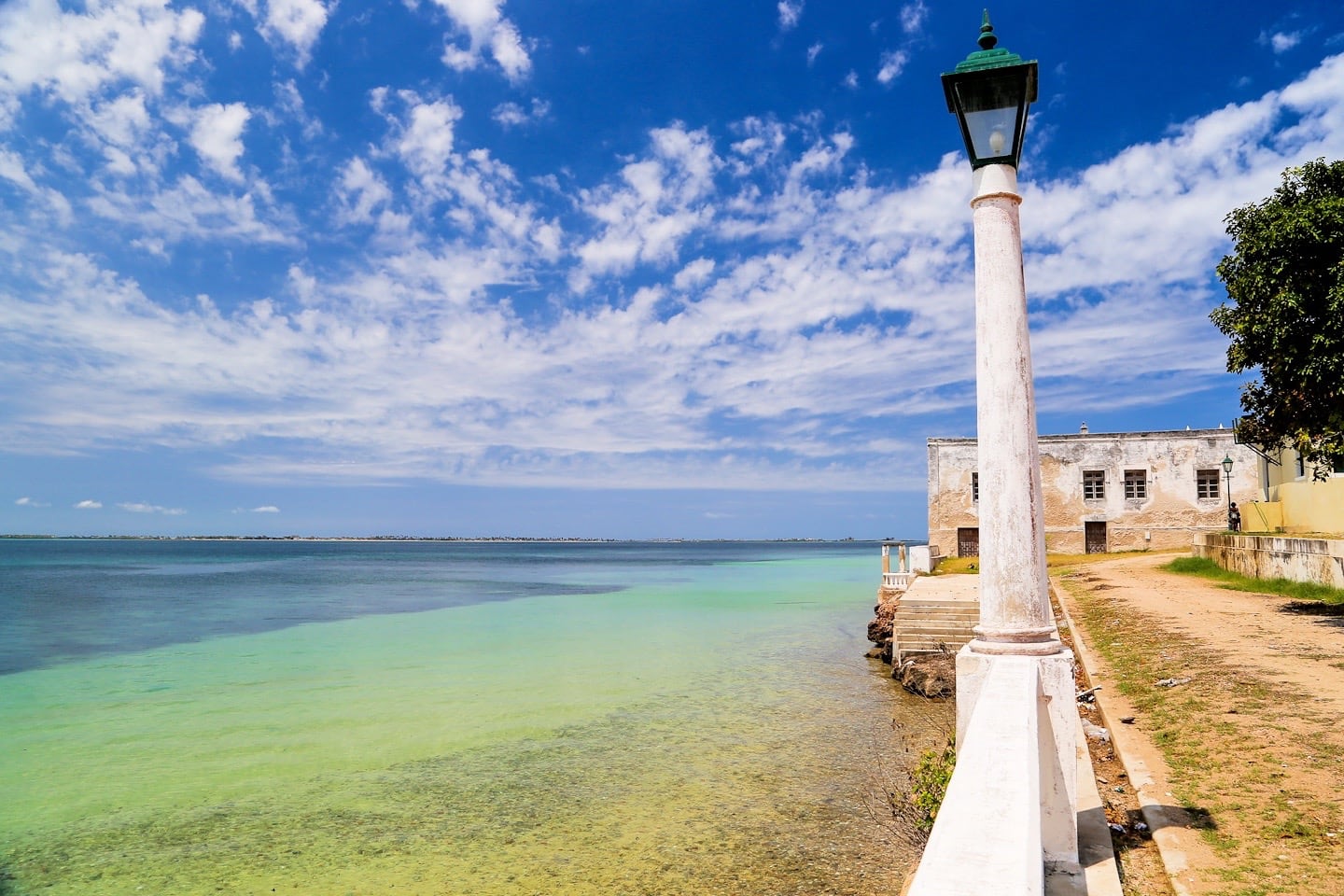
There aren’t yet a ton of eateries geared towards international travelers, but there are certainly enough!
Rickshaws Pousada e Cafe is a longtime local favorite with tasty local fare that’s not to be missed.
For a sea view and fresh seafood, head to the northeast corner of the island where you’ll find Restaurante e Bar Saquina .
For more sea views and a tropical garden vibe, check out Reliquias (pictured above). A fairly reliable bet for local cuisine, Reliquias is particularly atmospheric after dark.
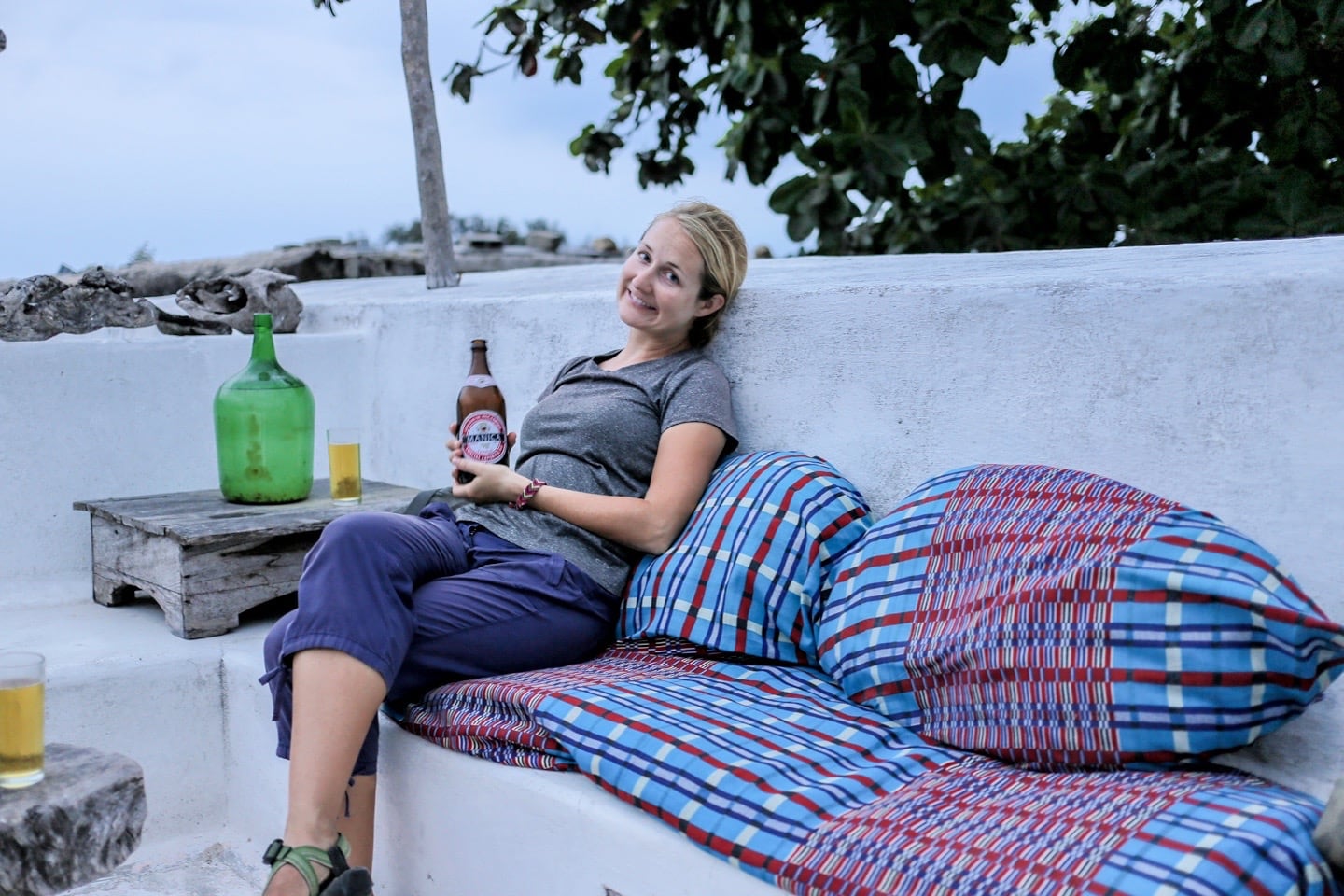
Our favorite sunset activity was getting a beer at O Pontão (the Pier) and watching the sun sink over the bay—beautiful sunsets every night we were there.
After sunset, the island and surroundings get very dark on moonless nights and the end of the pier is perhaps the best place on the island to stargaze.
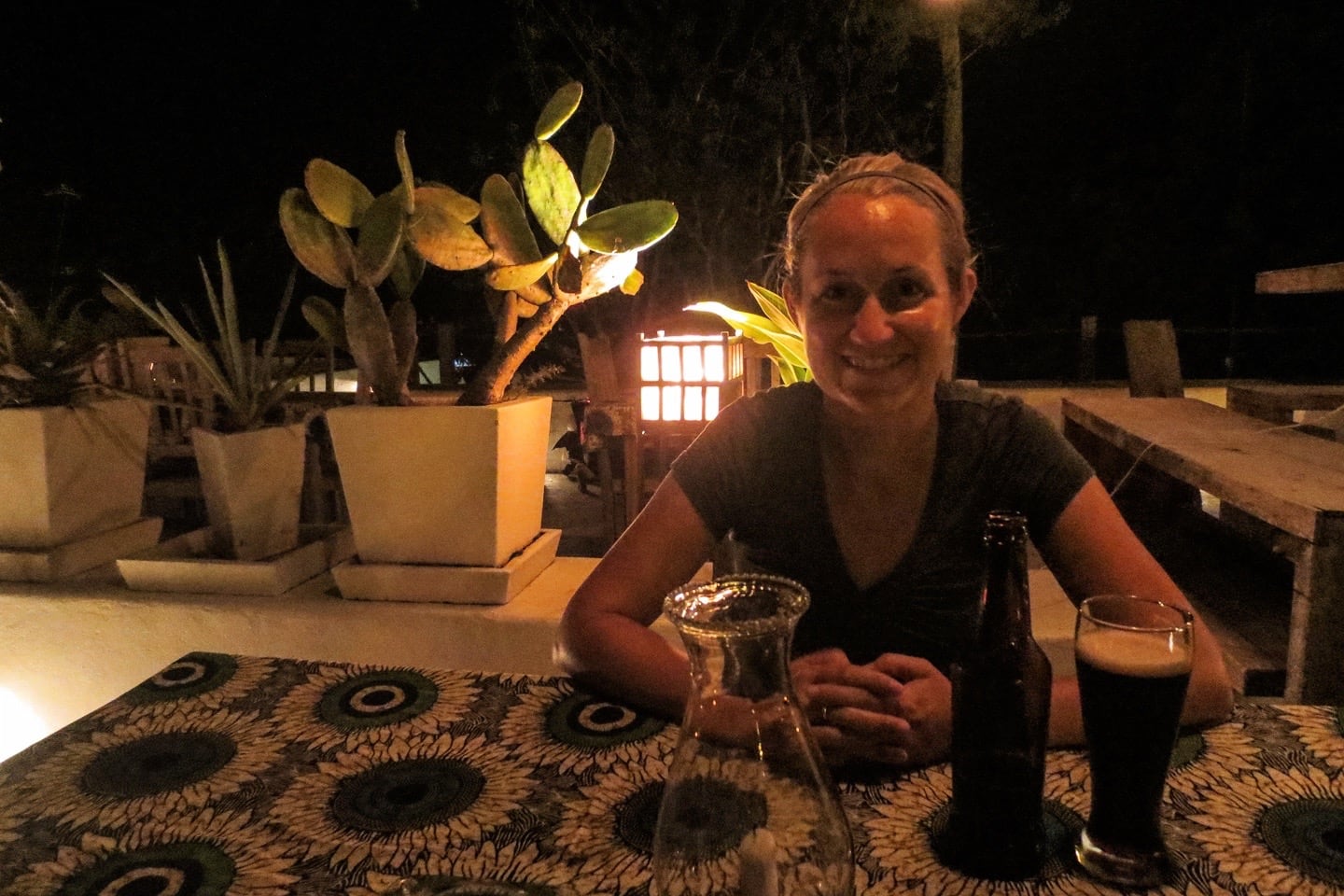
Finally, it took us three days to discover Flor de Rosa Rooftop terrace (read: three days for the restaurant to actually be open!)—but this is a wonderful place to have a sundowner or grab a really delicious meal.
It’s a bit pricey (and when I say pricey, I mean even pricier than usual in Mozambique, which is pretty darn pricey by East Africa standards). But starters can be had for under US$7 and are a nice departure from the usual.
But be warned! The dinner crowd on the rooftop threw us for a loop after not seeing many Western travelers for a while. Not necessarily a bad thing, just an unexpected surprise.
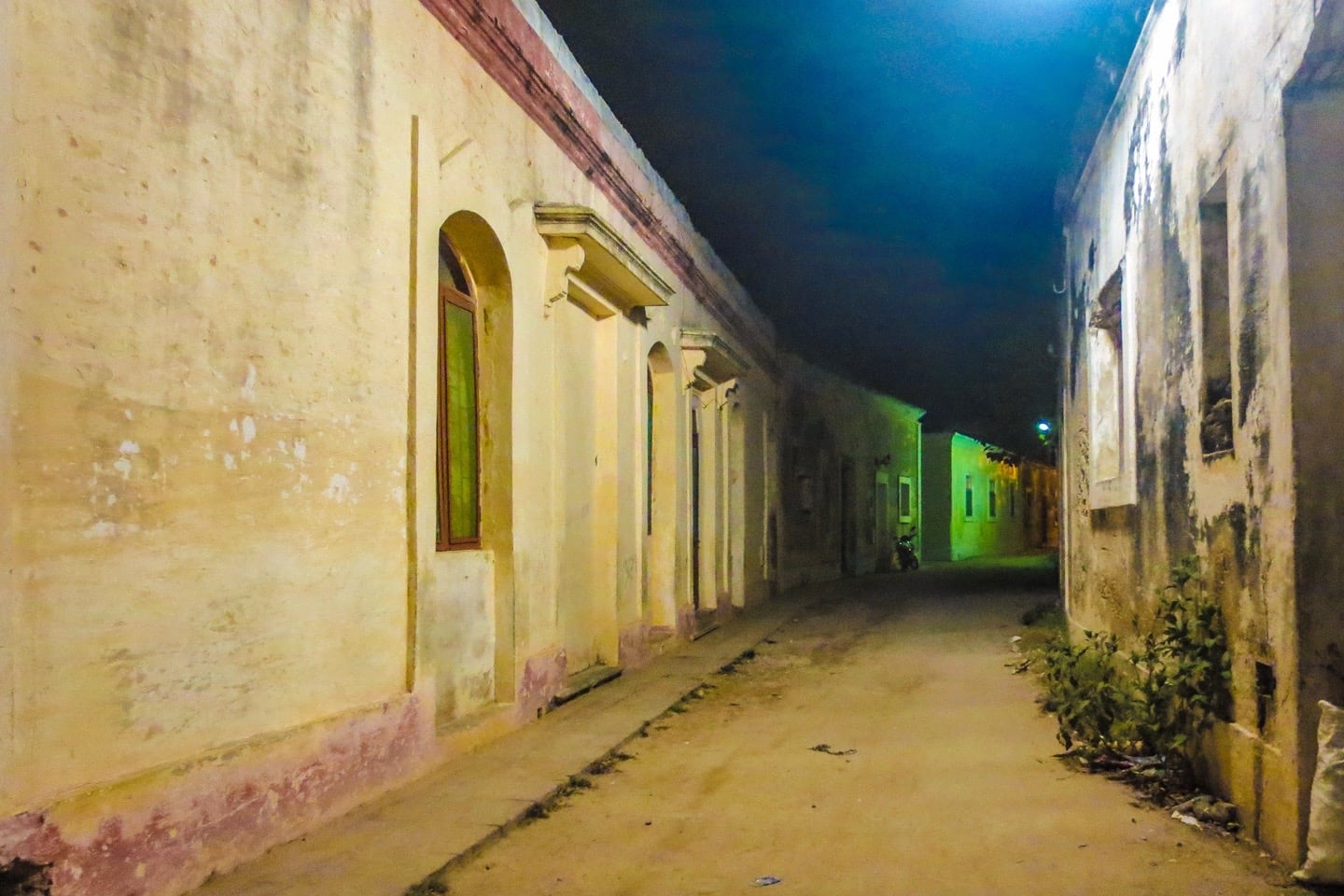
First off, make sure you stay well protected from the sun. The sun gets more brutal the farther north from Maputo you travel! A biodegradable sunscreen is always a good idea, along with an SPF-rated rash guard for swimming and doing other water sports. And a wide-brim sun hat comes in handy for just about all your island explorations.
Mozambique has distinct wet and dry seasons. If you find yourself here between October and March, you’ll want to pack a lightweight, breathable rain jacket .
Plan to do a lot of walking around the island. Pack a good pair of hiking shoes or sandals (sandals are more practical in the rainy season).
And remember to bring your reusable water bottle ! Most restaurants don’t provide drinking water free of charge, and you’ll want to stay well-hydrated in the hot and tropical climate.
Lastly, it probably goes without saying, but you’ll want to bring along a good camera to capture this once-in-a-lifetime experience.
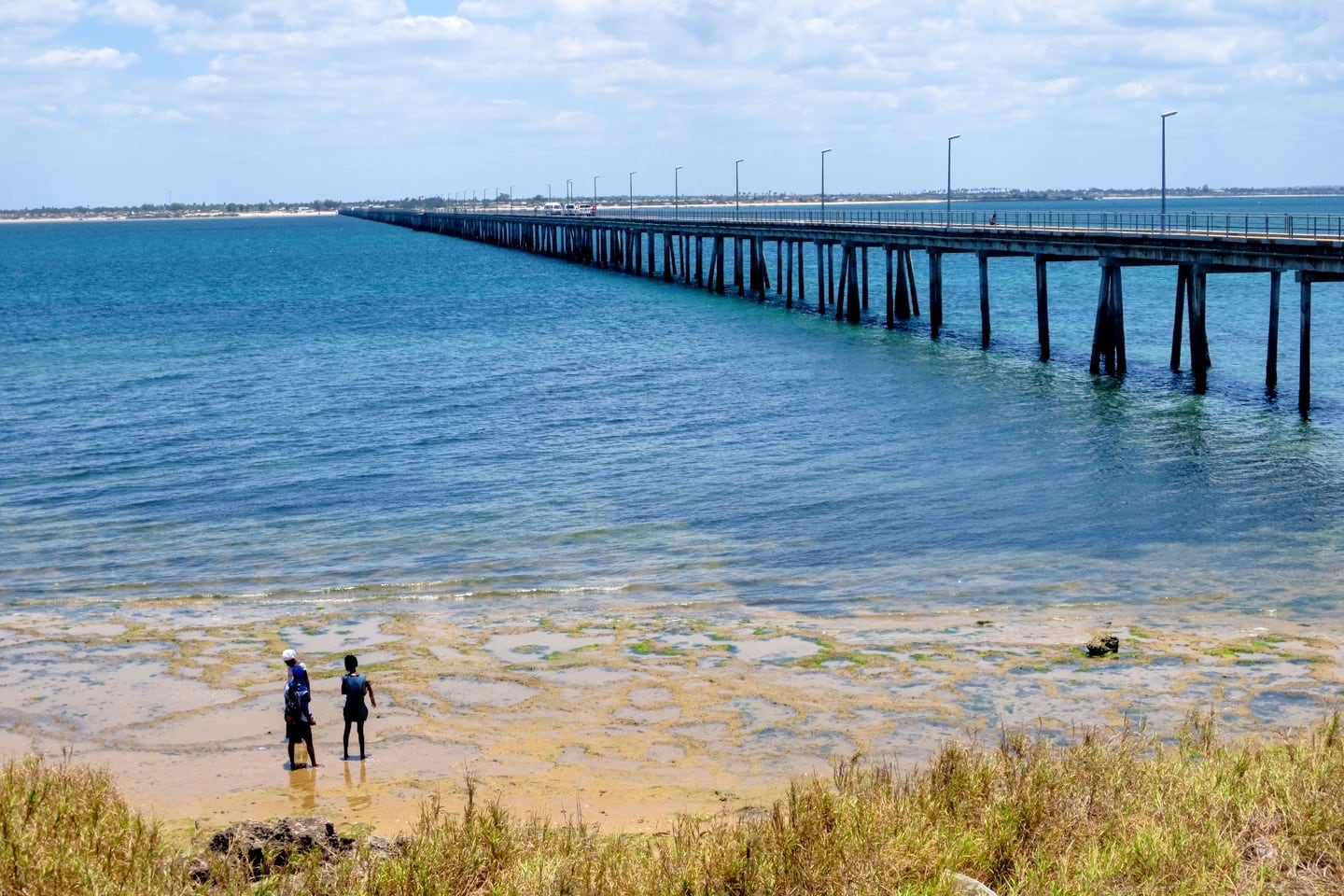
As previously mentioned, Ilha is not easy to reach. You can’t simply fly to the island or take a tourist shuttle from the nearest major city.
You could arrange a chartered flight into Lumbo airstrip on the mainland opposite Ilha for a pretty penny. But let’s be honest, if you’ve got that kind of money to devote to Mozambique travel, you probably aren’t reading this guide.
With the following transport advice, keep in mind that Mozambique is one huge country with a coastline twice that of California’s (and a road infrastructure that tends to be one of the worst in the region).
If you have the time, I highly recommend exploring the length of this amazing country by land.
But do keep in mind, you’ll be in for half a dozen or more very long days on local buses (and very long days on chapas (Mozambican collective minibuses) for those who aren’t as lucky to snag a big bus).
If you’re visiting Mozambique and short on time, you can cut a great deal of time off your journey to Ilha de Mocambique by flying from Maputo to Nampula , then getting overland transport the rest of the way.
Alternatively, you can fly into Nacala and make your way overland to Ilha, but when we did the journey, the consensus was that the easier route was from Nampula. If you’ve done this route recently, please let us know if this is no longer the case!
By Bus/Minibus
As with travel in most developing countries, transport options are always in flux, which means there may be more or even fewer options in the future depending on a variety of factors.
Our experience has been that there are a variety of large coach-style buses that can get you from Maputo and Pemba, and major points in between. However, smaller minibuses will likely be the primary mode of transport between Nampula/Nacala and Ilha de Mocambique .
Minibuses to Ilha de Mocambique leave from Ave de Trabhadores next to the Nampula Railway Station .
Insider Tip
Ask for the larger “Tanzaniano chapas” (as opposed to the cramped and uncomfortable regular chapas). The Tanzanianos look more like a small bus than a minivan). Confirm that the minibus is going all the way to Ilha de Mocambique and not terminating somewhere in between.
We snagged seats on a Tanzaniano from Nampula station at a little after 9am, the bus left full at about 10:30am and we arrived at the bridge connecting Mozambique Island with the mainland a little after 1:30pm (about 3 hour travel time).
At the Ilha bridge, you are required to get off the chapa and into a shuttle which will either simply ferry you across the one-lane bridge, or continue on into town.
We stayed at Ruby Backpackers in Nampula and found them incredibly helpful with getting the latest information on options and travel times to Mozambique Island. They can also arrange private transport , which is particularly helpful if you plan to travel to Mozambique Island at off times or are traveling with a group.
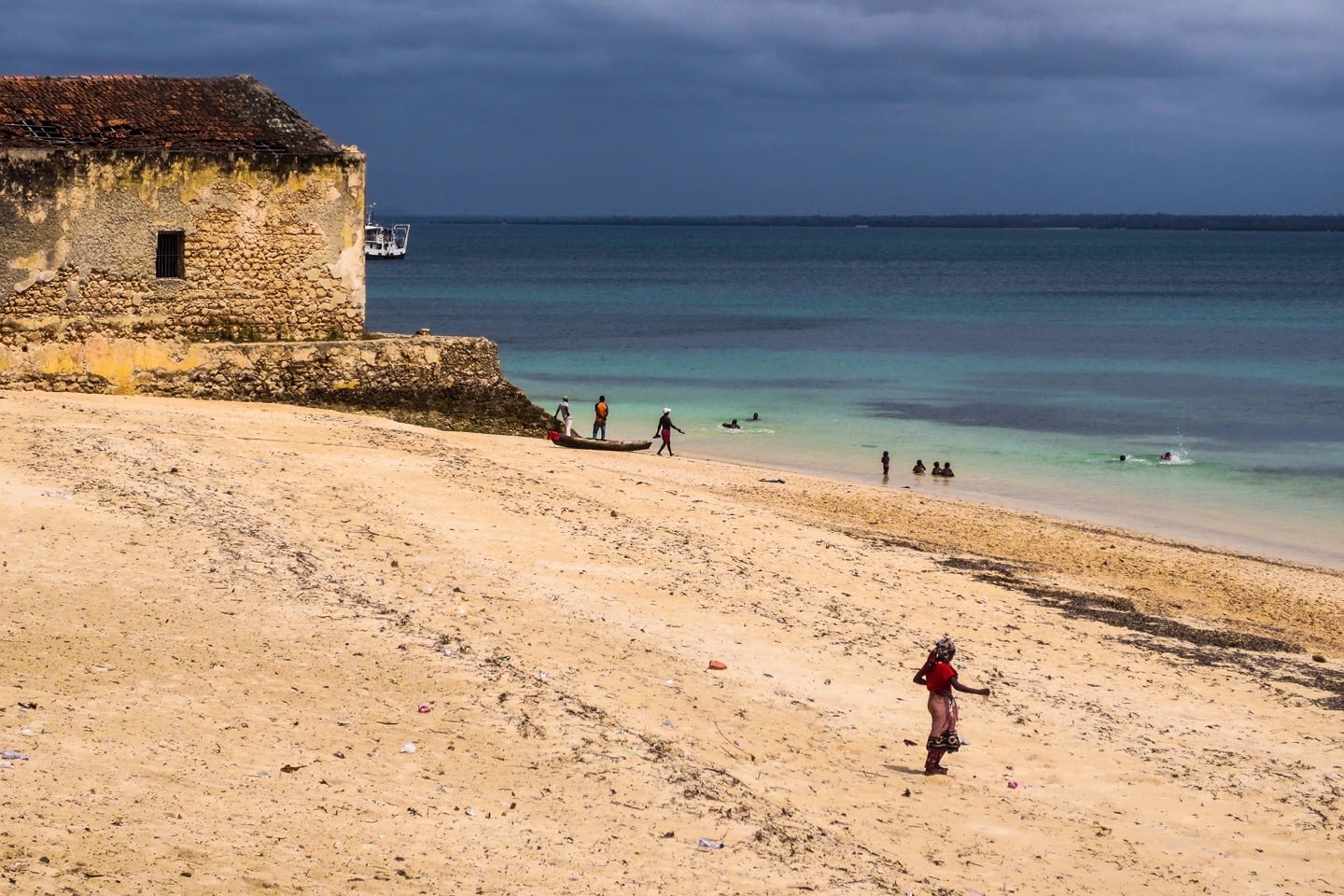
Despite the World Heritage Status and recent [modest] influx of tourism, Mozambique Island remains very poor with few public services.
It all makes for an interesting (and sometimes uncomfortable) juxtaposition—relatively affluent Western visitors and much less affluent residents crossing paths amongst starkly beautiful and decaying colonial buildings whose original occupants have long-vacated.
It really is like nowhere that Lori or I have ever been. We can try and draw comparisons but there really aren’t any.
The Island of Mozambique is an island frozen in time…sort of. More like left in time. Left by the Portuguese, but not by the native Mozambicans who still inhabit the island.
Certainly, the character of the island has changed over the past hundred years, but against a static backdrop of shops, mansions, fortresses, and churches.
The little tourism that Mozambique Island does receive hasn’t seemed to change it much, not in the way tourism and UNESCO funding has changed many other places. The island does not feel contrived in the way of Williamsburg, Virginia (USA) or spoilt like Venice, Italy.
It is what it is. And that’s more than enough for a worthwhile visit.
But is it enough to draw mass tourism? Probably not (not yet, at least), which has both its benefits and drawbacks.
If you visit Mozambique Island with the mindset that it’s not going to provide you with the comforts of other UNESCO sites but that it’s like no other place on Earth, then that’s a good place to start.
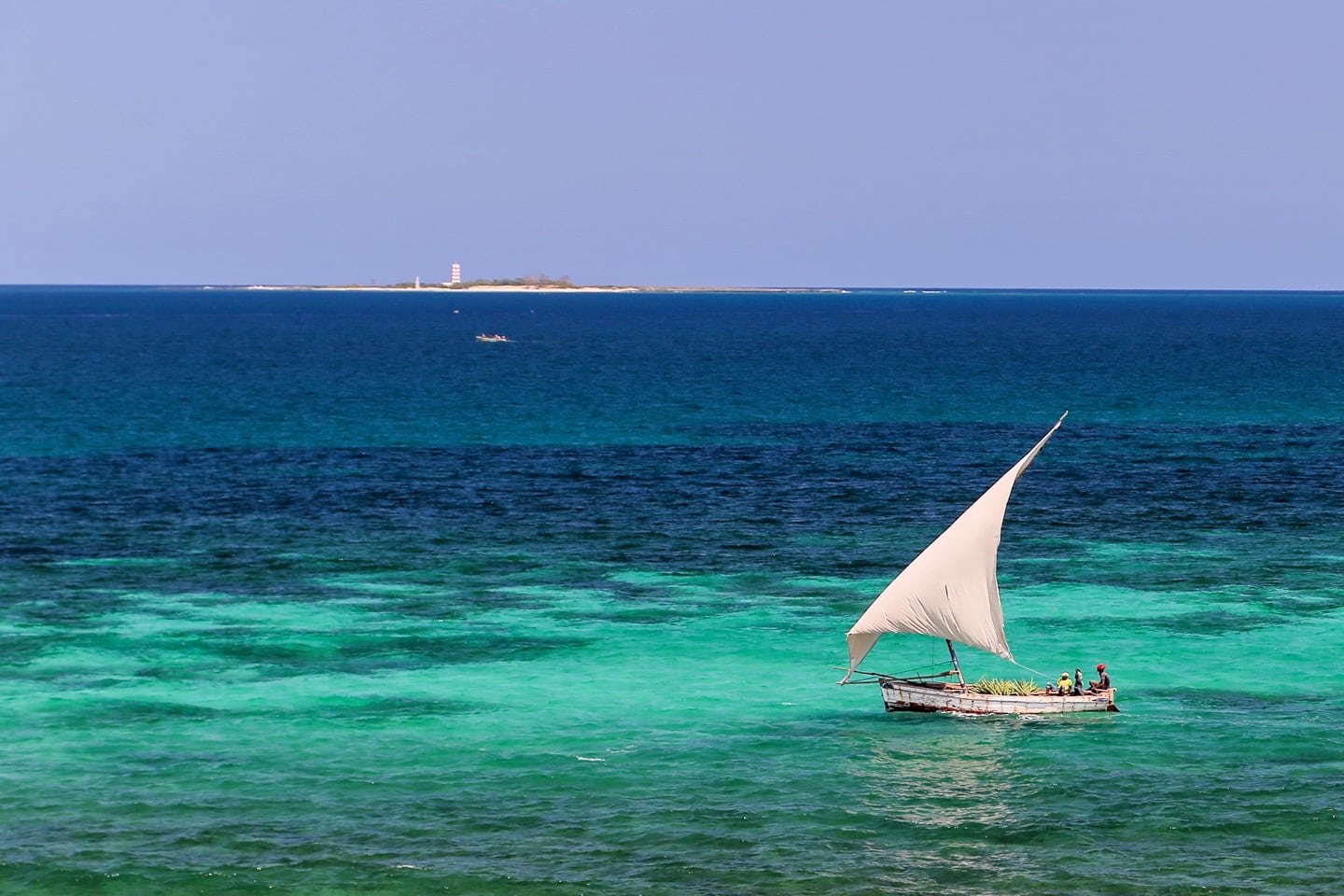
Check out some of our other helpful guides:
- KENYA BEACHES – 12 Best for Fun & Relaxation
- LAMU ISLAND, KENYA – 12 Captivating Reasons to Visit
- JAMBIANI BEACH – 8 Reasons to Visit Zanzibar’s Best Beach Hideaway
- SHELA VILLAGE – A Bohemian Beach Paradise on Lamu Island
Have You Visited Mozambique Island?
What was your experience like? Let us know in the comments below.
3 thoughts on “Mozambique Island: Things to Do + Travel Guide”
This is all brilliant advice, and I only wish I’d been told some of these things before I first travelled solo. Although you learn these things on the way it’s nice to be reminded,
Definitely bookmarking this post , It’s very helpful guide.. Thanks for sharing this 🙂
Thanks for your comment, Nour. Happy to hear that!
Leave a Comment Cancel reply

Home » Travel Guides » Mozambique » 15 Best Places to Visit in Mozambique
15 Best Places to Visit in Mozambique
Occupying a great bend of East Africa, where the tropical heart of the continent slowly becomes the temperate south of the continent, the vast nation of Mozambique certainly has its fair share of touristic draws. Along the coast you’ll find alabaster-white sands with a fringing of palm trees; you’ll spot curious manatee-like creatures in the company of blooming coral sponges in the warm Indian Ocean waters. And as the interior takes over – a patchwork of swaying savannah grasses and baobab forests – the habitats of the famous Rift Valley begin in earnest.
There, it’s all about the hopping gazelles and the elephants, the sculpted highlands of Zambezia, and the earthy tribal villages of the native folks. And who’s forgetting Mozambique’s enthralling capital? That Maputo is a pulse of life, beating with jazz and reggae and flavoured with just a taste of Portuguese charm. (After a lengthy civil war, hopes were high that the nation would stabilise and open for good, but recent upheavals have wobbled expectations – so be sure to check ahead for FCO warnings and the like.)
Lets explore the best places to visit in Mozambique :
1. Bazaruto Archipelago

There’s nothing quite like the Bazaruto Archipelago. A speckling of elongated isles in the Indian Ocean, they are a patchwork of shimmering, aquamarine seas and coral gardens, windblown sand dunes and ochre-hued coastal hills that come peppered with scrub and swaying coconut palm groves.
The largest island of the area (called, simply, just Bazaruto) is a place of open sandy bays patrolled by galumphing dugong, while the inland is carved through by karst hills and boulder stones. A little to the south and you’ll find the paradisiacal reaches of the Ilha de Benguerra, where luxurious honeymoon hotels poke above the white sands in a medley of swinging hammocks and sunning decks.

Mozambique’s handsome capital is a lesson in all things colonial. It was raised to the place of first city after the Portuguese drained the surrounding swampland.
Then it was just a case of building the grand, imperial likes of the railway station, the pretty Casa do Ferro (courtesy of one Gustav Eiffel no less!) and rings of wide boulevards peppered with palm trees a la the Algarve – bingo you’ve got yourself a small enclave of Europe in Africa! However, Maputo has long been reclaimed by the locals here, and today the town is known for its enthralling bazaars that pulse with chatter and burst with East African batik, its raucous hip hop bars, and that mouthwatering fusion of Keralan and Arabic foods in the eateries!

Pemba crowns the tip of its very own peninsular on the coastal reaches of Cabo Delgado.
Known for its gorgeous colonial architecture and pretty Portuguese-style frontispieces, it does well to conceal the more industrial areas that have popped up here of late.
However, the city never really was the pull.
That honour goes to the strings of pearly-white African beaches that run along the shoreline nearby.
These magnetise huge crowds with their tropical sun and swaying palms, while the shimmering (and naturally deep) waters of Pemba Bay have become a mecca for SCUBA divers.
You can also come and visit rustic fishing villages between the coves of Ibo Island, hit the beautiful Quirimbas National Park, wander between forests of great baobabs, or see the sobering remnants of the slave trade at Ponta Romero.
4. Gorongosa National Park

Marking the deep southern reaches of the East African Rift Valley, the dry and dusty landscapes of the Gorongosa National Park occupy the very heart of Mozambique.
In fact, the rolling savannah and grassy hills here have been a designated reserve since the days of Portuguese rule, when they were a private game reserve for the colonial luminaries of the day.
In the 60s the spot was converted into a fully-fledged national park, and now it’s hailed as perhaps the finest safari destination in the country.
Head here to seek out bouncing bushbuck, elephant herds, waterbucks, crowned cranes, wild warthogs and more!

A wide and sunny arc of powdery beige sand carves its way along the shoreline to the north and south of tropical Tofo.
Meanwhile, the turquoise-blue rollers of the Indian Ocean buffet the bays, snorkelers and swimmers whiz through the shallows, and bobbing fishing skiffs house smiling locals.
Laid-back life mixed with the heady after-dark atmosphere of the half-Rasta beach bars of Tofo town make this all nearly irresistible for travelers in search of sun, sand, sea and relaxation.
It’s no wonder the popular town on the coastal bends of Jangamo District is being touted by some as the next Goa!
6. Quirimbas National Park

The Quirimbas National Park is the great natural jewel of Cabo Delgado Province.
It spills down from Mozambique’s northern mountain plateaux and into the waters of the Indian Ocean.
Along the way there are great swathes of montane forests, savannah plains and endless mangroves, not to mention some sparkling coral reefs ringing the shoreline where the reserve extends into the sea.
The unique duo of inland and coastal habitats makes Quirimbas a great place to come and spot the likes of African leopards, elephant herds, and crocs, all in the same day as seeing the large dugong and schools of multi-coloured fish from the tropics!
7. Island of Mozambique

Believe it or not, this tiny speck of land that languishes out in the shimmering waters of the Indian Ocean was once the very epicentre of Portuguese East Africa.
Raised to greatness by the European traders and merchants that came its way around the cape, it became an important hub for commerce and admin during the 16th century.
Consequently, there’s now a clutch of interesting colonial builds, like the old town fortifications, a charming whitewashed hospital and the Church of Santo António.
Mozambique’s own character pops up too, with the thatched town of Makuti and the gorgeous tropical beaches.
The whole place is now also a UNESCO World Heritage Site – not to be missed!
8. Inhaca Island

Facing the capital of Maputo across the waters of Maputo Bay, the small fragment of land that is Inhaca Island is a curious little treat, and a perfect choice for day trips to escape the heat of the city.
Not too long ago (just seven millennia or so) it was actually a part of the East African mainland, while today it flounders out between its blooming gardens of corals.
There are sloping beaches of yellow sand too, along with windy clusters of palm trees to wander.
Remember though: Inhaca Island is truly undeveloped (thanks largely to its place as a marine research center), so it’s not the easiest of places to get to and explore.
9. Ponta do Ouro

Ponta do Ouro is a breath of fresh ocean air, located just 10 kilometers by road from the South Africa border and butting up neatly to the deep-blue Indian Ocean.
A sleepy fishing town at heart, the place beats with the energy of some local tavernas and bamboo beach shacks.
These draw a small but uber-friendly crowd of swimmers and snorkelers and surfers during the high season.
However, Ponta do Ouro is also becoming famous for its most elegant marine creature: the dolphin.
Excursions out to see the pods flipping and twisting through the waves out at sea are now one of the most popular activities!
10. Vilankulo

Vilankulo is worth a mention if only as the gateway to the aforementioned beauties of the Bazaruto Archipelago.
But not only for that either, and if you come here to linger a little before hopping aboard one of the bobbing dhows that wait on the shore, then you’re in for a laid-back treat.
Yep, this chilled seaside spot is also home to a clutch of its own campsites and leaning bamboo shacks, a lively local marketplace and beer bars.
Add to that a smattering of deserted Indian Ocean beaches close to the town, where the horizon melds from golden yellow sand to cobalt-skies, and it’s easy to see why Vilankulo’s on the up!
11. Lake Cahora Bassa

The vast lake waters of Cahora Bassa extend all the way from the Zambia border to the very heart of Tete Province in western Mozambique.
Covering a whopping 2,700 square kilometers in total, they represent one of the largest freshwater lake systems in all of Africa.
At one end stands the colossal Cahora Bassa Dam – a massive wall of concrete and steel that clocks up 171 meters in height and 303 meters in width: definitely worth the journey if you like your breathtaking engineering projects! And all around the banks of the reservoir there are now interesting fishing lodges and a smattering of houseboats, not to mention the occasional baroque church in testimony to the erstwhile Portuguese presence.
12. Niassa Reserve

Thanks to a series of interconnected reserves that run from the meanders of the Ruvuma River in northern Mozambique all the way to the famous Selous Game Reserve of Tanaznia, the Niassa Reserve now plays a part in one of the largest international conservation areas on the planet.
That also means that the vast area of miombo woods and rugged rock bluffs is home to some serious biodiversity, with the likes of the African lion, the African elephant and packs of wild dogs all roaming the breathtaking landscapes.
A clutch of eco lodges and ethical tourism camps are now popping up here, attracting safari-goers eager to see the frontline of African preservation.

Surrounded by swathes of spiny pine trees and firs, Lugela of the Zambezia highlands is hardly the sort of place you’d expect to find in the tropical reaches of East Africa.
But that’s precisely the sort of climactic shock Mozambique is known for, and folks heading to this station under the great colossus of Mount Mabu can expect a unique experience of the country.
Hiking and trekking through the savannah habitats are possible nearby, while the mist-topped reserves of the Mabu Forest (thought to be some of the largest remaining swathes of primeval highland forest in Africa) are home to some seriously weird and wonderful fauna: pygmy chameleons; rare bush vipers; critically-endangered birds.
14. Limpopo National Park

The Limpopo National Park has all the fascinating biodiversity and landscapes you’d expect of a protected reserve that’s contiguous with the legendary Kruger National Park of South Africa.
Feathering out from the bends of the Limpopo River, it’s home to some of the most coveted of African game, which all now roams freely across the border thanks to some ahead-of-their-time international agreements on conservation.
Safaris are – of course – the main draw and countless tourists come in to hit the grassy plains by 4X4 to seek out lions, elephants, waterbuck et al.
15. Inhambane

Long ago, Inhambane attracted traders form across the Indian Ocean and the Arabian Sea.
Spices, silks and other exotic goods would drift into its wide bay on the southern reaches of modern day Mozambique, only to drift out again laden with coveted East African goods.
Later, the bustling mercantile town and its favourable natural harbour became a favourite of the Portuguese explorer Vasco da Gama, and those who followed made sure that Inhambane flourished under colonial rule.
That means there are plenty of charming baroque builds lining the streets, along with some great museums and a cemetery that could easily be plucked from the hills of Lisbon.
Oh yea, and Tofo – that picture-perfect beach resort – is also nearby!
15 Best Places to Visit in Mozambique:
- Bazaruto Archipelago
- Gorongosa National Park
- Quirimbas National Park
- Island of Mozambique
- Inhaca Island
- Ponta do Ouro
- Lake Cahora Bassa
- Niassa Reserve
- Limpopo National Park
10 Reasons Why You Should Visit Mozambique
- Banhine National Park
- Limpopo National Park
- Maputo Special Reserve
- Zinave National Park
- António Enes
- Beira
- Chimoio
- Chokwé
- Cuamba
- Gurúè
- Inhambane
- Lichinga
- Lobito
- Maputo
- Matola
- Maxixe
- Mocímboa da Praia
- Montepuez
- Nacala
- Nampula
- Pemba
- Quelimane
- Xai-Xai
- Barra Beach
- Bazaruto Archipelago
- Catembe Gallery
- Chimanimani National Reserve
- Ilha de Moçambique
- Lago Niassa
- Maputo Central Market
- Mussulo Beach
- Pemba Beach
- Ponta Malongane
- Ponta Mamoli
- Ponta do Ouro Beach
- Ponta do Ouro National Park
- Ponta do Ouro
- Quirimbas Islands
- Tofinho Beach
- Tofo Beach
- Vilankulo
2. Adventure
4. wildlife, 6. music and dance, 7. shopping.
- Algeria
- Angola
- Benin
- Botswana
- Burkina Faso
- Burundi
- Cabo Verde
- Cameroon
- Central African Republic
- Comoros
- Democratic Republic of the Congo
- Djibouti
- Egypt
- Equatorial Guinea
- Eritrea
- Eswatini
- Ethiopia
- Gabon
- Gambia
- Ghana
- Guinea-Bissau
- Guinea
- Ivory Coast
- Kenya
- Lesotho
- Liberia
- Libya
- Madagascar
- Malawi
- Mauritania
- Mauritius
- Morocco
- Mozambique
- Namibia
- Nigeria
- Niger
- Rwanda
- Sao Tome and Principe
- Senegal
- Seychelles
- Sierra Leone
- Somalia
- South Africa
- South Sudan
- Sudan
- Tanzania
- Tunisia
- Uganda
- Zambia
- Zimbabwe

Exploring Mozambique – Our Travel Guide for First-Time Visitors
- January 18, 2024 February 20, 2024
- Mozambique Tours

“Go to Mozambique! As long as you don’t expect to find flawless infrastructure, just go. Because this is a country where people have not quite grown accustomed to tourists. You still feel a genuineness that no longer exists in countries where tourism has been industrially developed.” Henning Mankell
The Mozambique Holiday Experience is One for Adventurers Seeking Authenticity during their Travels
A land of culture, exceptional people, and sun-kissed beaches, Mozambique jives to its own uniquely African vibe and has become the kind of place that adventurous travellers love to explore.
Stretching lazily along around 2,500 km of Africa’s South Eastern coastline, Mozambique is so unlike its neighbours that it is hard to perfectly describe its character. But for those who choose this coastal nation as their preferred African holiday destination, one thing is certain, no matter what kind of holiday you hope to have, you’ll find it in Mozambique.

Mozambique Travel Basics: The Geographical Highlights
For those travellers considering a Mozambique holiday , to determine if this is indeed the destination for you, knowing more about the travel basics, starting with its geographical highlights can help you with your decision making as it will provide you with the framework for your Mozambique trip.
Here’s what makes Mozambique so different to other African nations:
- Mozambique is renowned for its extensive coastline , home to some of the most breathtaking beaches in the world. If you are looking for that beach holiday feel, you will absolutely get it in Mozambique. Most Mozambique holiday packages are hosted at hotels and lodges situated somewhere along the coast so you can be sure that there will be plenty of opportunities to soak up some sunshine.
- Mozambique is famous for its stunning untouched archipelagos . The Bazaruto and Quirimbas Archipelagos are adorned with coral reefs and surrounded by swirling crystal-clear waters. These archipelagos are home to some of Mozambique’s best beaches and they are popular among divers, with a few of the best diving spots in Africa being found here.
- Beyond the coast, the landscape transforms into rolling hills and savannahs which have been protected as ruggedly beautiful national parks . Here you can go on wildlife safaris or enjoy a few of the fascinating local cultural attractions.
Whether it’s a bucket list adventure you seek or if you just have an insatiable love for Africa, whether you are looking for a unique honeymoon retreat, or if you are planning that annual family vacation, you will find that Mozambique is the perfect destination so long as you plan your trip just right.

Practical Tips for Planning Your Dream Mozambique Holiday
Timing your journey just right is important for ensuring that you have the best possible Mozambique holiday. From determining the right time to book your holiday to understanding the admin side of your getaway, planning your dream Mozambique holiday requires a little bit of thought, even if you are booking your trip through a travel company.
Choosing the Right Time to Visit Mozambique
Mozambique is blessed with year round beach friendly weather. Aside from a few rainy days and the occasional annual hurricane, the skies are clear, the days are hot and with that in mind, we’re certain you you can easily picture yourself strolling along pristine beaches under the warm Mozambican sun, or enjoying those crystal-clear waters without a worry in the world.
The best time of year to plan for your Mozambique adventure is between the months of May and November, with September to November being considered the absolute best times of all , especially if you are a diver.
It’s during these months that Mother Nature herself puts on a show, with wildlife sightings being optimal and the weather being kind to travellers. These months fall partly in the winter season, but the weather remains warm, while the humidity is a little more comfortable than it is during the height of summer.

Visa Requirements and Travel Documentation
Before you set sail on your Mozambique holiday, there is some admin work to be done. Although applying for your visa can be a little bit daunting, the process is relatively straightforward, and obtaining the necessary travel documentation is generally a breeze.
The only countries that do not need to apply for a Mozambique visa include:
- South Africa
Although most travellers will need to get a visa when travelling from outside of Africa, visas don’t necessarily need to be applied for in advance. Instead, you can get a visa at the border, when entering the country. There are only 6 countries that need to have a visa before arrival and they are Somalia, Eritrea, Pakistan, India, Bangladesh, and Sri Lanka.
As far as health and vaccination requirements are concerned, there are certainly some things to know. Mozambique is well known for being a malaria hotspot. While there is no vaccination for malaria, travellers are advised to take preventative medication. It is best to consult with your doctor before you travel and to take antimalarials when in a high-risk area. Malaria can stay in the system for months after you return home, making diagnoses difficult for those coming from countries where malaria is uncommon. Prevention is best.
*Recommended vaccinations, according to https://www.fitfortravel.nhs.uk , include:
- Hepatitis A
- Poliomyelitis
- Yellow Fever (this vaccination is required)
*Use this list as an informative guide. Please consult your healthcare practitioner before you travel to Mozambique to determine what treatments best suit your needs.

Mozambique Trip Currency and Financial Considerations
As with all holidays that take you into parts unknown to you, having a savvy understanding of currency and financial nuances will be invaluable.
Mozambique trades with the Mozambican Metical, and in some places, the United States Dollar and the South African Rand are also accepted as currency.
- Currency Exchange
The currency exchange in Mozambique is both easily accessible and exceptionally accommodating.
Major credit cards are widely accepted in urban areas, but for those more out of reach places, it is always advisable to carry some meticais to buy at local markets that are a little off the beaten path. As they say, cash is King, and nowhere is that more true than in rural Africa.
In developed towns and cities, there are numerous banks and currency exchange offices that you can visit to turn your international currency into meticais.
We highly advise you to keep an eye on the exchange rates to optimise the value of your holiday budget and to also check all notes that you are given.
- Budgeting Tips
With luxurious beachfront villas, delectable culinary indulgences, and once in a lifetime excursions, with a bit of financial finesse, you can savour it all (and still have enough to pay the bills once you get back home!)
Once you have paid for your airfare, and accommodation (or Mozambique vacation package should you book through a travel agency) and you have set aside something for your other travel expenses, you will have the rest of your travel budget to use up on creating the ultimate holiday experience.
You can consider allocating a portion of your budget to sample Mozambique’s exquisite cuisine, with its fusion of Portuguese, Arab, and African flavours. And don’t forget to factor in those spontaneous moments, be it an impromptu visit to a local art market or an extra day of indulgence at a beachside retreat.
Our Mozambique holiday budgeting mantra?
Go with the flow of the unexpected, and let the spirit of adventure guide your expenditure. Chances are good that the exchange rate will be to your advantage so allow yourself to get caught up in a few weak moments.
Armed with your meticais and budgeting plan , know that you’re not just exchanging a currency; you’re investing in an experience that will linger in your heart long after the holiday sun has set.

Mozambique Vacation Packages : A Customised Experience
Even if you have booked a generic Mozambique vacation package , each holiday is as unique as the traveller enjoying it.
But to get more out of your holiday experience, you can consider customising your experience. By customising your Mozambique tour, you can experience the best of this idyllic African destination, in a way that best suits your expectations.
- Adventure and Wildlife Tours
Mozambique is a place made for the adventurer. If you recall, we started this guide talking about exactly what makes this country the perfect destination for those with an adventurous heart.
From authentic African wildlife safaris through Gorongosa National Park, where majestic elephants roam freely in their tightknit family herds, or diving into the cerulean waters of the Quirimbas Archipelago, encountering a kaleidoscope of marine life of humpback whales, 400 different species of reef fish, and both green and hawksbill turtles, choosing a Mozambique holiday package that focuses on these sorts of experience will leave you with the happiest memories.
There will always be a lot more joy in the unscripted, the wild, and the awe-inspiring holiday, than in one that is rigid.
- Cultural and Historical Tours
Many travellers to Mozambique get caught up in beach and wildlife experiences, that they forget that this is a nation full of cultural and historical significance.
Those travelling to Mozambique with a keen interest in the nation’s history can look forward to exploring the UNESCO World Heritage Site of the Island of Mozambique , where historical landmarks and architectural wonders whisper tales of centuries past, or they can take a trip to the bustling markets of Maputo to absorb the vibrant pulse of Mozambican life and to also get a closer look at the Portuguese-inspired architecture, all while mingling with locals.
Mozambique tours with an additional emphasis on the cultural or historical experiences are a passport to understanding the soul of this extraordinary nation.
- Beach Tours
Mozambique offers some of Africa’s most extraordinary beach getaways, in fact beach tours are hands down the most popular type of Mozambique holiday package.
The gorgeous golden sands of Praia do Tofo and the secluded shores of Ponta do Ouro know just how to set the stage for intimate moments, making them an ideal place to head to if you are looking for a unique honeymoon or romantic getaway.
Watching the sunset while on a dhow cruise off the coast of Vilanculos or indulging in a private beachside dinner under the Mozambican stars, is the perfect way to spend a romantic evening.
Beach tours often include the finest beach side accommodation, water sports and other activities, along with plenty of downtime in between.

Mozambique Accommodation Options
One of the aspects of a Mozambique vacation that makes the experience simply unforgettable is the accommodation.
While the country is rather rustic and weather beaten in many ways, the accommodation available ranges from luxury escapes where guests enjoy the finer things in life, with rooms that look out over magnificent landscapes and sea views, to more rustic lodgings.
- Luxurious Beach Resorts
Mozambique is well known for its selection of opulent beach resorts, where guests will wake up each morning to the gentle lull of the Indian Ocean, the soft caress of sea breezes, and the sight of spectacular beaches stretching as far as the eye can see.
From Vilanculos to Bazaruto Archipelago, beach resorts have all of the expected lavish amenities with the natural beauty of Mozambique, offering a haven for relaxation and rejuvenation.
- Cosy Boutique Hotels
Mozambique is home to a variety of stylish boutique hotels that offer guests equal amounts of comfort and charm. Nestled in cultural hubs like Maputo or quaint coastal towns, these establishments are the perfect choice for travellers who are looking for a quiet stay close to the local scene.
Boutique hotels are well known for offering a more personalised service and for having uniquely designed spaces and an atmosphere that is a fusion of Mozambican hospitality and contemporary comfort.
These hotels are a home away from home for the discerning traveller.
- Extraordinary Lodging Experiences
For those who want to experience something completely out of the ordinary, there are those more eccentric lodging options.
Guests who want to go off the beaten track during their holiday can look forward to staying in accommodation that is a little less conventional such as a traditional Mozambican dhow turned floating retreat, where the gentle rock of the ocean becomes your lullaby, or a beachfront treehouse, where the rustling leaves and panoramic views set the scene for an unforgettable escape.
These accommodations promise not just a place to rest but a destination within a destination, adding to the overall holiday.

If this virtual exploration of Mozambique has lit a spark of wanderlust within you, the next step that you should take is to book your Mozambique trip.
There are plenty of tour options available that will have you basking in the golden hues of a Mozambican sunset, with your toes buried deep in the warm sand, and the rhythmic waves of the Indian Ocean whispering in your ears.
Each moment you spend in Mozambique is a page waiting to be written in your travel diary.
So let this slice of African tropical paradise be your next travel chapter.
Book a mozambique holiday today., pin it on pinterest.
- Name * First Last
- Country of Residence * Afghanistan Albania Algeria American Samoa Andorra Angola Anguilla Antarctica Antigua and Barbuda Argentina Armenia Aruba Australia Austria Azerbaijan Bahamas Bahrain Bangladesh Barbados Belarus Belgium Belize Benin Bermuda Bhutan Bolivia Bonaire, Sint Eustatius and Saba Bosnia and Herzegovina Botswana Bouvet Island Brazil British Indian Ocean Territory Brunei Darussalam Bulgaria Burkina Faso Burundi Cabo Verde Cambodia Cameroon Canada Cayman Islands Central African Republic Chad Chile China Christmas Island Cocos Islands Colombia Comoros Congo Congo, Democratic Republic of the Cook Islands Costa Rica Croatia Cuba Curaçao Cyprus Czechia Côte d'Ivoire Denmark Djibouti Dominica Dominican Republic Ecuador Egypt El Salvador Equatorial Guinea Eritrea Estonia Eswatini Ethiopia Falkland Islands Faroe Islands Fiji Finland France French Guiana French Polynesia French Southern Territories Gabon Gambia Georgia Germany Ghana Gibraltar Greece Greenland Grenada Guadeloupe Guam Guatemala Guernsey Guinea Guinea-Bissau Guyana Haiti Heard Island and McDonald Islands Holy See Honduras Hong Kong Hungary Iceland India Indonesia Iran Iraq Ireland Isle of Man Israel Italy Jamaica Japan Jersey Jordan Kazakhstan Kenya Kiribati Korea, Democratic People's Republic of Korea, Republic of Kuwait Kyrgyzstan Lao People's Democratic Republic Latvia Lebanon Lesotho Liberia Libya Liechtenstein Lithuania Luxembourg Macao Madagascar Malawi Malaysia Maldives Mali Malta Marshall Islands Martinique Mauritania Mauritius Mayotte Mexico Micronesia Moldova Monaco Mongolia Montenegro Montserrat Morocco Mozambique Myanmar Namibia Nauru Nepal Netherlands New Caledonia New Zealand Nicaragua Niger Nigeria Niue Norfolk Island North Macedonia Northern Mariana Islands Norway Oman Pakistan Palau Palestine, State of Panama Papua New Guinea Paraguay Peru Philippines Pitcairn Poland Portugal Puerto Rico Qatar Romania Russian Federation Rwanda Réunion Saint Barthélemy Saint Helena, Ascension and Tristan da Cunha Saint Kitts and Nevis Saint Lucia Saint Martin Saint Pierre and Miquelon Saint Vincent and the Grenadines Samoa San Marino Sao Tome and Principe Saudi Arabia Senegal Serbia Seychelles Sierra Leone Singapore Sint Maarten Slovakia Slovenia Solomon Islands Somalia South Africa South Georgia and the South Sandwich Islands South Sudan Spain Sri Lanka Sudan Suriname Svalbard and Jan Mayen Sweden Switzerland Syria Arab Republic Taiwan Tajikistan Tanzania, the United Republic of Thailand Timor-Leste Togo Tokelau Tonga Trinidad and Tobago Tunisia Turkmenistan Turks and Caicos Islands Tuvalu Türkiye US Minor Outlying Islands Uganda Ukraine United Arab Emirates United Kingdom United States Uruguay Uzbekistan Vanuatu Venezuela Viet Nam Virgin Islands, British Virgin Islands, U.S. Wallis and Futuna Western Sahara Yemen Zambia Zimbabwe Åland Islands Country
- Tour Interested in
- Number of Adults
- Number of Children
- Date of Arrival DD dash MM dash YYYY
- Date of Departure DD dash MM dash YYYY
Read and Accept our T's & C's
- Email This field is for validation purposes and should be left unchanged.
TOP DESTINATIONS
- Kruger Park
- Okavango Delta
- Serengeti National Park
- Victoria Falls
TOP COUNTRIES
- South Africa
TRAVEL DEALS
View All Travel Deals
SOUTHERN AFRICA
East africa, indian ocean islands, top experiences.
- Beach Holidays
- Family Safaris
- Honeymoon Safaris
- Desert Safaris
- Luxury Rail Safaris
Multi-Generational Safaris
- Positive Impact Safaris
- Photographic Safaris
- Walking Safaris
WILDLIFE SAFARI
- Big Five Safaris
- Birding Safaris
- Gorilla Trekking Safaris
- Migration Safaris
- Mobile Camping Safaris
- Horseback Safaris
FEATURED EXPERIENCES
Comfort levels, property types.
- Tented Camps
- Boutique Hotels
Featured Safari Collections
- Green Safaris
- Ker & Downey Botswana
- Imvelo Safaris
GET TO KNOW US
- Meet The Team
- Pricing Explained
- Traveller Reviews
- Traveller Stories
- Why Book With Us?
- HerdTracker
- Safari Cost Calculator
- South Africa In 360
- Trusted Safari Partners
- Newsletter Sign Up
What are you looking for?
- Multi-generational Safaris
- Positive Impact
- Meet the team
- Why book with us?
- Herdtracker
- Safari Cost Estimator
Hello traveller!
It's in Cape Town now.
We're sorry. Our safari planners aren't available now. Our office hours are 08:00 - 19:00 (GMT+2).
Call us to speak to an experienced safari planner.
Alternatively, we recommend...
Schedule a phone or Zoom call with one of our safari planners
Complete our travel enquiry form to connect with a safari planner
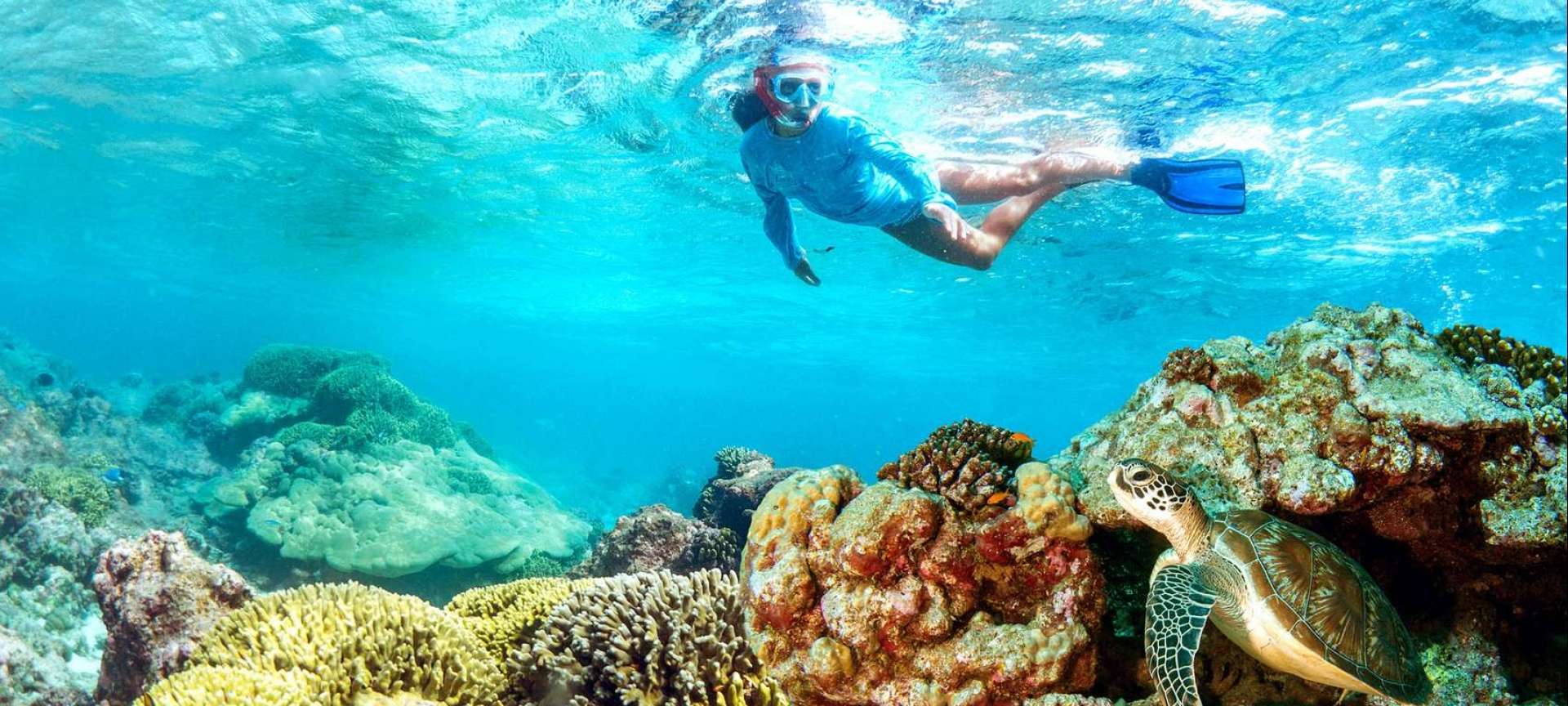
- Mozambique Vacation
The ultimate guide to your next Mozambique Vacation
- Mozambique Gallery
- Where to go
- Experiences
- Travel Advice
Get to Know Mozambique

By Lana Goodwin
Safari Travel Planner
Date Published: 2 January 2014
Welcome to Mozambique, a stunning coastal destination where pristine beaches meet vibrant culture, and rich history blends seamlessly with natural beauty.
Situated along the southeastern coast of Africa, Mozambique is a destination that promises a diverse and unforgettable experience for every traveller.
Whether you’re drawn to its idyllic islands, intrigued by its fascinating marine life, or looking to immerse yourself in its cultural heritage, Mozambique offers an extraordinary escape that caters to all.
Discover why this enchanting country should be at the top of your travel bucket list and prepare for a journey filled with adventure, relaxation, and wonder.
Mozambique Video

How it Works
View our recommended safaris for inspiration and get ready to plan your dream safari
Contact us or fill out an enquiry form and one of our travel experts will help you tailor make your perfect safari
Enjoy an authentic African experience.
Why Go to Mozambique
Mozambique is more than just a beach destination; it’s a place that captivates with its stunning landscapes, rich cultural heritage, and endless opportunities for adventure.
Here’s why Mozambique should be at the top of your travel bucket list:
Breathtaking Natural Beauty
- Pristine Beaches: Mozambique boasts some of the most beautiful beaches in the world, with powdery white sands and crystal-clear turquoise waters. Whether you’re lounging on the tranquil beaches of Bazaruto Archipelago, Tofo Beach, or Vilanculos, the coastline offers a serene escape for beach lovers.
- Lush Landscapes: Beyond its beaches, Mozambique features lush mangroves, expansive savannahs, and scenic highlands. Gorongosa National Park is a haven for nature enthusiasts, offering panoramic views, unique flora and fauna, and pristine trails.
- Marine Wonders: The waters around Mozambique are teeming with vibrant marine life. Snorkeling and diving in the Quirimbas Archipelago or Bazaruto Archipelago allow you to explore an underwater paradise, encountering colorful fish, sea turtles, manta rays, and even whale sharks.
Rich Cultural Heritage
- Cultural Diversity: Mozambique is a melting pot of cultures, with influences from Africa, Portugal, and Arab countries. This diversity is reflected in its festivals, cuisine, and daily life, creating a rich and unique cultural tapestry.
- Historical Sites: The country’s history is preserved in its many historical sites. Visit Ilha de Moçambique, a UNESCO World Heritage site that tells the story of the country’s colonial past, or explore the vibrant city of Maputo with its colonial architecture and bustling markets.
Luxury and Comfort
- World-Class Resorts: Mozambique is home to luxurious resorts and boutique hotels that offer unparalleled comfort, exceptional service, and breathtaking views. Enjoy private villas, infinity pools, and world-class spa treatments that cater to your every need.
- Gourmet Cuisine: The culinary scene in Mozambique is a delightful blend of flavors, reflecting its multicultural heritage. Indulge in gourmet cuisine that combines African, Portuguese, and Arab influences, prepared by skilled chefs using fresh local ingredients.
Adventure and Activities
- Water Sports: Mozambique is a haven for water sports enthusiasts. From kite surfing and paddleboarding to deep-sea fishing and sailing, the country offers a plethora of activities for thrill-seekers and adventurers.
- Wildlife Safaris: Explore the diverse wildlife of Mozambique by embarking on a safari in Gorongosa National Park. Spot lions, elephants, hippos, and a variety of bird species in their natural habitat.
Serenity and Relaxation
- Spa Retreats: Mozambique is the perfect destination for relaxation and rejuvenation. Many resorts offer world-class spa facilities where you can unwind with luxurious treatments and therapies, surrounded by the country’s natural beauty.
- Peaceful Getaways: Whether you’re seeking a romantic escape, a family vacation, or a solo retreat, Mozambique offers serene and peaceful settings that allow you to disconnect from the world and reconnect with yourself.
Where to go in Mozambique
Mozambique is a treasure trove of diverse destinations, each offering its own unique charm and attractions. From the bustling capital of Maputo to the serene beaches of the Bazaruto Archipelago, and from the lush landscapes of Gorongosa National Park to the cultural richness of Ilha de Moçambique, there’s something for everyone. Discover the best places to visit and immerse yourself in the vibrant life of this tropical paradise.
- Ibo Island and the Quirimbas Archipelago
- Inhambane and Tofo
- Mozambique Island
- Ponta do Ouro
- Where to Go in Mozambique
The Bazaruto Archipelago consists of five glorious main islands: Bazaruto, Benguerra, Magaruque, Santa Carolina, and Bangue.
Bazaruto Island is the largest, sporting a 30km (19mi) spine of dazzling dunes that roll down its eastern flank above a picturesque turquoise sea.
Across a narrow channel to the south, Benguerra Island is less than half the size, and Magaruque Island and Santa Carolina are even smaller.

In the far south, Bangue Island is little more than a sandbar, while a sixth tiny satellite called Pansy (or Shell Island) gets completely submerged at high tide.
The area is protected within a 1430km2 (552 square mile) marine park and offers some of the best diving, snorkeling, and recreational game fishing in Africa.
Around 5000 Mozambicans call the islands their home, giving the archipelago a ‘lived-in paradise’ feel. Kids splash in the waves, colorful dhows fish offshore, and there’s a timeless, friendly atmosphere if you feel inclined to explore.
Bazaruto’s dunes are lovely to climb, and the freshwater lakes and inland forests support crocodiles, tiny antelope, endemic butterflies, and over 180 species of birds.
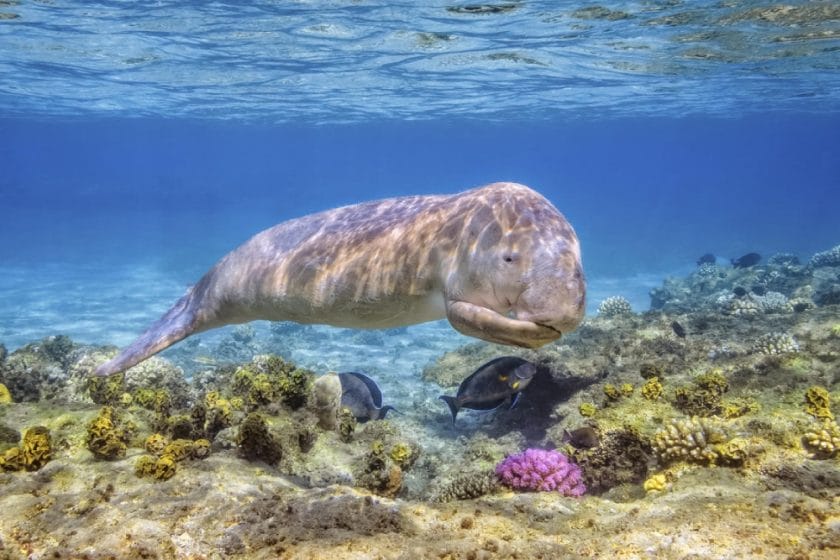
Take a day trip to Pansy sandbar, and you’ll find it sprinkled with eye-catching sea-urchin shells, while divers and snorkelers can see whales, sharks, turtles, and rays.
Over 2000 species of fish have been recorded, and the surrounding waters are also home to the highly threatened marine mammal, the dugong. Though sightings are rare, this is the best place to spot them during your holiday in Bazaruto.
Travel Tips
- A handful of world-class luxury resorts are the only options for staying on the islands. These lodges are some of the best in East Africa for understated, intimate, exclusive escapes.
- Guests can choose a short, spectacular flight from Vilanculos or an equally beautiful transfer by boat. The sea can get choppy if the wind picks up, so flights are preferable if you’re prone to seasickness.
- From November to March, the hotter summer months are best for spotting whale sharks, but with the greatest risk of rain and, occasionally, severe storms.
- Humpback whales are common during the dry, warm winter, but you’ll find extraordinary life beneath the waves whenever you visit.
The Quirimbas Archipelago lies like a forgotten string of pearls, carelessly flung out along the far northern coast of Mozambique.
Twelve main and 20 smaller islands make up the Quirimbas Archipelago island chain, scattered along with shell-strewn sandbars and gleaming white tidal spits.
The 11 most southerly isles are protected within the Quirimbas National Park, including Ibo Island, which is also the most accessible.
Ibo Island was once an important trading center on the East African coast.
Still, its stately mansions now lie in ruins amidst a laid-back community of subsistence farmers, fishermen, and silversmiths.
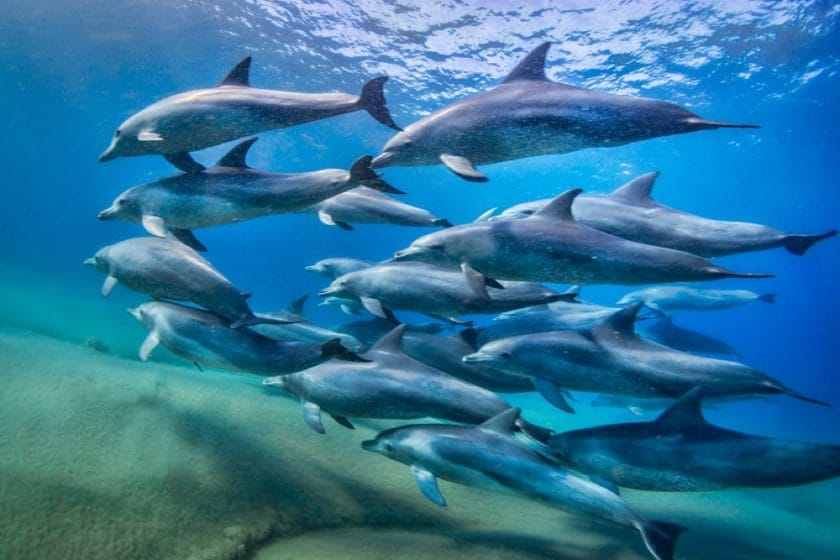
When you go on an Ibo Island holiday, you’ll travel back in time to catch a glimpse of East Africa as it once was.
You’ll find some of Mozambique’s most exclusive, romantic lodges, world-class diving , and phenomenal beaches on the surrounding atolls.
Ibo Island’s old town has been suggested as a UNESCO World Heritage Site and shares a similar cultural and architectural significance as the Quirimbas Archipelago Islands further south.
However, most historical buildings are from a later period – late 18th and 19th-century forts, churches, and villas.
Ibo Island itself lacks a truly postcard-perfect beach, but it’s an ideal staging post for island hopping along the coast.
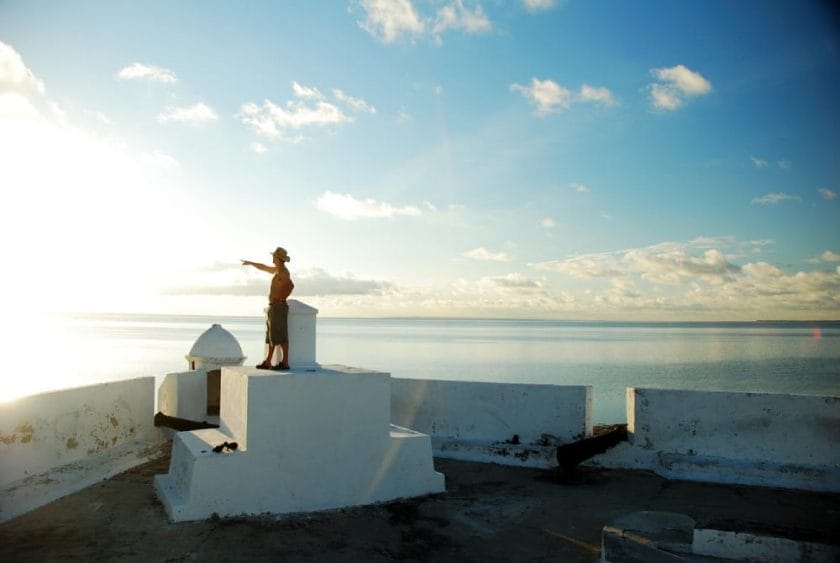
Dhow and kayaking adventures can be booked from here, and there are fantastic diving and snorkeling on the protected reefs nearby.
This region still sees very few visitors, so even if you’re not headed to one of the private island lodges, you’ll likely feel like you have the whole exquisite archipelago to yourself.
- The easiest way to access the Quirimba Islands is by air. Pemba is the main local airport, and from there, you can connect to Ibo Island or fly directly to your lodge.
- Ibo Island has a handful of budget-conscious tour options , but for the most part, the Quirimbas Archipelago is the realm of stunning private islands and exclusive romantic holidays
- The proximity to Tanzania also allows for great beach and safari holiday combos , be aware that December to April can see heavy rain and, in some years, violent storms.
- In early 2019, two massive cyclones battered this coastline, with devastating effects on the community and infrastructure.
- Tourism is a vital way to support those in the region, but be sure to check the current situation before you travel.
The sleepy town of Inhambane was once a key trading center in southern Mozambique, but the days since Portuguese galleons plied these shores for ivory and slaves are long gone.
Inhambane is best known for its handful of good restaurants, Art Deco cinema, and a 19th-century Catholic church. Most visitors stop only briefly in Inhambane on holiday, however, on their way to the popular beach resort of Tofo to the east.
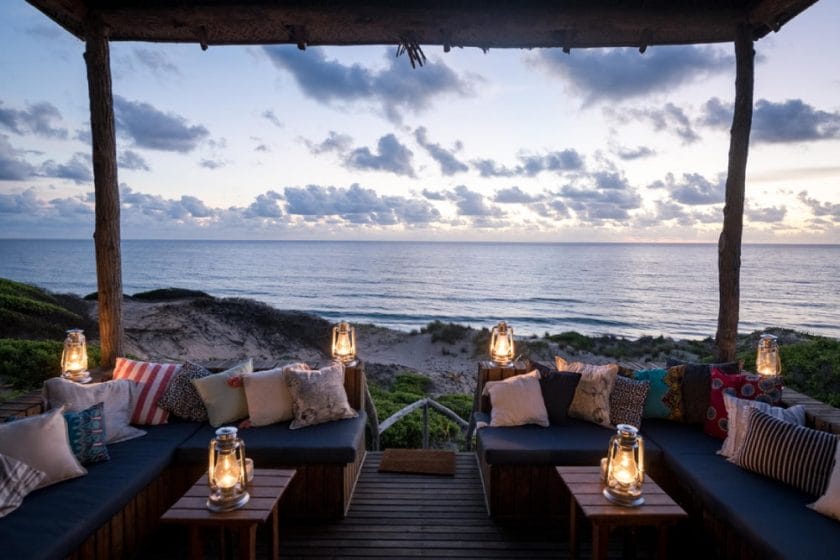
Tofo Beach, and the adjacent cluster of cottages at Tofinho, attract a steady stream of sun and sea devotees.
This chilled dive and surf hotspot is a firm favorite with backpackers, but there are also some stunning upmarket guesthouses and lodges spread up and down along the coast.
Tofo’s beaches and nearby resorts are some of the most popular on a Mozambique holiday. There’s plenty of space on a Tofo and Inhambane holiday, so it rarely feels crowded, although Christmas and Easter can get packed.
Inhambane and Tofo have chilled bars, beach restaurants, and excellent seafood, especially fresh prawns.

For surfers, the Indian Ocean swell throws up a couple of solid point breaks, one off the main beach and one around the corner in Tofinho.
The main attraction, however, is the diving and the off-shore snorkeling trips , where you’ll swim with giant whale sharks and manta rays.
Tofo is considered one of the best places in the world to see these giants – especially the mantas, which can have wingspans over seven meters wide!
- Diving with manta rays is possible all year, but as the reef they frequent is around 24m (79ft) deep, you’ll need an advanced dive qualification to see them.
- Whale sharks are most common from November to April. To see these creatures, boat-based snorkeling trips are best.
- There’s a bustling little market off the main beach, selling fresh fish, groceries, and drinks. There’s also an excellent selection of local crafts, paintings, and souvenirs, though you’ll find the prices in Inhambane slightly cheaper.
- There is no bank in Tofo, and no way to draw cash, so bring enough with you as few places accept cards.
Maputo is Mozambique’s fun, chaotic capital, fanning back from the northern shores of the sparkling Maputo Bay. You’ll find Art Deco architecture alongside colonial-era Portuguese homes on Maputo’s downtown grid of jacaranda and acacia-lined avenues.
Not all are well-maintained, and there are certainly potholes here and there, but on the whole, the impression is of a city on the rise.
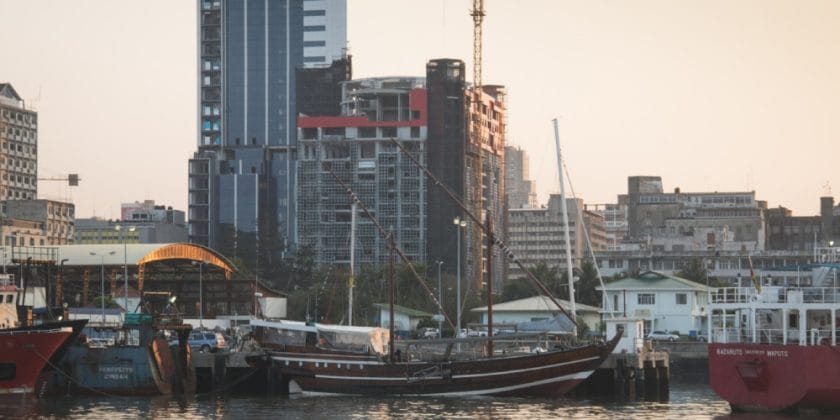
You’ll find excellent restaurants, vibrant nightlife, and good hotels in Maputo. There’s also a three-hour ferry (or you can fly) to nearby Inhaca Island.
A Mozambique holiday should include Maputo if you’re looking for both a cultural and relaxed experience.
Don’t miss Maputo’s Casa de Ferro (House of Iron), the strange pre-fabricated iron mansion imported from Belgium in 1892.
The Natural History Museum should also be on your list, although more for its wonderfully ornate Manueline gothic building than for the slightly chaotic exhibitions inside.
There are seven major street markets in Maputo selling fresh fish, delicious food, and crafts, but the vast Barracas do Museu night market deserves special mention. Hardly a market at all, it serves nothing but drinks – an absolute must if you’re on the hunt for a vibe!
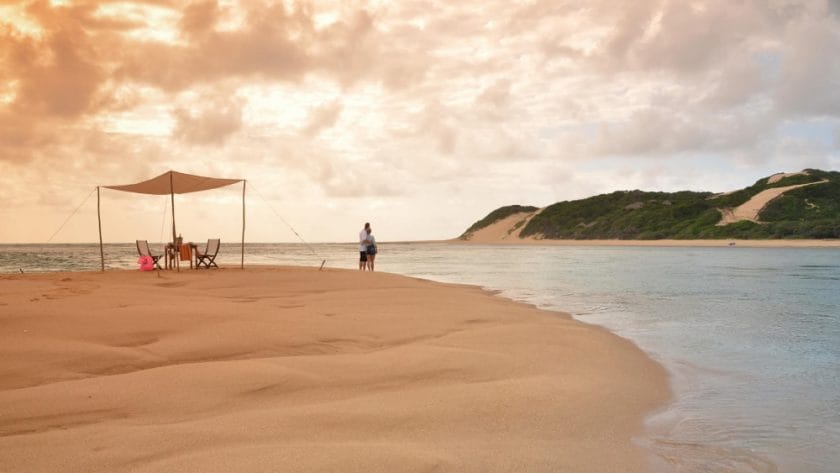
On the far side of Maputo bay, Ilha de Inhaca is the most accessible island in Mozambique. It’s an utterly beautiful, palm-fringed subtropical paradise and surprisingly crowd-free, considering its proximity to the capital.
Across the channel below Inhaca lies Cape Santa Maria and the Machangulo Peninsula, which connects to the mainland in the south.
Machangulo’s beaches are some of the most immaculate in Mozambique, though they’re hard to reach unless you stay at one of the region’s exclusive Maputo lodges .
- Maputo is a friendly, relatively crime-free city, but take the usual precautions, especially regarding pickpockets.
- By law, you’re required to carry personal identification at all times, so it’s worthwhile bringing a certified copy of your passport and leaving the actual document at your hotel.
- Most larger establishments accept payment by credit card, although mostly Visa over MasterCard (Amex is unheard of).
- Besides walking, the best way to get around the city is by taxi, and if you plan on taking multiple trips, then it’s less expensive to negotiate a day rate in advance.
- A few days on a Maputo holiday in Maputo is a rewarding option for the adventurous. It’s a lively, attractive African city that’s more inviting than overwhelming.
The Ilha de Moçambique is a historical gem and a wonderfully laid-back slice of heaven. The Mozambique island is a UNESCO World Heritage Site for its cultural and architectural significance, notably its fine 16th-century fort and associated chapel.
It’s the island, not the mainland, that first took the name ‘Mozambique,’ derived from the sultan Ali Musa Mbiki who was the ruler in the late 15th century.
When the Portuguese arrived and drove the sultan out, they established an outpost that would dominate the Mozambique region for nearly four hundred years.
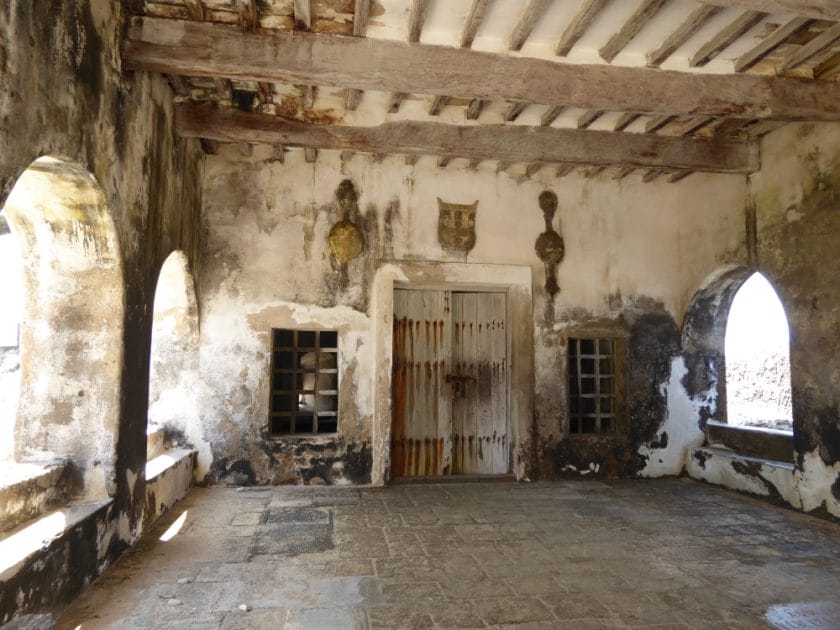
Eventually, the mainland assumed the name of this European base, and when the bulk of trade shifted south to Maputo, the Island of Mozambique faded from the world stage.
A holiday to Mozambique Island is a perfect opportunity to relax and learn about East African culture and history.
The Island of Mozambique is the oldest European settlement in East Africa. The Chapel of Nossa Senhora de Baluarte (Our Lady of the Ramparts) is thought to be the oldest European building south of the equator.
The chapel dates to 1522 and is protected by the impressive limestone Fort of São Sebastião.
The fort was completed in the second half of the 16th century and saw off several major attacks, most notably by the Dutch in 1607 and 1608.
The São Paulo Palace Museum is fascinating, as are the Sacred Art and Maritime Museums.
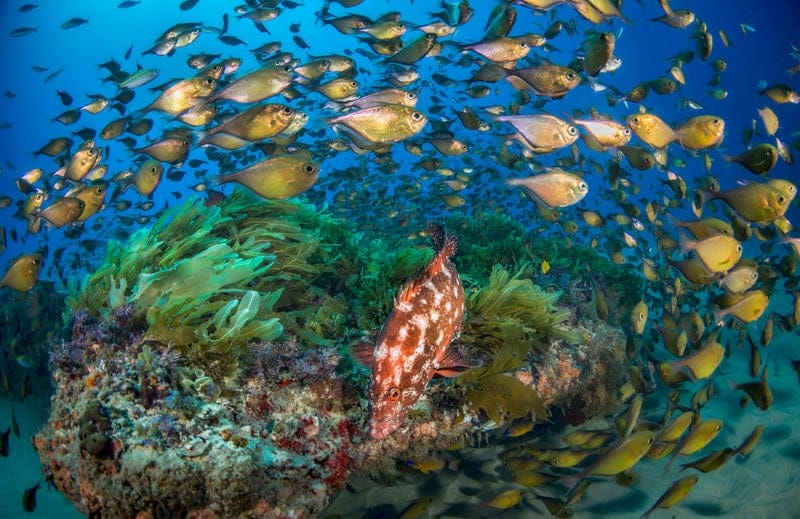
To top off these more cultural pursuits, there are sea-kayaking trips, excellent snorkeling and diving , and boat-based humpback whale watching.
- The Island of Mozambique is not easy to get to. It’s in the country’s far north, and the roads can be slow.
- The closest airport to Mozambique Island, at Nacala, is a two-hour drive to the north, and the international airport at Nampula is about three hours’ drive inland.
- Mozambique Island’s upmarket hotels will arrange all necessary transfers, but if you’re on a tighter budget, prepare for an adventure.
- Regional buses and taxis only cost a few dollars, but you may have to switch between them en route.
- When you arrive on Mozambique Island, you’ll find many hotels, from breezy romantic suites to family resorts and affordable backpackers.
- There are cash machines on the island, and the more prominent hotels accept credit cards.
- Everywhere you stroll on your Mozambique Island holiday, you’ll feel completely safe, day and night.
Ponta do Ouro, literally ‘Tip (or Point) of Gold,’ is a family-friendly beach holiday town just north of the South African border.
Ponta Do Ouro is the first of a succession of undulating sandy points that stud the vast, golden beach, which rolls unbroken to Inhaca Island.
Ponta Do Ouro is an 85km (53mi) ribbon of sand and one of Mozambique’s most beautiful and pristine holiday destinations.
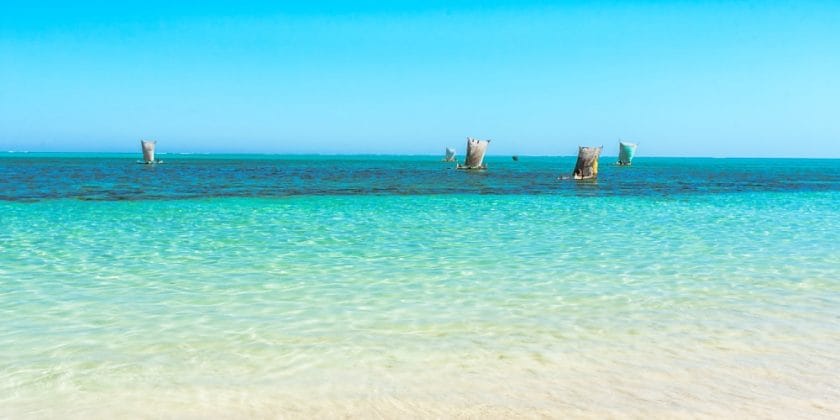
‘Ponta,’ as the town is affectionately known, is the most accessible and popular gateway into this slice of heaven.
Ponta Do Ouro is a bit of a party town, especially during the Christmas and Easter holidays when it’s a firm favorite with visiting South Africans.
It’s a long way off the famous party resorts of the Med, but expect lots of kids on the beach, lively campsite barbeques, and buzzing beach bars.
It’s a great place to go if you’re traveling solo in Mozambique or with a young family , though there’ll be more for the kids if they’re old enough to snorkel or take boat rides.

Ponta’s scuba diving is world-class, and the conditions for underwater photography are ideal. The water is warm and clear, and the offshore reefs are famous for their reef sharks, whale sharks, turtles, dolphins, and rays.
- Ponta is a year-round beach holiday destination, but pick your dates with care for the best diving and snorkeling .
- Whales and whale sharks are most common between July and January, while shark cage diving season (a specialty in Ponta) runs from September to April.
- Dolphins, turtles, and rays can be seen throughout the year, but the summer months (November to March) are the most pleasant to be on a beach holiday .
- Until recently, Ponta could only be reached by 4×4, but a newly sealed road now runs to Maputo and South Africa. It remains to be seen what impact this will have on the town, but if complete solitude is what you’re after, then there are some superb, quieter lodges just a short way up the coast.
Vilanculos is probably Mozambique’s fastest-growing and most bustling beach holiday town, a jumbled network of half-sealed, half-sandy streets on a typically lovely ribbon of coastline.
With a small but international airport that sees daily flights from South Africa, it’s popular with luxury fly-in visitors and backpackers.
Though Vilanculos has gorgeous beaches and is a much-loved destination, the town also serves as the perfect gateway for a Bazaruto islands holiday.
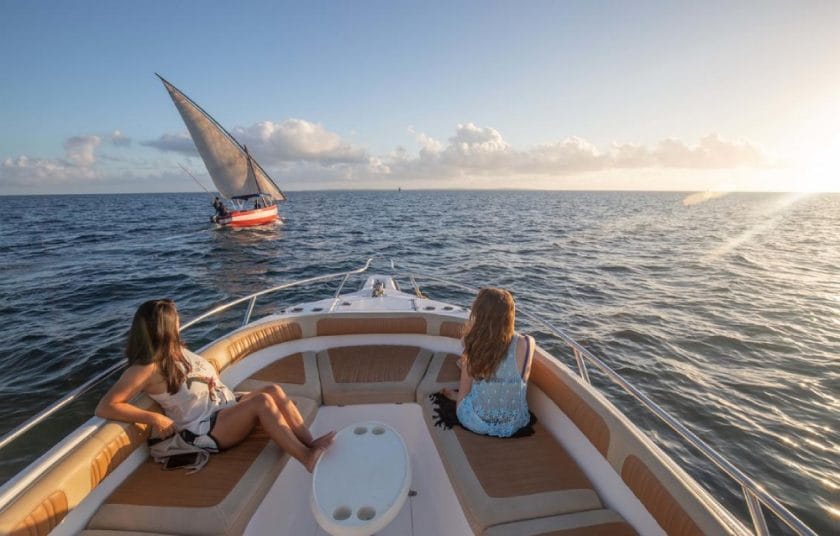
This stunning, protected archipelago beckons, just a lazy dhow-ride offshore. There’s a huge diversity of more affordable accommodations in town for those who can’t quite manage the ultra-luxury lodges on the islands.
Day trips to the nearby reefs are arguably Vilanculos’ major draw – the diving and snorkeling are simply some of the best in East Africa.
Two Mile Reef, in particular, is an absolute must when visiting Vilanculos, and from July to November, you may see humpback whales cruising by underwater.
Even if you miss them, you’ll almost certainly hear their haunting songs as a myriad of bright fish flash by, along with rays, turtles, and perhaps even a whale shark.
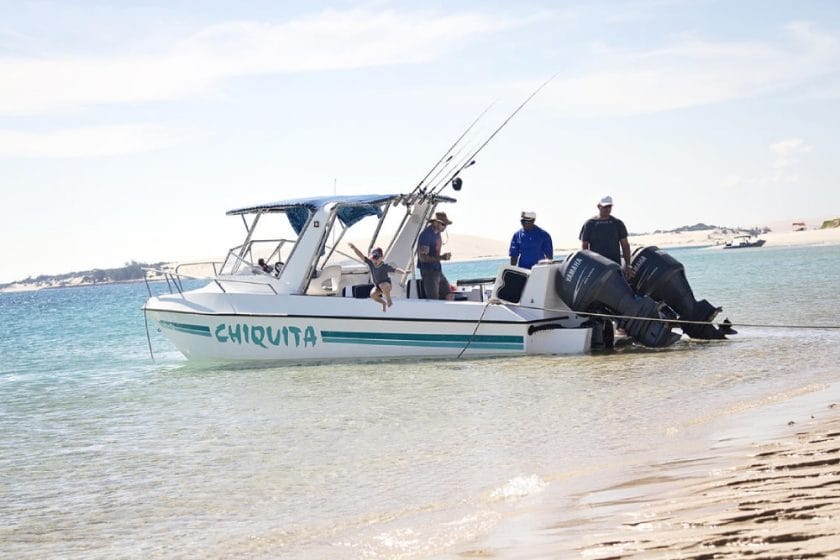
Big-game fishing is also hugely popular off Vilanculos, as marlin, sailfish, barracuda, and tuna all frequent these waters.
With its wide range of Vilanculos resorts , barefoot bars, and palm-fringed beaches, there’s something for everyone in what remains a laid-back, uncrowded holiday town.
- Daily flights from Johannesburg and Nelspruit make travel arrangements easy. Nelspruit lies on the southern border of the Kruger National Park, and with a flight time of only an hour and 10 minutes, it’s easy to combine South Africa’s most famous wildlife park with a beach holiday .
- There are banks in Vilanculos, a pharmacy and a private hospital, and a couple of well-stocked supermarkets if you’re booking a self-catering villa.
- Before you leave, check out the two main central markets, where you’ll find an excellent selection of local handicrafts and souvenirs.
Mozambique is a land of stunning choices, offering everything from pristine beaches and vibrant coral reefs to lush national parks and historic colonial towns.
Discover the best places to visit in this beautiful country and experience its rich cultural heritage and natural wonders. Here are the top 10 destinations you shouldn’t miss.
1. Bazaruto Archipelago
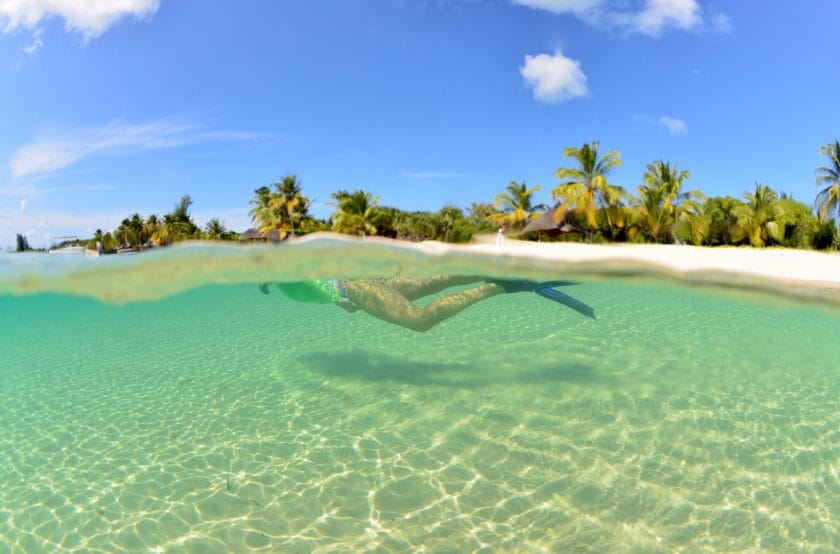
Island Paradise: The Bazaruto Archipelago, a cluster of idyllic islands off the coast of Mozambique, is renowned for its stunning beaches, crystal-clear waters, and vibrant marine life.
Dive into the turquoise waters to explore colourful coral reefs, swim with whale sharks, and encounter dolphins and sea turtles. The archipelago’s islands, such as Bazaruto, Benguerra, and Magaruque, offer luxurious resorts, making it a perfect destination for a tropical escape.
Unique Fact: The Bazaruto Archipelago is home to the rare dugong, an endangered marine mammal similar to a manatee, making it one of the few places in the world where you can see these gentle creatures.
2. Quirimbas Archipelago
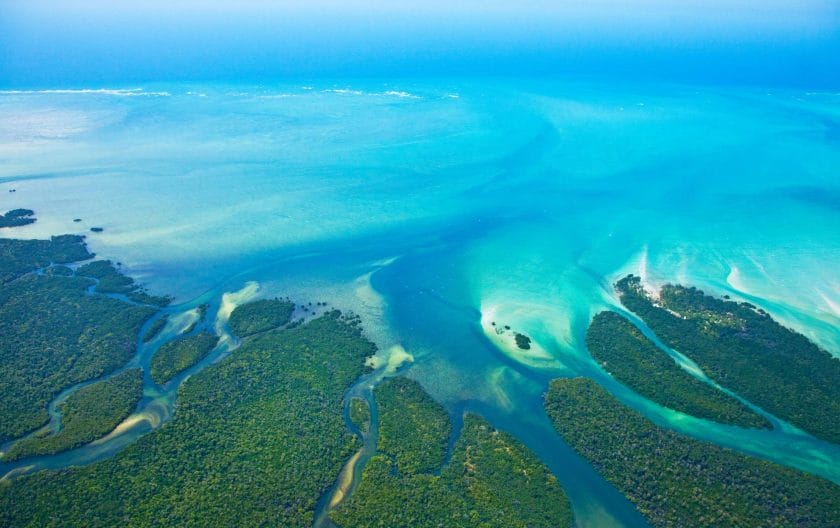
Marine Sanctuary: Located in northern Mozambique, the Quirimbas Archipelago is a paradise for divers and snorkellers. The clear waters and vibrant coral reefs teem with marine life, including turtles, dolphins, and an array of tropical fish. The islands also offer secluded beaches and luxurious lodges, perfect for a peaceful retreat. Explore the historic Ibo Island, known for its colonial architecture and rich history.
Unique Fact: Ibo Island is famous for its ancient silver-smithing traditions, where artisans still craft intricate silver jewellery using techniques passed down through generations.
3. Gorongosa National Park
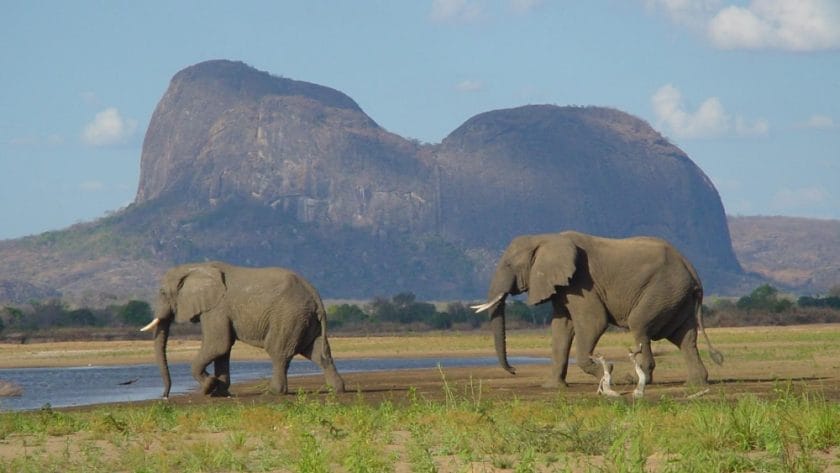
Wildlife Haven: Gorongosa National Park is a must-visit for nature lovers and wildlife enthusiasts. The park covers over 4,000 square kilometres and offers a network of trails that wind through lush forests, past waterfalls, and to stunning viewpoints.
Spot lions, elephants, hippos, antelopes, and a variety of bird species in their natural habitat. The park’s diverse ecosystems and breathtaking scenery provide an unforgettable safari experience.
Unique Fact: Gorongosa National Park was the focus of a major restoration project, which included reintroducing species that had disappeared from the park due to years of conflict.
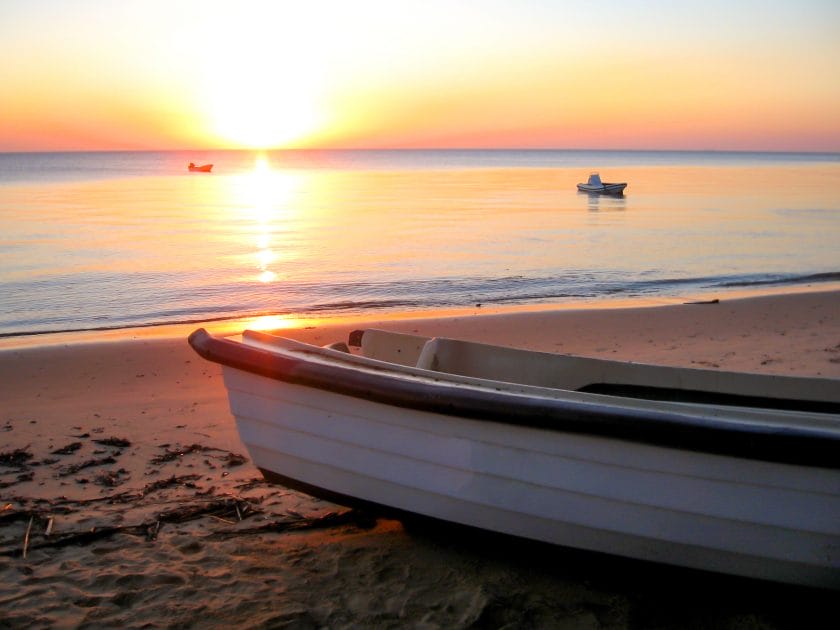
Vibrant Capital: Maputo, the bustling capital of Mozambique, is a city rich in culture and history. It played a significant part in the 1800s during the Indian spice trade. It was ruled by the Portuguese for centuries, and experienced a deadly civil war. It is famous for its Jacaranda and Flame Tree avenues, Mediterranean architecture, and Afro-Latino vibe.
Visit the Central Market to experience local life, taste street food, and buy souvenirs. Explore the National Art Museum to admire contemporary African art, and stroll along the lively waterfront. Don’t miss the historic Maputo Railway Station, a stunning example of colonial architecture.
Unique Fact: Maputo is known for its vibrant music scene, particularly Marrabenta, a traditional Mozambican music genre that blends local rhythms with Portuguese folk music.
5. Tofo Beach

Diving and Nightlife: Tofo Beach is a popular destination for diving enthusiasts and those looking to experience Mozambique’s vibrant nightlife.
The beach is renowned for its excellent diving spots, where you can encounter whale sharks, manta rays, and diverse marine life. In the evenings, enjoy the lively beach bars and local music, making it a perfect spot for both adventure and relaxation.
Unique Fact: Tofo Beach is one of the best places in the world to see whale sharks year-round, with regular sightings making it a top destination for marine biologists and enthusiasts.
6. Ilha de Moçambique

Cultural and Historical Gem: Ilha de Moçambique is a small island with a rich history, designated as a UNESCO World Heritage site. The island offers stunning colonial architecture, charming streets, and a fascinating blend of cultures.
Visit the Chapel of Nossa Senhora de Baluarte, one of the oldest European buildings in the southern hemisphere, and explore the island’s museums and markets.
Unique Fact: Ilha de Moçambique served as the capital of Portuguese East Africa for nearly four centuries, which is reflected in its well-preserved colonial buildings and historical sites.
7. Vilanculos

Gateway to Bazaruto: Vilanculos is a vibrant coastal town and the gateway to the Bazaruto Archipelago. The town offers beautiful beaches, lively markets, and a range of water sports.
Take a dhow safari to explore the nearby islands, go snorkelling in the crystal-clear waters, or simply relax on the sandy shores. Vilanculos also provides a variety of accommodations, from luxury resorts to budget-friendly lodges.
Unique Fact: Vilanculos is known for its traditional dhow sailing boats, which are still used by local fishermen and are also a popular way for tourists to explore the archipelago.
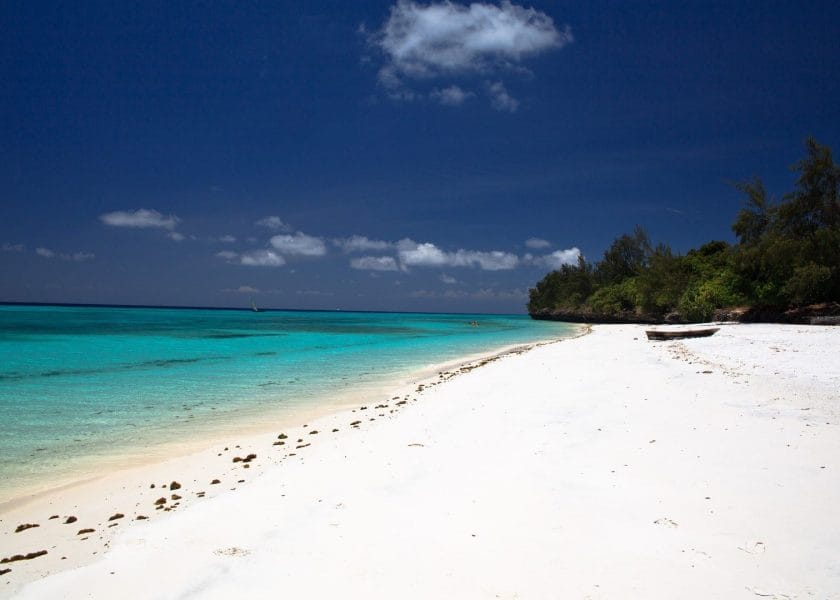
Diving and Relaxation: Pemba is a coastal city known for its beautiful beaches and excellent diving opportunities. The waters around Pemba are home to vibrant coral reefs and diverse marine life.
The city’s relaxed atmosphere and scenic coastline make it a great destination for both adventure and leisure. Explore the local markets, enjoy fresh seafood, and take a boat trip to nearby islands.
Unique Fact: Pemba Bay is one of the largest natural harbours in the world, offering deep waters that are perfect for sailing and water sports.
9. Inhambane

Historical Coastal Town: Inhambane is a charming coastal town with a rich history and a relaxed atmosphere. The town is known for its colonial architecture, vibrant markets, and beautiful beaches.
Visit the Inhambane Cathedral, explore the local markets, and take a boat trip to nearby Barra Beach or Tofo Beach. The warm waters and scenic views make it an ideal spot for a peaceful getaway.
Unique Fact: Inhambane is one of the oldest settlements in Mozambique, with a history that dates back to the early 11th century when it was a bustling port for Arab traders.
10. Niassa Reserve
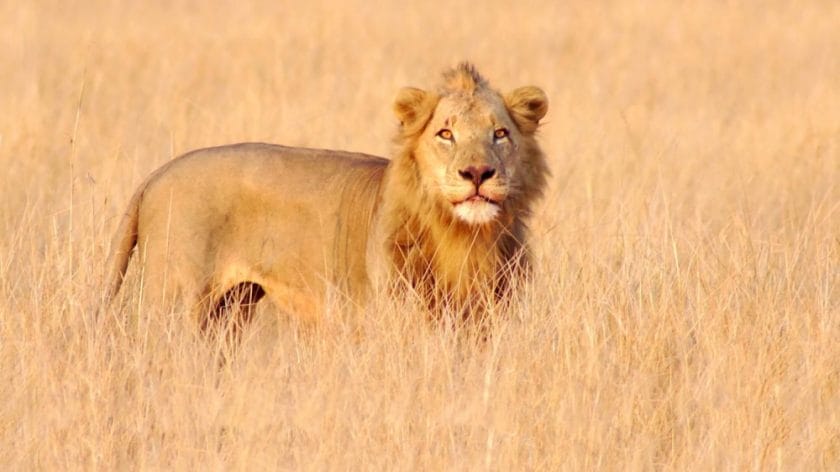
Untamed Wilderness: Niassa Reserve, located in northern Mozambique, is one of the largest protected areas in Africa. The reserve offers a true wilderness experience, with vast landscapes, diverse wildlife, and minimal tourist infrastructure.
Explore the rugged terrain, spot elephants, lions, and wild dogs, and experience the untouched beauty of Mozambique’s natural heritage. The reserve’s remote location ensures an authentic and secluded adventure.
Unique Fact: Niassa Reserve is home to one of the largest populations of wild dogs in Africa, making it a crucial area for the conservation of this endangered species.
Discover these diverse and captivating destinations in Mozambique to fully experience the country’s natural beauty, rich culture, and adventurous spirit.
Each location offers unique attractions and activities that will make your visit to Mozambique unforgettable. Whether you’re seeking adventure, relaxation, or cultural immersion, Mozambique has something to offer every traveller.
Travel with Confidence
With over 20 years of experience, our team will help you tailor your itinerary to your perfect adventure., 24/7 support, personalised, popular mozambique safaris.
Mozambique offers a variety of safari experiences that cater to every type of traveler. Whether you’re looking to explore the wildlife-rich landscapes of Gorongosa National Park or embark on a marine safari in the Quirimbas Archipelago, Mozambique’s safaris promise unforgettable adventures. Discover Africa’s curated safari tours ensure you experience the best of Mozambique’s natural beauty and diverse ecosystems.
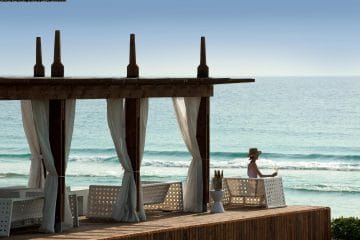
Kruger Safari and Mozambique Beach Combination
Southern Africa South Africa Kruger National Park Mozambique
From $ 4560 /USD

Classic Southern Africa Train Journey
South Africa Johannesburg Pretoria Kruger National Park Mozambique Zimbabwe
From $ 7900 /USD
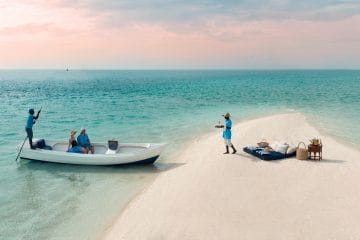
Luxury Okavango Delta and Mozambique Honeymoon
Botswana Okavango Delta Mozambique Vilankulo Benguerra Island
From $ 10450 /USD
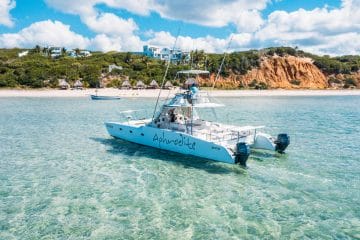
Family Holidays in Mozambique
Mozambique Vilankulo
From $ 7080 /USD
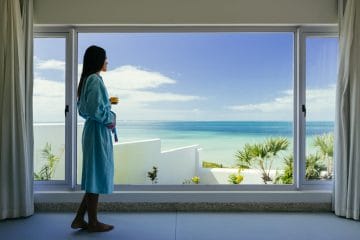
Bush & Beach Safari in Timbavati and Mozambique
Southern Africa South Africa Timbavati Mozambique Vilankulo
From $ 5930 /USD
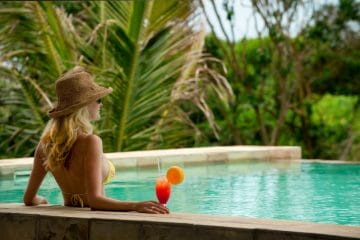
Relaxed Mozambique Holidays
From $ 2750 /USD
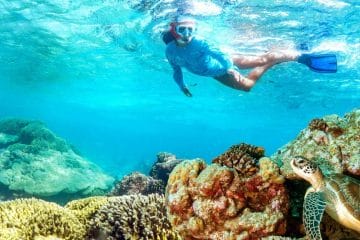
7 Mozambique Safaris to choose from
Stay for 4 - 14 days
Experience our Tailor-made Tours in Mozambique
When is the best month to travel to mozambique.
Mozambique boasts a pleasant climate year-round, but the best time to visit depends on what you’re looking to experience. For beach lovers and water sports enthusiasts, the dry season from May to October offers sunny skies and calm seas. If you’re interested in wildlife viewing and lush landscapes, the rainy season from November to April is ideal. Each season brings its own unique charm and activities to enjoy.
- Mozambique in January
- Mozambique in February
- Mozambique in March
- Mozambique in April
- Mozambique in May
- Mozambique in June
- Mozambique in July
- Mozambique in August
- Mozambique in September
- Mozambique in October
- Mozambique in November
- Mozambique in December
Our Recommended Tours in Mozambique
Discover Africa’s recommended tours in Mozambique offer a perfect blend of adventure, comfort, and cultural immersion. Our carefully curated tours ensure you experience the best that Mozambique has to offer, from its breathtaking natural beauty to its rich cultural heritage. Each tour is designed to provide an unforgettable and enriching experience, allowing you to explore the country in a way that suits your interests and travel style.
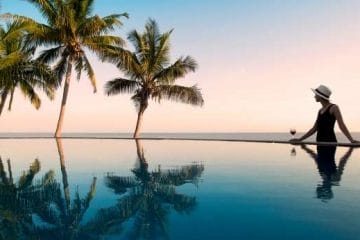
Luxury Mozambique Honeymoon Holiday
Mozambique Benguerra Island
From $ 2950 /USD
Looking for Something Unique?
Mozambique is full of unique experiences that go beyond the ordinary. Visit the ancient ruins of Ilha de Moçambique, take a dhow cruise along the coastline, or join a marine safari to swim with whale sharks. Whether it’s a romantic dinner on a secluded beach or an adrenaline-pumping kite surfing session, Mozambique offers extraordinary activities that promise to make your trip truly special.

Beach Holidays in Africa

Family and Kid-Friendly Safaris
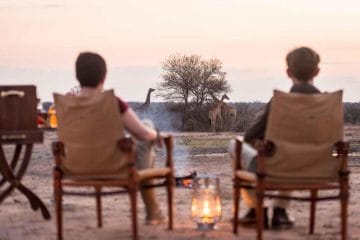
Honeymoons in Africa
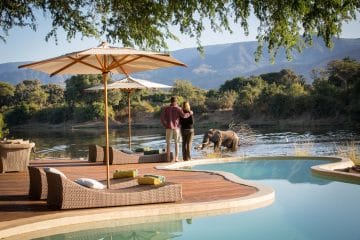
Mozambique Safari Reviews
Hear from our guests who have experienced the wonders of Mozambique. Their stories of exceptional trip planning, life-changing adventures, and memorable experiences reflect the magic of our safaris and the unmatched beauty of Mozambique. Visitors have marveled at the country’s natural beauty, thrilled at unique activities, and enjoyed the serene luxury of our accommodations. Come and experience the awe-inspiring landscapes, vibrant culture, and unique adventures that our guests rave about.
Helpful and very friendly!
Namibia Self-Drive Journey Review
François Couvreur, France 25 Apr 2023
Megan at discover africa organised an incredible tour for us..
16 Day South Africa & Zimbabwe Safari
Kylie, Australia 17 Apr 2023
Excellent experience planning an african safari.
Namibia, Botswana & Victoria Falls Safari Review
Jenny, United States 21 Mar 2023
Excellent service.
Cape Town Holiday & Safari Review
Rahul, United States 28 Jan 2023
Wonderful vacation and service..
Sabi Sands Game Reserve Safari Review
David, United States 30 Jul 2021
Thank you to steve and rest of the discover africa team for....
Cape Town to Kenya Safari Review
Eady Family, South Africa 01 Jan 2013
Ready to plan your tailor-made safari.

Megan Warrington, Safari Travel Planner
Free safari planning advice from destination experts
See mozambique in your comfort.
Mozambique caters to all travel styles, offering a range of accommodation and transport options to suit your preferences. From luxurious beachfront resorts and boutique hotels to budget-friendly guesthouses and self-catering villas, Discover Africa ensures you’ll find the perfect place to stay. Travel at your own pace with private transfers, rental cars, or guided tours, providing a comfortable and personalized experience throughout your journey. Enjoy the freedom to explore this iconic destination in a way that suits you best, whether it’s a romantic getaway, a family adventure, or a solo retreat.
- Affordable Holiday in Mozambique
- Budget Holiday in Mozambique
- Luxury Holiday in Mozambique
Affordable, mid-range hotels and resorts are more common along the southern coast of Mozambique. Look around Ponta do Ouro, Tofo Beach, and Vilanculos for the best quality and variety on your Mozambique beach holiday .
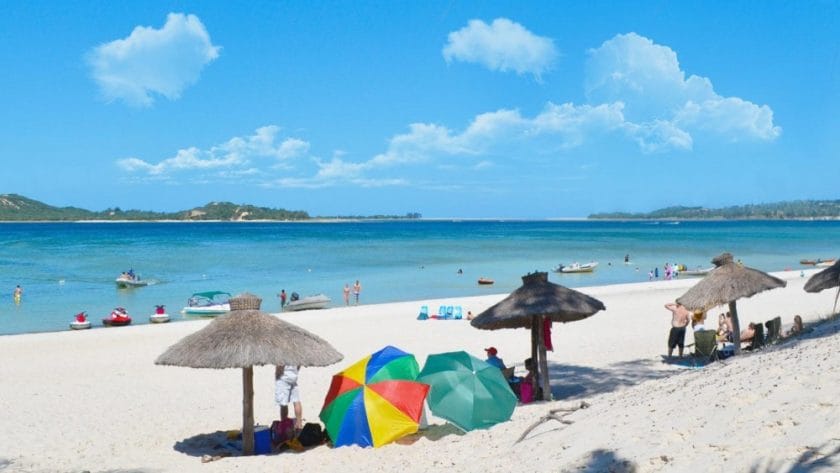
Generally speaking, the most affordable option will be to hire a house and self-cater. All three regions in Mozambique have holiday cottages and villas where guests can cook for themselves. Also, look out for all-inclusive specials, which can be great value if activities are included.
While you’re on your Mozambique holiday, it’s worth splashing out on a once-in-a-lifetime experience. Whether diving with sharks or a desert island picnic, these unforgettable moments make Mozambique unique. You can go humpback whale spotting, take a dhow cruise or search for giant loggerhead turtles.
All these can be booked as separate tours when you arrive, or you can book in advance and take advantage of any specials. One affordable route can be to find a more upmarket hotel that offers great value for money on their in-house excursions.
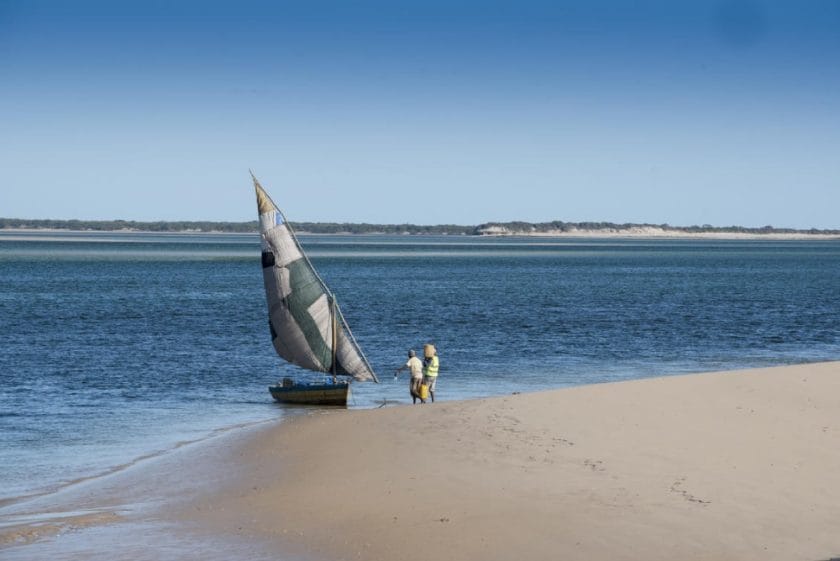
Good deals are especially likely during the December to April low season and the shoulder season months of November and May.
- The Metical is the local Mozambican currency. Still, many mid-range hotels and restaurants will take US dollars, and around Ponta do Ouro, South African Rands are also widely used.
- Credit cards are increasingly accepted in the major centers, although Visa is preferred, and smaller businesses will likely only accept meticais.
- Whatever you do, spend all your meticais before you leave. You’ll find it very difficult to exchange outside of Mozambique and will certainly get a very poor rate if you find a willing FOREX agent.
For a budget-conscious holiday in Mozambique, it’s best to head for one of the main southern beach towns – specifically, Ponta do Ouro, Tofo Beach, or Vilanculos.
Your principal expenses will likely be diving and boating activities, closely followed by budget-friendly accommodation , meals, and local transportation.
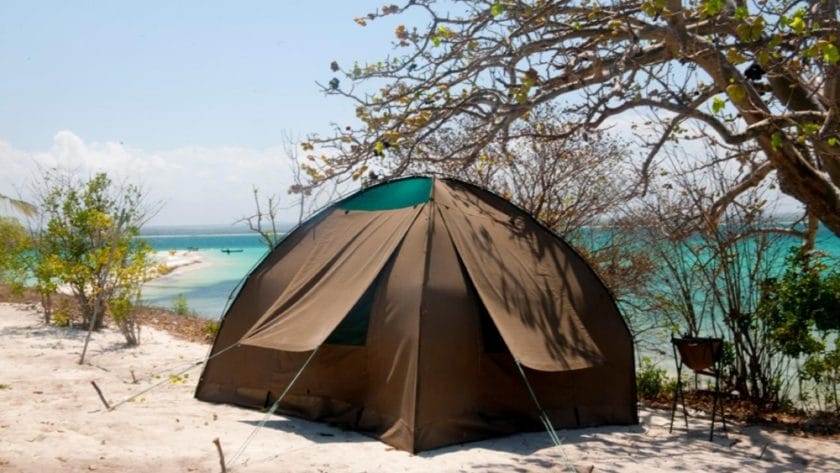
Internal flights in Mozambique are relatively expensive, as are private vehicle transfers between the more upmarket hotels. For example, a flight from Maputo to Tofo (Inhambane) will cost around $160 one way, while a bus or shared tourist shuttle is about $16 and a local shared taxi (chapa) even less.
Diving is one of Mozambique’s major highlights, but prices vary widely depending on where you go. Ponta do Ouro tends to be the most affordable at around $40 per dive, including gear.
Tofo Beach is slightly more at about $50 (also with rented gear), while in Vilanculos, it can be over $100 a dive, with the added boat transfer/fuel costs to reach the outer reefs.
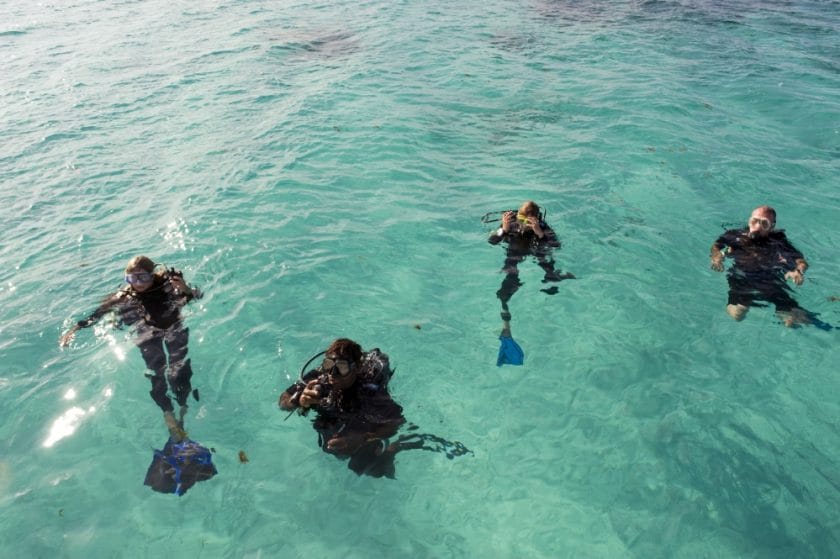
If you’re traveling alone, it’s worth making friends, as many dive centers offer discounts for groups. If you’re looking to learn, Mozambique’s warm waters are ideal. You can get your PADI Open Water certification for around $350.
- Mozambique has an extensive ATM network, so it’s unnecessary to arrive with huge amounts of cash.
- Take at least two bank cards – Visa is preferred – and hide away some backup currency in case of any emergencies.
- Camping is the most affordable option, and there are places to pitch a tent in all the main beach holiday spots.
- The food is excellent and very well priced, and you can feast on local dishes and street fare for less than $10 a day.
You’ll find outstanding luxury resorts all along Mozambique’s coastline . Still, the three main regions are the southern Machangulo Peninsula, the Bazaruto Archipelago, and the stunning coral atolls of the Quirimbas.
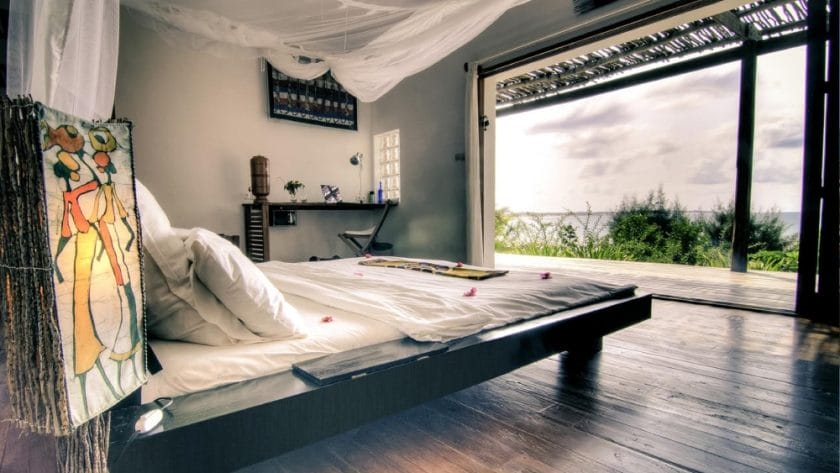
The Machangulo Peninsula offers gorgeous, serviced beach villas and elegant hotels. At the same time, the handful of lodges on the Bazaruto and Quirimbas islands serve up laid-back, barefoot luxury at its best.
A luxury holiday in Mozambique can also be a chance to get involved. Many of the top lodges are linked with local conservation and community projects, emphasizing long-term sustainability.
Highlights include rare marine encounters with the highly threatened dugong, nesting turtles, bird-watching kayak adventures, and spectacular diving in the Bazaruto and Quirimbas marine parks.
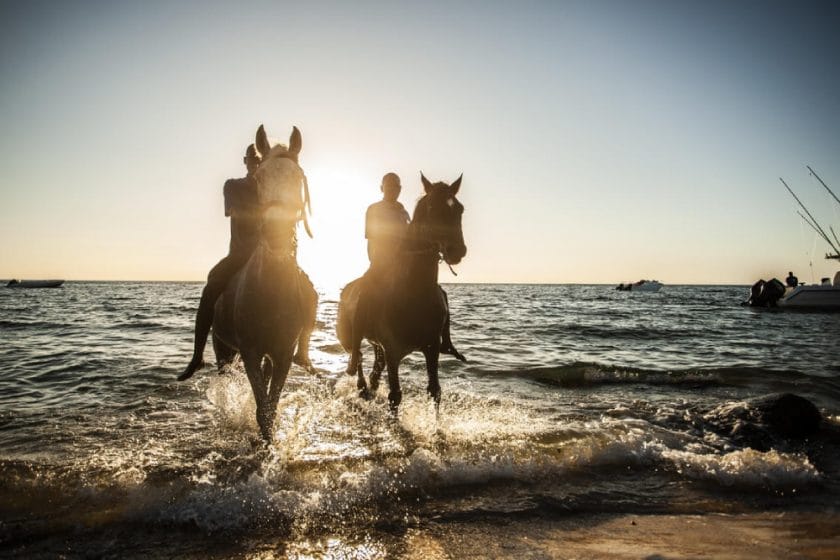
Luxury in Mozambique has an easy-going island flair – a focus on comfort, breathtaking locations, privacy, and exclusivity.
- Mozambique is an excellent choice for a beach and safari combo. The Bazaruto Archipelago has easy flight connections to top lodges in northern South Africa. The Quirimbas Islands are not far from some of Africa’s best wildlife experiences in Zambia and Tanzania .
- Look out for special deals around the October and November shoulder season. It can be scorching just before the rains, but it’s an excellent time for spotting animals and is usually perfect beach weather, especially in the Quirimbas.
- If you’re stopping in Maputo, the capital also has some fine luxury hotels. Slick and well-run, they offer excellent value for money and a convenient, comfortable base from which to explore this vibrant city.
Holiday Styles and Options in Mozambique
Mozambique offers a variety of holiday styles to suit every traveler. Whether you seek adventure, relaxation, or cultural immersion, options abound. Enjoy thrilling water sports, serene beach days, vibrant cultural tours, or luxurious spa retreats. Customize your trip with activities like snorkeling, golfing, hiking, or exploring local markets. Discover Africa’s tailored packages ensure a memorable and personalized experience in Mozambique.
- Mozambique Holiday
In many respects, the south of Mozambique is the archetypal tropical beach nirvana. Also, it boasts world-class snorkeling, diving, and game fishing .
Tourism to Mozambique, consisting mainly of South African fishermen, is concentrated here in a string of developed beach resorts. These include Tofo, Inhambane, Vilanculos, and the offshore islands of Bazaruto National Park.
The beaches of the north of Mozambique are no less beautiful, and the offshore reefs and islands are just as bountiful. However, amenities here tend to be more scattered. With the exception of the mainland resort of Pemba and the honeymoon-friendly Quirimbas Islands, they are generally more rudimentary.
Mozambique has some of the most absorbing towns in southern Africa. These range from the modern capital Maputo, with its palm-lined avenidas and Art Deco architecture, to historic backwaters such as Ilha de Moçambique (the capital of Portuguese East Africa for almost four centuries) and Ibo.
For wildlife safari enthusiasts, highlights include the renascent Gorongosa National Park inland of Beira and the vast Niassa Game Reserve bordering Tanzania.
Who is Travelling to Mozambique with you?
Planning your Mozambique adventure? Tailor your journey with experiences designed for every type of traveler. Whether you’re exploring with a loved one, embarking on a family vacation, discovering solo, celebrating a honeymoon, or enjoying a trip with friends, Mozambique offers unique and unforgettable experiences for all. Select your travel type to find the perfect itinerary and make the most of your holiday.
- Family Holiday in Mozambique
- Mozambique Honeymoon
- Solo Travel in Mozambique
Mozambique has long been a family holiday favourite among South Africans. Over Christmas and Easter, in particular, the vast southern beaches are a playground for kids.
There’s plenty of space for children to run around and explore, plus laid-back, family-friendly resorts that offer kids’ clubs, child discounts, and daycare.
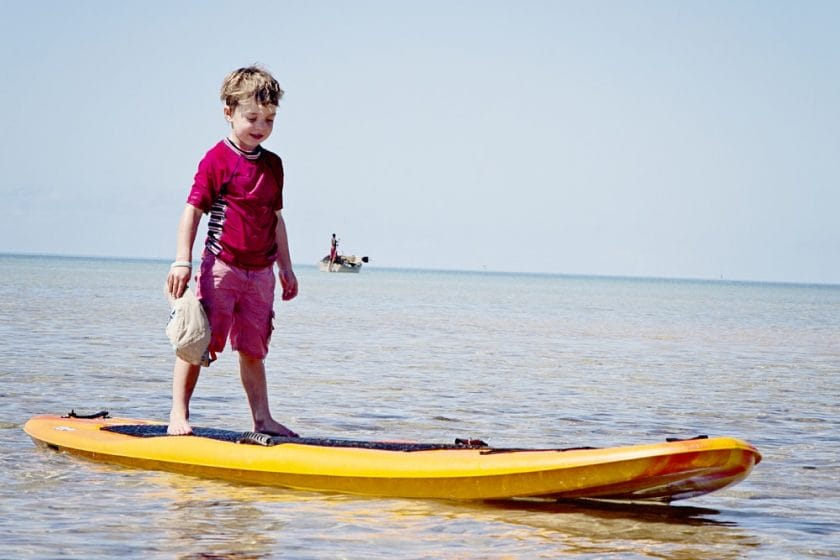
You’ll need an adventurous spirit for a family safari in Mozambique, especially if you have very young children. Road transfers can be long and bumpy, and there’s a high malaria incidence throughout Mozambique.
While traveling to Mozambique with very young kids is not impossible, it might be better to wait until they’re a little older. There’s more effective anti-malarial medication for older kids and teens.
Once they reach ten years old, they can take introductory scuba diving courses and access the marvels beneath the sea.
Best places to visit in Mozambique
The best regions for a family holiday in Mozambique are in and around Ponta do Ouro, Tofo Beach, and Vilanculos. Of the three, Vilanculos is the most accessible, with its international airport and regular flights from Johannesburg and Maputo.
Family activities from Vilanculos include speedboat trips, dhow rides, shallow dive sites, and safe swimming. A snorkeling trip and picnic to one of Bazaruto’s sheltered beaches is an unforgettable experience for kids of all ages.
Further south of Mozambique, the Tofo Beach region is somewhat trickier to reach. The tiny Inhambane Airport services it, but flights are less frequent and only connect internationally through Maputo and Vilanculos.
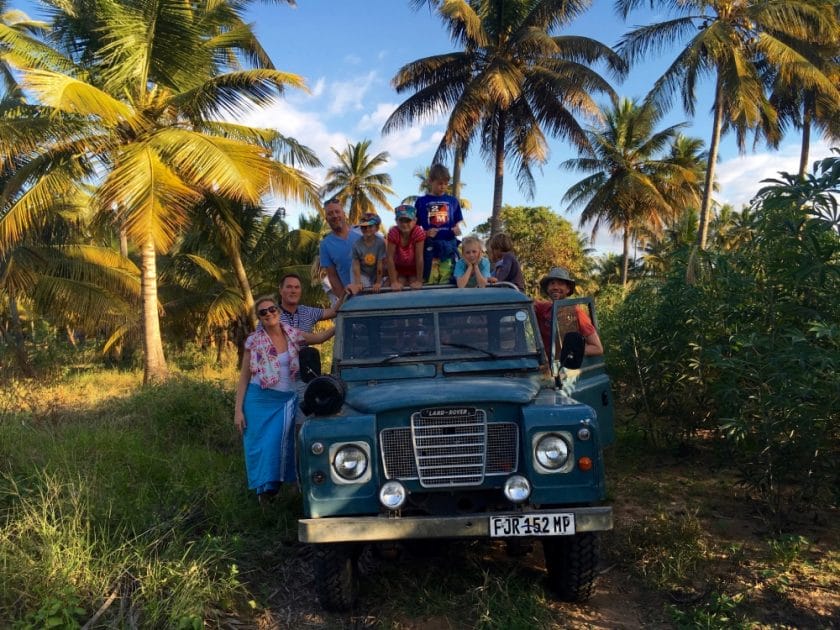
Driving in takes about seven or eight hours from Maputo, which may be a trial with traffic and poor roads. Once there, however, it’s a great place for families. There are some excellent, affordable self-catering cottages and the chance to snorkel with whale sharks.
Just be aware that the waves here can be bigger than in Vilanculos, and ocean swimming is more suited to teens than young kids.
In the far south of Mozambique lies Ponta do Ouro, undoubtedly Mozambique’s most popular family holiday town. A newly sealed road has now made Ponta much more accessible and what was once a hot and dusty 4×4-only journey is now an easy hour-and-a-half drive from Maputo.
Ponta is safe, easygoing, and loads of fun for kids. There are introductory diving courses for the older ones, plus swimming, snorkeling, and a stunning, wide beach.
Exploring the ocean as a family is one of Mozambique’s major highlights. This beautiful, warm coastline offers incredible marine life. Kids as young as ten can already learn to dive; after a four-day course, ten and 11-year-olds can be certified to 12 meters.
You’ll need to check that the area you’re visiting has suitable shallow reefs, but 12 meters is more than enough to discover the enthralling world underwater.
You’ll find turtles, dolphins, and thousands of reef fish, and with knowledgeable instructors and so much to learn, it’s an education for the whole family.
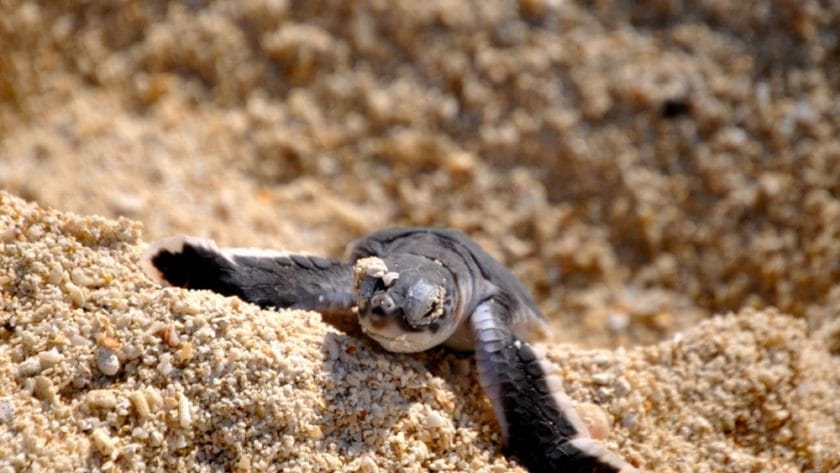
Above the waves, it’s all about dhow rides and speedboats and learning to fish from the beach in Mozambique.
Mozambique’s highlights are sea and beach orientated, including the culinary delights – this coast is famous for its fish! But if your kids don’t like seafood, there’s no reason to worry.
You’ll find plenty of kid-friendly restaurants in Mozambique and no shortage of classic favorites such as pizza, burgers, and chips.
- If you’re traveling through South Africa to Mozambique, you’ll need an unabridged birth certificate for each child younger than 18. It needs to show the full name of the child, as on their passport, and the full names of both parents.
- If one or other parent is traveling alone, then you’ll need written consent from the absent parent. It’s all a bit of a hassle, but it’s aimed at curbing child trafficking – a worthy concern that the authorities take seriously.
- Another concern is the risk of malaria – be sure to consult a doctor before you travel. June to September are the months with the lowest risk, but at any time of the year, it’s worth taking your own mosquito nets and packing a roll of duct tape to repair any holes.
Mozambique is the very vision of romance, with its endless, empty beaches, swaying palms, and turquoise sea. But what makes the country particularly special is the quality and variety of the romantic honeymoon experiences .
From private beach huts to serviced villas and secluded island retreats to polished luxury hotels, it’s all idyllic.
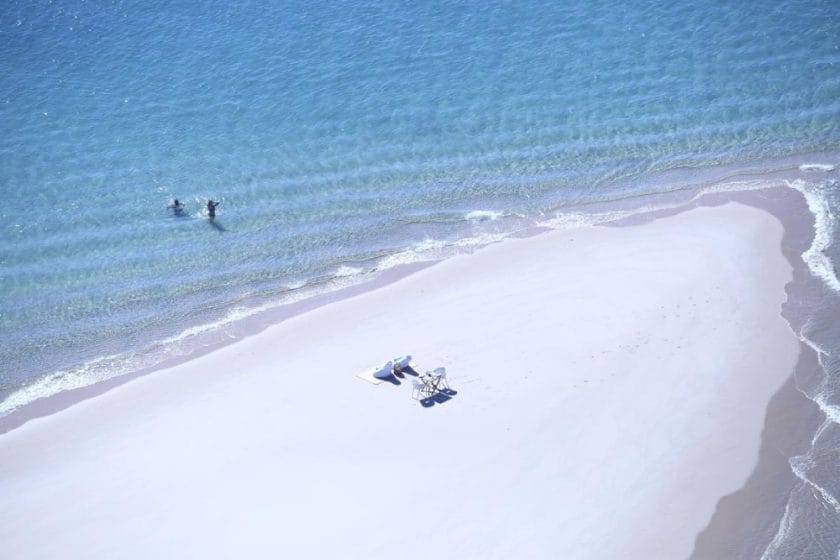
Whether you’re planning your honeymoon or plotting a more impulsive escape, you’ll find your postcard-perfect paradise in Mozambique, whatever your taste or budget.
One of Mozambique’s major draws is that a few bustling beach towns aside, it remains largely undeveloped and unexplored.
The kind of intimacy and exclusivity you might only expect on a private island can also be found on a quiet mainland beach, especially in the south of Mozambique.
The southern coastline from Ponta do Ouro to Inhaca Island is one of the most beautiful and untouched in Mozambique. Ponta do Ouro itself can be a bit rowdy for romance, but as you head north up the coast, the mood rapidly changes.
Scattered along the deserted beaches, you’ll find a handful of intimate lodges tucked between the ocean and the stunning Maputo Special Reserve.
The reserve protects not just miles of untrammeled beach but a glorious stretch of inland lakes and forest, home to elephants, hippos, and hundreds of species of birds.
Some 500km (311mi) north of Inhaca Island, the Bazaruto Archipelago also lies within a protected park. These glorious islands are perfect for couples searching for an even more exclusive romantic break.
There are only a handful of lodges across the archipelago’s five islands, all world-class, luxurious, and ideal for couples.
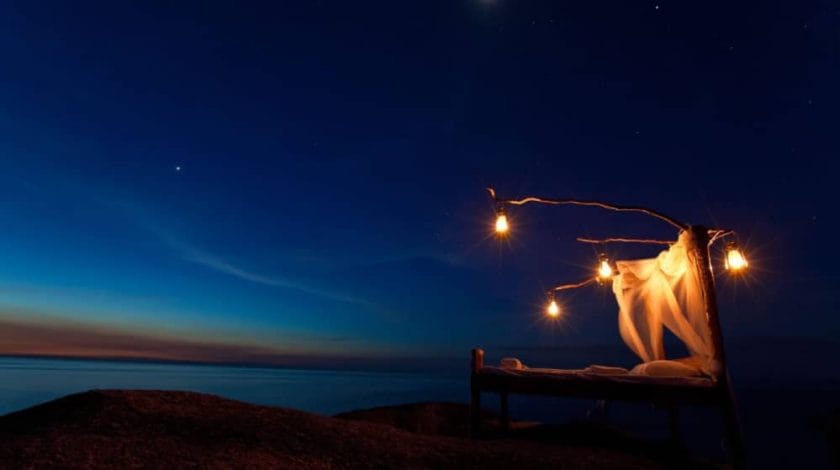
Think castaway picnics on dazzling white sandbars, candle-lit beach dinners, treatments, and spas. The waters off Bazaruto are known for spectacular diving, and if you’re feeling adventurous, there’s lots more to do than simply stretch out on the beach.
Besides diving and snorkeling, there’s also sea kayaking and sunset dhow cruises, while on land, there’s horse riding, dune boarding, and island tours.
In the far north of Mozambique, the magnificent Quirimbas Archipelago is the most isolated and arguably the most beautiful region in the country. This is the realm of stunning private islands, luxury fly-in resorts, and spectacular honeymoon escapes.
If you’ve ever dreamed of a four-poster bed on the beach, then the Quirimbas islands are for you. Or perhaps you’d prefer to explore palm-fringed atolls on a guided island-hopping safari in your own private dhow?
A Quirimbas Archipelago dhow safari is one of Mozambique’s major highlights for adventurous couples’ honeymoon.
Explore the islands with an experienced skipper and personal chef, picnicking on empty sandbars and sleeping in mobile beach camps under the stars.
For more traditional resort-style pampering, you’ll find top-notch romantic lodges, and secluded honeymoon retreats up and down the coast. And if a week-long boating safari seems a little excessive, you can easily take a day trip or a sunset dhow cruise instead.
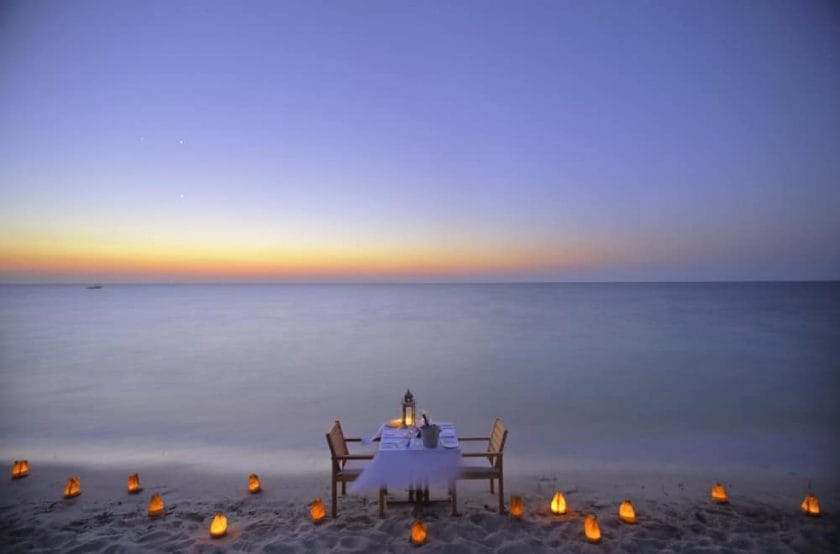
Many of Mozambique’s lodges and resorts also have a strong sustainability and conservation ethos. There’s a real emphasis on low-impact tourism, wildlife protection, and community development.
Whether you’re on an island-hopping safari or ensconced at a stunning beach lodge, there’ll be opportunities for bird-watching holidays , learning about key wildlife projects in the area, and meeting and interacting with the local community.
- Mozambique is perhaps the least conservative country in East Africa. Affection in public is generally not an issue, although topless bathing is not the norm and will almost certainly be frowned upon. Same-sex relationships have been legal in Mozambique since 2015.
- Mozambique is an excellent choice for honeymooners and romance, whether you’re looking for all-inclusive pampering, adventure, or barefoot luxury. Resorts and lodges in Mozambique are fully aware of what they can offer romantic couples – let them know in advance, and they’ll happily tailor an experience just for you!
If you’re thinking of visiting Mozambique on your own, don’t let anything dissuade you. It’s a friendly, safe choice for solo travel and can be as adventurous or laid-back as you like.
Those looking for solitude will find endless empty beaches, ideal for long, peaceful strolls. If you’d like to meet people, there are lively beach towns with restaurants, group tours, and buzzing barefoot bars.
It’s not advisable to leave valuables unattended while swimming or wander Maputo’s backstreets alone after dark. But these are the kinds of precautions you’d take almost anywhere, and infrequent petty theft aside, Mozambique is a very safe country to visit.
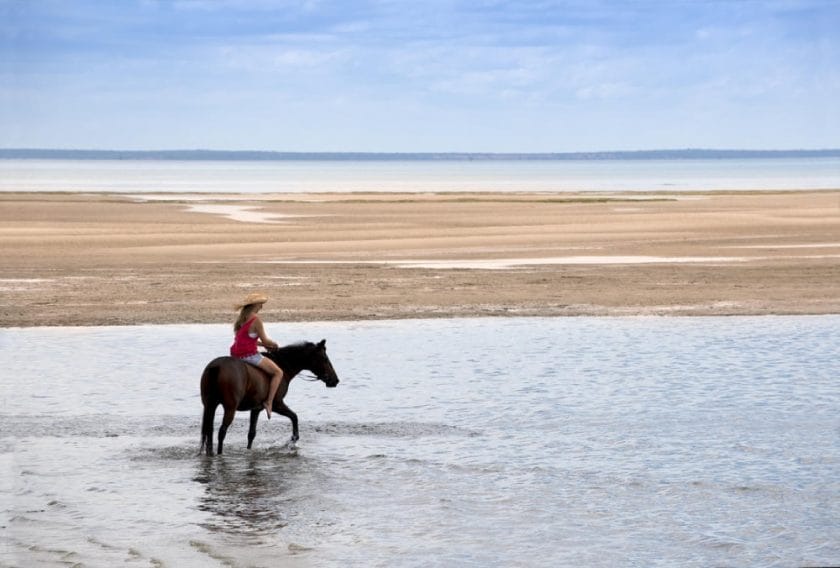
Mozambicans have a well-earned reputation for being easy-going and friendly. The seafood is delicious and affordable, and there’s a fascinating history and an incredible underwater world to explore.
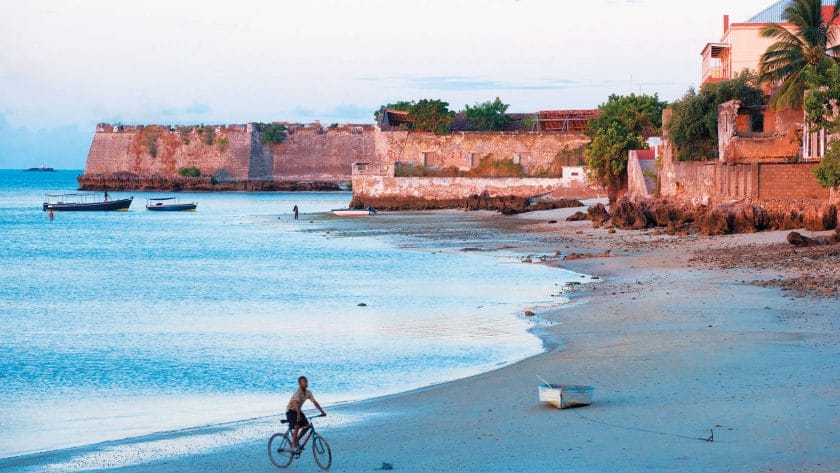
Perhaps Mozambique’s only drawback is that it can be challenging to get around. Public transport does exist, but it’s often bumpy and slow and can be challenging to figure out. The more exclusive resorts offer a seamless fly-in service, especially on the islands.
But if you’re a solo traveler, and in particular, if you’re on a budget, then bear this in mind.
The far north of Mozambique is the hardest to reach, involving relatively expensive internal flights, long, bumpy roads, or quite often, both.
If you’re feeling adventurous, you’ll discover Mozambique’s rich cultural past – the evocative, deserted mansions of Ibo Island and the 16th-century Portuguese fort and chapel on the tip of Ilha de Moçambique.
Traveling in the south is much easier than in the north. There are direct flights to Vilanculos from Maputo and Johannesburg, and busses and/or backpacker shuttles between Maputo, Vilanculos, Tofo, and Ponta do Ouro.
These main centers are the most popular destinations for solo travelers; many visitors pick just one or two spots and stick to them. Your choice will depend on ease of access and time of year, and especially on the key activities available in the area.
If you’re looking to meet people, then Vilanculos and Tofo Beach are best for your solo Mozambique holiday. They’re at their most lively over Christmas and Easter and again from the end of June to September.
June to September sees the best beach weather, and the far south usually has it better early in the season (May/June). Further north, it tends to be hotter and drier in October, and, in the far north, it usually stays hot and dry well into November.
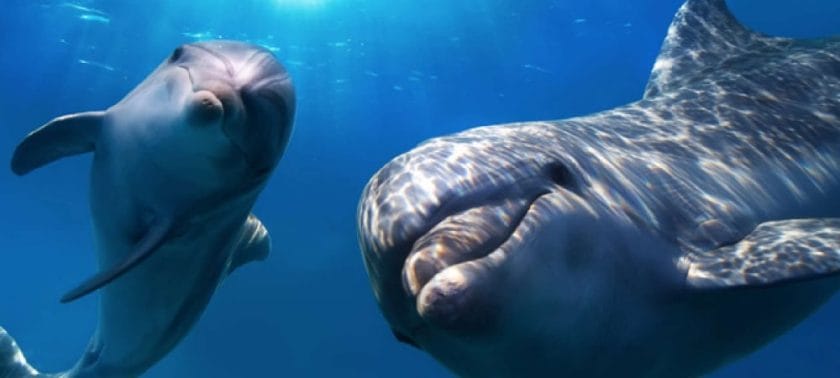
The weather is often a secondary consideration when it comes to Mozambique’s marine attractions. Snorkeling and diving with whale sharks are mind-blowing; although they can be seen year-round, October to March is best.
Another marine giant, the humpback whale, is common off the coast of Mozambique from July to mid-November. So, while October and November can be increasingly humid and cloudy in the south, it’s the perfect time to see Mozambique’s magnificent marine giants.
Turtles, dolphins, reef sharks, and manta rays can be seen along the coast year-round. But specific local areas may have subtle seasonal variations, so check with a local dive operator before you travel.
If you’re not a diver already, this is the time to learn! Mozambique has several excellent dive schools, and they’re a great way to socialize and meet new people on a solo safari.
- Be aware that outside of the main resorts, English is not widely spoken. A Portuguese phrase book or app on your phone will go a long way to easing communication.
- Credit cards (preferably Visa) are accepted at most resorts and hotels, but you’ll almost certainly need cash for smaller enterprises and local transport. In Ponta do Ouro, South African Rands are readily accepted, but the best option is to draw local currency (Meticals) from an ATM when you arrive. ATMs are common in all the main centers (although Tofo is a notable exception – the nearest one is in Inhambane).
- Mozambique is generally considered a safe country for women traveling alone. Dress codes and attitudes are less conservative than in other East African countries, and homosexuality has been legal since 2015.
What You Need To Know
Planning a trip to Mozambique involves considering several important factors to ensure a smooth and enjoyable experience. From understanding visa requirements and health precautions to knowing the best times to visit and local customs, having the right information will help you make the most of your journey. Discover Africa provides essential tips and insights to help you prepare for an unforgettable adventure in this tropical paradise.
- Wildlife in Mozambique
- When to Go to Mozambique
Most visitors, quite rightly, come to Mozambique for a beach holiday . There are hundreds of dive and snorkeling sites along this quite extraordinary coast. And besides the abundant reef fish and spectacular coral, there are also the glorious marine giants.
The soft-shelled leatherback turtle grows to over two-and-a-half meters long, and the beach town of Tofo is famous for its whale shark snorkeling and dives with manta rays.
Humpback whales can even be seen breaching from shore as they pass down the coast between June and December.
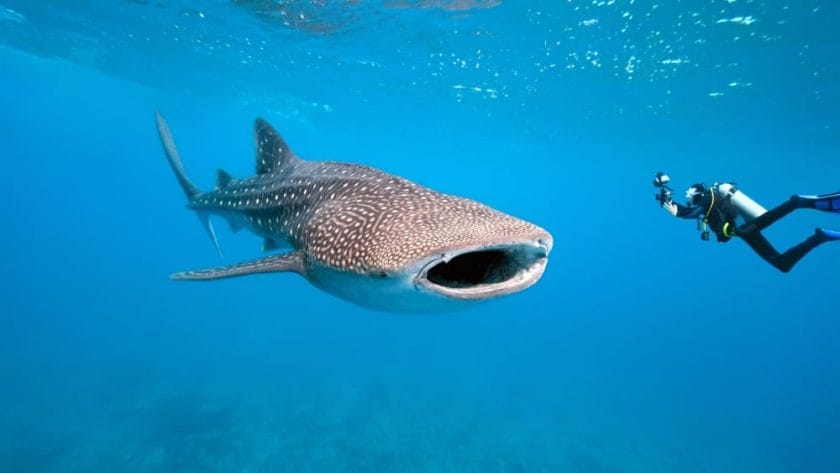
Away from the sea, the wildlife is less prolific; Mozambique’s parks and reserves suffered extensive poaching throughout the war. To some extent, the problem of poaching continues, but two reserves, in particular, are showing hopeful signs.
Gorongosa National Park was once one of the top safari parks in Africa, and although populations are still recovering, lions, elephants, and numerous antelope species can be found.
In the far south of Mozambique, the Maputo Special Reserve protects some of Mozambique’s most pristine lakes and beaches, and there’s a small but visible elephant population that calls the reserve home.

Both of these parks, and Mozambique as a whole, are truly wonderful if you like birding safaris . Pack your binoculars to see some of Mozambique’s 750 or more species – that’s 50 more species than across all of mainland Europe!
The best time to visit Mozambique is between September and November when you can witness the incredible whale migration and enjoy calm, warm weather with temperatures ranging from 27°C to 32°C.
This period offers a perfect blend of mild conditions and unique wildlife experiences, making it an ideal time for a memorable holiday.
High Season (May to October)
- Weather: The high season in Mozambique runs from May to October. During these months, the weather is warm and dry, with temperatures ranging from 20°C to 30°C (68°F to 86°F). The humidity is low, and the days are filled with sunshine, making it perfect for beach activities and outdoor adventures.
- Activities: This is the best time for sunbathing, swimming, snorkeling, and diving. The clear, calm waters provide excellent visibility for underwater activities. It’s also an ideal time for wildlife safaris in Gorongosa National Park, as the dry conditions make it easier to spot animals.
- Events: The high season includes several cultural and sporting events, such as the Mozambican Independence Day celebrations on June 25th, which feature parades, music, and dance.
Low Season (November to April)
- Weather: The low season in Mozambique spans from November to April, characterized by higher temperatures, ranging from 25°C to 35°C (77°F to 95°F), and increased humidity. This period is also the cyclone season, with January and February being the peak months for heavy rainfall and potential storms.
- Activities: Despite the wet weather, the low season is perfect for exploring the country’s interior. The landscapes are lush and green, and the waterfalls and rivers are at their most spectacular. This is also a great time for bird watching, as migratory birds arrive during the rainy season.
- Events: The low season hosts the Maputo International Music Festival in December, which showcases a variety of local and international artists.
Temperature and Rainfall
Temperatures: Mozambique enjoys a tropical climate with moderate variations throughout the year. Coastal areas are warmer, while the inland areas can be slightly cooler. The coolest months are from May to July, with average temperatures around 20°C to 25°C (68°F to 77°F).
The hottest period is from November to February, with temperatures reaching up to 35°C (95°F).
Rainfall: The wettest months are from January to March, with short, heavy showers typically occurring in the afternoon or evening. During this period, average monthly rainfall can reach up to 200 mm (7.9 inches). The driest months are from May to September, with average monthly rainfall dropping to around 20 mm (0.8 inches), offering long, sunny days perfect for beach activities.
Things to Do
Year-round activities:.
- Beach Relaxation: Enjoy the country’s stunning beaches and crystal-clear waters at any time of the year.
- Cultural Tours: Explore Mozambique’s rich cultural heritage with visits to historic sites, museums, and local markets.
- Culinary Experiences: Savor the diverse flavors of Mozambican cuisine, which blends African, Portuguese, and Arab influences.
Seasonal Activities:
- Diving and Snorkeling ( May to October ): The best underwater visibility makes this period ideal for exploring coral reefs and marine life. Dive sites in the Bazaruto and Quirimbas Archipelagos offer vibrant coral gardens, colorful fish, sea turtles, manta rays, and sometimes even whale sharks. Snorkeling in these crystal-clear waters provides an equally breathtaking experience.
- Wildlife Safaris (May to October): Cooler, dry weather provides perfect conditions for safaris in Gorongosa National Park. During these months, animals gather around waterholes, making wildlife spotting easier. Expect to see lions, elephants, hippos, antelopes, and a variety of bird species. The park’s lush scenery and diverse ecosystems enhance the safari experience.
- Bird Watching ( November to April ): The rainy season attracts a variety of migratory birds, making it a great time for bird watching. Mozambique’s wetlands, forests, and savannahs become a birdwatcher’s paradise with species such as the African fish eagle, flamingos, pelicans, and many other migratory birds. The lush, green landscapes provide a beautiful backdrop for this avian spectacle.
Best Time to Visit
- For Beaches and Water Sports: The high season (May to October) is perfect for beach lovers and water sports enthusiasts, with calm seas and clear skies.
- For Nature and Adventure: The low season (November to April) offers lush landscapes and dramatic waterfalls, ideal for nature lovers and adventurers, despite the occasional rain.
- For Cultural Experiences: Plan your visit around key cultural festivals such as Independence Day or the Maputo International Music Festival to experience Mozambique’s vibrant traditions and celebrations.
By understanding the weather patterns, seasonal activities, and unique events, you can choose the best time to visit Mozambique that aligns with your interests and ensures a memorable holiday experience.

We have 5 rating for 447 reviews
We have 4.7 rating for 35 reviews
We have 4.9 rating for 73 reviews
- Why Mozambique
Join our newsletter
Sign up to receive exclusive offers, safari inspiration, and expert tips straight to your inbox.
By proceeding you agree to our Privacy Policy and Terms & Conditions .
POPULAR DESTINATIONS
Popular tours.
- Luxury Explorers Safari in Botswana
- Romantic Cape Town & Luxury Safari
- Masai Mara and Serengeti Combo
- Wildlife and Gorillas of Rwanda
- Luxury Honeymoon in Mauritius
POPULAR ACCOMMODATIONS
- Sabi Sabi Earth Lodge
- Chobe Game Lodge
- Khwai Lediba
- Camp Okavango
- Khwai Leadwood
QUICK LINKS
- Safari Cost Estimator Tool
- [email protected]
Winter is here! Check out the winter wonderlands at these 5 amazing winter destinations in Montana
- Travel Destinations
- Africa & Middle East
The Ultimate Mozambique Travel Guide
Published: October 19, 2023
Modified: December 28, 2023
by Loutitia Yim
- Hotel Reviews
- Plan Your Trip
- Travel Guide
Introduction
Welcome to the mesmerizing country of Mozambique! Nestled in southeastern Africa, Mozambique is a hidden gem that offers a perfect blend of natural wonders, rich cultural experiences, and stunning coastline. With its pristine beaches, vibrant cities, and diverse wildlife, this country is a paradise for adventure seekers, nature lovers, and culture enthusiasts alike.
Embracing a unique African charm, Mozambique is a country that has seen its fair share of challenges and triumphs throughout its history. From the colonial era to independence, Mozambique has emerged as a resilient nation that embraces its cultural heritage while driving forward towards a promising future.
When you visit Mozambique, you will be captivated by the warmth and hospitality of the people, as well as the exquisite beauty of its landscapes. Whether you’re exploring the bustling markets of Maputo, diving into the crystal-clear waters of the Bazaruto Archipelago, or immersing yourself in the vibrant local traditions, Mozambique will leave an indelible mark on your heart and soul.
Throughout this comprehensive travel guide, we will delve into the various aspects of Mozambique, including how to get there, visa requirements, the best time to visit, top tourist destinations, cultural experiences, local cuisine, transportation options, and more. By the end of this guide, you will be equipped with all the information you need to plan your perfect trip to Mozambique.
So, pack your bags, and get ready to embark on an unforgettable journey through the breathtaking landscapes and cultural wonders of Mozambique. Experience the magic, embrace the adventure, and create memories that will last a lifetime in this enchanting African destination.
Getting to Mozambique
Mozambique is easily accessible by air, with several international airports serving the country. The main gateway is Maputo International Airport, located in the capital city of Maputo. This airport is well-connected to major cities around the world, with airlines such as South African Airways, Ethiopian Airlines, and Qatar Airways offering regular flights.
If you’re coming from neighboring countries, you can also consider flying into other airports such as Beira International Airport, Nampula International Airport, or Vilankulo Airport. These airports have scheduled flights from regional airlines, making it convenient for travelers from nearby destinations.
Another popular option is to enter Mozambique by road. The country shares borders with South Africa, Zimbabwe, Eswatini, Malawi, and Tanzania, allowing for overland travel. However, it’s important to check the travel requirements and conditions in advance, as border crossings may have specific regulations and hours of operation.
For those who prefer sea travel, Mozambique has several ports that receive cruise ships and cargo vessels. Maputo Port is the largest and busiest port in the country, offering connections to other coastal cities in southern Africa.
Once you arrive in Mozambique, it’s recommended to use local transportation options such as taxis, buses, or car rentals to navigate within the country. Taxis are readily available in major cities and towns, and it’s advisable to negotiate the fare before starting the journey. Buses are the most common mode of public transportation, connecting different regions of Mozambique. Car rentals are also popular, providing flexibility and convenience for exploring the country at your own pace.
In summary, getting to Mozambique is relatively easy, whether you choose to fly, drive, or sail. The main international airport in Maputo, along with other regional airports, provide convenient access. Additionally, road travel and sea routes offer alternative options for reaching this captivating African destination. Whichever mode of transportation you choose, get ready for an adventure-filled journey as you make your way to the magical land of Mozambique.
Visa Requirements
Before traveling to Mozambique, it’s essential to familiarize yourself with the visa requirements to ensure a smooth entry into the country. The visa regulations may vary depending on your nationality and the purpose of your visit. Here are some key points to consider:
Visa Exemption: Citizens of certain countries are exempt from obtaining a visa for tourism purposes. These include citizens of countries such as South Africa, Botswana, Mauritius, Swaziland, Tanzania, and Zambia, among others. The duration of visa-free stays varies, ranging from 30 days to 90 days. It’s important to check the specific requirements for your country of citizenship.
Visa-on-Arrival: If your country is not eligible for visa exemption, you may be able to obtain a visa upon arrival at the port of entry. However, it’s recommended to check if this option is available for your nationality, as the visa-on-arrival facility may not be available at all entry points.
Prior Visa Application: In some cases, travelers are required to apply for a visa before arriving in Mozambique. This applies to citizens of countries that do not have visa exemption or visa-on-arrival privileges. It’s essential to contact the nearest Mozambican embassy or consulate in advance to check the visa application process and requirements.
When applying for a visa, you will typically need to provide a valid passport with a minimum of six months validity, a completed visa application form, a recent passport-sized photograph, proof of accommodation in Mozambique, and proof of sufficient funds to cover your stay.
It’s important to note that visa regulations are subject to change, so it’s advisable to check with the relevant embassy or consulate before making any travel arrangements to ensure that you have the most up-to-date information.
Whether you’re visiting Mozambique for a short vacation or a longer stay, understanding the visa requirements and taking the necessary steps to obtain the appropriate visa will help ensure a stress-free entry into the country. Make sure to review the visa regulations well in advance of your trip to allow ample time for the application process if needed. With the right visa in hand, you can fully immerse yourself in the captivating beauty and culture of Mozambique.
Best Time to Visit
Mozambique’s climate is characterized by distinct wet and dry seasons, which can significantly impact the travel experience. The best time to visit Mozambique largely depends on your preferences and the activities you plan to engage in during your trip. Here’s a breakdown of the seasons and the ideal times to visit:
Dry Season (May to October): The dry season in Mozambique is considered the peak tourist season, as it offers pleasant weather, clear skies, and lower humidity levels. This season is particularly popular for beach holidays, water activities, and wildlife viewing. The months of July to September are especially ideal for diving and snorkeling, as the ocean visibility is excellent during this period. It’s important to note that this is also the high season, so popular destinations may be more crowded, and prices for accommodations and tours may be higher.
Wet Season (November to April): The wet season in Mozambique brings tropical rains and higher temperatures. While this period is considered the low season for tourism, it has its own unique appeal. The countryside flourishes with lush greenery, and wildlife sightings are more abundant. This is also a great time for birdwatching, as migratory birds flock to the wetlands. It’s worth mentioning that some lodges and resorts in coastal areas may close during the wet season, so it’s important to check availability beforehand. If you plan to visit during this time, be prepared for occasional rainfall and the possibility of some activities being disrupted.
It’s important to note that Mozambique’s coastline stretches over 1,500 miles, and the weather patterns can vary between regions. The northern coast, including destinations like Pemba and the Quirimbas Archipelago, experiences a slightly different climate compared to the southern coast, where popular spots like Maputo and Tofo Beach are located.
Ultimately, the best time to visit Mozambique depends on your personal preferences, whether you prefer the sunny and dry months or don’t mind occasional showers and want to take advantage of lower prices during the wet season. Regardless of the time of year you choose to visit, Mozambique offers a truly mesmerizing experience with its pristine beaches, diverse wildlife, and vibrant culture.
Top Tourist Destinations
Mozambique is home to a plethora of captivating destinations that showcase its natural beauty, cultural heritage, and rich history. Whether you’re a beach lover, wildlife enthusiast, or history buff, Mozambique has something to offer for every type of traveler. Here are some of the top tourist destinations to explore:
Maputo: The capital city of Mozambique, Maputo, offers a vibrant blend of colonial architecture, bustling markets, and a vibrant cultural scene. Explore the historic railway station, visit the Maputo Central Market, or stroll along the waterfront promenade. Don’t miss the chance to try mouthwatering local cuisine at one of the city’s many restaurants and cafes.
Tofo Beach: Located on the southeastern coast, Tofo Beach is a paradise for beach lovers and water sports enthusiasts. With its pristine white sands and crystal-clear waters, Tofo Beach is a popular spot for swimming, snorkeling, and diving. It’s also known for its magnificent marine life, including the chance to swim with majestic whale sharks and manta rays.
Bazaruto Archipelago: Comprised of several beautiful islands off the coast, the Bazaruto Archipelago is a paradise waiting to be explored. Offering breathtaking beaches, azure waters, and abundant marine life, this destination is a haven for snorkelers, divers, and sun-seekers. Enjoy thrilling water activities, go on a dhow sailing trip, or simply relax on the pristine beaches.
Gorongosa National Park: For wildlife enthusiasts, Gorongosa National Park is a must-visit destination. Located in central Mozambique, this park is known for its diverse ecosystems, including grasslands, forests, and savannahs. Discover an array of wildlife, including elephants, lions, buffalos, and over 400 bird species. Take guided game drives or go on a walking safari to fully immerse yourself in this natural wonderland.
Quirimbas Archipelago: Situated in northern Mozambique, the Quirimbas Archipelago is a remote and pristine paradise. Consisting of 32 islands, this archipelago offers unspoiled beaches, turquoise waters, and thriving coral reefs. Explore the historic town of Ibo Island, go snorkeling or diving in the marine reserve, or simply unwind on the secluded beaches.
These are just a few of the top tourist destinations in Mozambique, each offering its own unique charm and experiences. Whether you’re seeking relaxation, adventure, or cultural immersion, Mozambique won’t disappoint. Prepare to be enchanted by the natural wonders, warm hospitality, and vibrant atmosphere of this incredible African country.
As the capital city of Mozambique, Maputo is a vibrant and captivating destination that showcases the country’s rich cultural heritage and colonial history. This bustling city offers a unique blend of African, Portuguese, and Arab influences, creating a vibrant and diverse atmosphere that is sure to captivate visitors. Here are some highlights of what Maputo has to offer:
Historical Landmarks: Maputo is home to several notable historical landmarks that reflect its colonial past. The Maputo Railway Station, designed by Gustave Eiffel, is a must-visit architectural gem. The Polana Hotel, built in the early 20th century, is another iconic landmark that exudes old-world charm and elegance. The Fortaleza de Maputo, a fort dating back to the 18th century, offers stunning views of the city and the bay.
Local Markets: Immerse yourself in the vibrant local culture by exploring the bustling markets of Maputo. The Central Market, also known as the Mercado Municipal, is a hub of activity where vendors sell a variety of fresh produce, traditional crafts, and street food. The FEIMA Arts and Crafts Market is another popular spot to find unique souvenirs, handmade crafts, and traditional artwork.
Art and Culture: Maputo boasts a thriving art and music scene, with numerous galleries, theaters, and cultural centers to explore. The Museum of Natural History showcases Mozambique’s rich biodiversity and cultural heritage, while the National Art Museum displays an impressive collection of contemporary and traditional art. For live music and performances, the Centro Cultural Franco-Moçambicano and Gil Vicente Art Center are great venues to experience the local arts scene.
Gastronomic Delights: Maputo is a food lover’s paradise, offering a vibrant culinary scene that combines local flavors with international influences. Don’t miss the chance to try traditional Mozambican dishes such as peri-peri chicken, matapa (a dish made with cassava leaves), and grilled prawns. Maputo’s waterfront area is lined with restaurants and outdoor cafes, offering a variety of cuisines to suit every palate.
Maputo Special Reserve: Just a short drive from the city, the Maputo Special Reserve is a haven for nature enthusiasts. This protected area is home to diverse wildlife, including elephants, zebras, antelopes, and a variety of bird species. Embark on a guided safari or take a boat trip through the reserve’s mangrove forests to spot the abundance of wildlife in their natural habitat.
Maputo offers a unique juxtaposition of old-world charm and a vibrant African atmosphere. From its historic landmarks to its bustling markets and lively cultural scene, this city has a multitude of experiences to offer visitors. Immerse yourself in the vibrant energy of Maputo and discover the enchanting blend of cultures that make this city a true jewel of Mozambique.
Situated on the stunning southeastern coast of Mozambique, Tofo Beach is a true tropical paradise that attracts travelers from around the world. Famous for its pristine white sandy beaches and crystal-clear turquoise waters, Tofo Beach offers a blissful escape from the hustle and bustle of everyday life. Here’s everything you need to know about this idyllic coastal destination:
Beach Bliss: Tofo Beach boasts miles of untouched sandy shores, perfect for leisurely walks, sunbathing, or simply lounging with a good book. The warm Indian Ocean invites visitors to take a refreshing swim in its crystal-clear waters or try their hand at various water activities such as snorkeling, scuba diving, and surfing.
Diving and Snorkeling: Tofo Beach is renowned as one of the world’s best diving destinations, offering an incredible underwater world to explore. The nutrient-rich waters attract a diverse array of marine life including manta rays, whale sharks, turtles, and colorful coral reefs. Whether you’re a seasoned diver or a beginner snorkeler, Tofo Beach offers unforgettable encounters with the marine wonders of Mozambique.
Whale Shark Encounters: Tofo Beach is famous for its close encounters with whale sharks, the gentle giants of the ocean. These magnificent creatures can often be spotted during their feeding season, which takes place from October to March. Join a guided tour or take a boat trip to observe these majestic creatures up close and personal, creating memories that will last a lifetime.
Local Fishing Village: Tofo Beach is not only a pristine coastal paradise but is also home to a vibrant local fishing village. Immerse yourself in the local culture by visiting the village and witnessing the traditional fishing practices. You can even sample freshly caught seafood in the local restaurants, where grilled prawns and fish dishes are specialties not to be missed.
Relaxed Atmosphere: Tofo Beach has managed to retain its laid-back and authentic atmosphere despite its growing popularity. The beach town offers a range of accommodation options, from budget-friendly guesthouses to eco-lodges and luxury beachfront resorts. Enjoy a slow pace of life, unwind with sunset cocktails on the beach, and savor the tranquility of this seaside haven.
Tofo Beach is a tropical paradise that offers the perfect blend of relaxation, adventure, and natural beauty. Whether you’re seeking thrilling water activities, exploring vibrant marine life, or simply finding solace in the sun-kissed beaches, Tofo Beach is sure to leave you with unforgettable memories and a longing to return to its enchanting shores.
Bazaruto Archipelago
The Bazaruto Archipelago, located off the coast of Mozambique, is a pristine and unspoiled destination that promises a true tropical paradise experience. Comprised of a group of idyllic islands, this archipelago is renowned for its breathtaking beauty, turquoise waters, and diverse marine life. Here’s a glimpse into what makes the Bazaruto Archipelago a must-visit destination:
Unspoiled Beaches: The islands of the Bazaruto Archipelago are adorned with pristine, powdery white sand beaches that stretch as far as the eye can see. Fringed by turquoise waters, these picture-perfect beaches offer a tranquil haven to relax, soak up the sun, and enjoy the gentle lapping of the waves.
Marine Diversity: The Bazaruto Archipelago is a marine conservation area and a playground for underwater enthusiasts. Whether you are a snorkeler or a scuba diver, the archipelago’s crystal-clear waters and vibrant coral reefs provide an awe-inspiring underwater experience. Swim alongside colorful tropical fish, encounter graceful manta rays, and witness the majestic beauty of endangered dugongs.
Island Hopping: Explore the islands of the archipelago by embarking on an unforgettable island-hopping adventure. Discover the largest island, Bazaruto, with its towering sand dunes and freshwater lakes. Head to Benguerra Island for its diverse ecosystems, ranging from lush forests to expansive dune systems. Take a trip to Magaruque Island to relax on its pristine beaches and enjoy breathtaking sunsets.
Water Sports and Activities: The Bazaruto Archipelago offers an array of water sports for thrill-seekers. Engage in activities such as kayaking, wakeboarding, and kiteboarding. Alternatively, set off on a traditional dhow boat and sail through the archipelago’s azure waters, experiencing the true essence of the Mozambican coastline.
Exquisite Seafood: Indulge in the archipelago’s culinary delights, which are centered around freshly caught seafood. Delight your taste buds with succulent prawns, delectable fish dishes, and mouthwatering lobster. The local restaurants offer a variety of options to savor the flavors of the sea.
Luxurious and Eco-Friendly Lodges: The Bazaruto Archipelago offers a range of accommodation options, from luxurious resorts to eco-friendly lodges. Choose from private island getaways, exclusive lodges nestled in the dunes, or beachfront villas that seamlessly blend with the natural surroundings. Experience the ultimate in relaxation and comfort while enjoying the archipelago’s breathtaking landscapes.
The Bazaruto Archipelago is a true tropical paradise that offers an escape from the hustle and bustle of everyday life. With its untouched beauty, vibrant marine life, and luxurious lodges, it promises an unforgettable experience that will leave you yearning to return to its tranquil shores.
Gorongosa National Park
Gorongosa National Park, nestled in the heart of Mozambique, is a captivating and diverse wilderness that showcases the country’s rich biodiversity and natural beauty. Renowned as one of Africa’s greatest wildlife restoration stories, this park offers a unique safari experience that is sure to leave a lasting impression. Here’s a closer look at what makes Gorongosa National Park a must-visit destination:
Abundant Wildlife: Gorongosa National Park is home to an incredible array of wildlife, making it a haven for nature enthusiasts and wildlife photographers alike. Embark on game drives with experienced guides to spot lions, elephants, buffalos, zebras, hippos, and a variety of antelope species. Keep your eyes peeled for the park’s predators, including leopards and hyenas.
Diverse Ecosystems: The diversity of ecosystems within Gorongosa National Park adds to its allure. From lush grasslands to dense forests and winding river systems, each setting offers a unique backdrop for wildlife encounters. Explore the park’s different regions, from the vast floodplains of the Zambezi River to the mountainous landscapes of the Cheringoma Plateau.
Walking Safaris: For an immersive and intimate experience, partake in a walking safari within Gorongosa National Park. Accompanied by trained guides, venture out on foot and discover the hidden wonders of the bush. Engage your senses as you learn about the park’s flora, fauna, and the intricate relationships that exist within this vibrant ecosystem.
Birdwatching: Gorongosa National Park is a paradise for birdwatchers, with over 400 bird species recorded within its boundaries. From colorful kingfishers to majestic raptors, bird enthusiasts will be amazed by the variety and beauty of the avian residents. Keep an eye out for the stunningly vibrant Lilac-breasted Roller and the African Fish Eagle.
Community Conservation: Gorongosa National Park is committed to community-based conservation initiatives, which involve local communities in the preservation and sustainable use of natural resources. Engage with community-led projects, visit the nearby villages, and learn about the rich cultural heritage of the people living in harmony with the park’s wildlife.
Educational Experiences: Gorongosa National Park offers educational programs and opportunities for visitors to learn about the park’s conservation efforts and restoration initiatives. Discover the park’s fascinating history, from its establishment in the 1960s to its more recent restoration efforts that have revitalized the ecosystem after years of conflict.
With its abundant wildlife, diverse ecosystems, and commitment to conservation, Gorongosa National Park has firmly established itself as one of Africa’s premier safari destinations. This hidden gem in the heart of Mozambique offers an unforgettable safari experience that combines breathtaking natural beauty with impactful conservation efforts.
Quirimbas Archipelago
The Quirimbas Archipelago, located along the northern coast of Mozambique, is a hidden gem waiting to be explored. Comprising 32 islands scattered along the Indian Ocean, this archipelago boasts pristine white sandy beaches, crystal-clear turquoise waters, and a rich cultural heritage. Here’s a closer look at what makes the Quirimbas Archipelago a truly enchanting destination:
Tropical Paradise: The Quirimbas Archipelago is a tropical paradise that offers unspoiled beauty and a tranquil escape from the hustle and bustle of everyday life. The islands are characterized by palm-fringed beaches, azure waters, and vibrant coral reefs, creating a breathtaking backdrop for relaxation and exploration.
Magical Marine Life: The archipelago is a mecca for marine enthusiasts, with its thriving coral reefs and abundant marine life. Snorkel or dive in the crystal-clear waters to discover a vibrant underwater world teeming with colorful fish, turtles, dolphins, and even the occasional dugong. The Quirimbas Archipelago is a true haven for those seeking unparalleled snorkeling and diving experiences.
Remote and Secluded: The remote nature of the Quirimbas Archipelago ensures a sense of exclusivity and seclusion. With fewer tourists compared to other destinations, you can enjoy peaceful beach walks, private picnics on deserted islands, and the feeling of having paradise all to yourself.
Cultural Heritage: Beyond its natural beauty, the Quirimbas Archipelago is steeped in a rich cultural heritage. Local communities residing on some of the islands have retained their traditional way of life, offering a glimpse into the fascinating history and traditions of the region. Engage with the local people, witness their craftsmanship, and learn about their customs and traditions.
Island Hopping: Embark on an island-hopping adventure to explore the diverse islands of the Quirimbas Archipelago. Each island has its own unique charm and character. From Ibo Island with its historic architecture and vibrant markets to Medjumbe Island with its luxurious resorts and pristine beaches, the archipelago offers a variety of experiences for every type of traveler.
Water Sports and Activities: The Quirimbas Archipelago provides a playground for an array of water sports and activities. Kayaking, paddleboarding, windsurfing, and sailing are just a few of the options available. Set out on excursions for fishing trips, traditional dhow cruises, or even take part in seasonal whale watching.
The Quirimbas Archipelago is a paradise waiting to be discovered in Mozambique. Its untouched beauty, vibrant marine life, rich cultural heritage, and opportunities for relaxation and adventure create an experience that is nothing short of magical. Whether you seek moments of tranquility on the beach or thrilling underwater encounters, the Quirimbas Archipelago is sure to leave you with memories that will last a lifetime.
Cultural Experiences
Exploring the rich cultural heritage of Mozambique is a journey that offers a remarkable insight into the traditions, history, and diverse ethnic groups that shape this vibrant nation. From traditional rituals to local craftsmanship, Mozambique is a treasure trove of cultural experiences that are sure to leave a lasting impression. Here are some captivating cultural experiences to immerse yourself in during your visit:
Traditional Music and Dance: Mozambique is known for its lively music and vibrant dance traditions. Delve into the energetic rhythms of Marrabenta and the soulful beats of Timbila music while witnessing the graceful movements of traditional dancers. Join in the merriment at local festivities and celebrations, where music and dance take center stage in showcasing the country’s cultural identity.
Art and Handicrafts: Mozambique is a haven for artisans and craftsmen who create intricate works of art using traditional techniques and materials. Explore bustling markets and artisans’ workshops to discover beautifully crafted woodcarvings, intricately woven baskets, colorful textiles, and unique pottery. Don’t miss the opportunity to support local artisans by purchasing their handcrafted souvenirs as a memento of your time in Mozambique.
Visiting Local Villages: One of the best ways to experience Mozambique’s culture is by visiting local villages. Engage with the warm and welcoming local communities, learn about their customs and way of life, and gain insights into their daily activities such as fishing, farming, and cooking. Participate in community-led initiatives or guided tours that offer an authentic glimpse into the traditions and livelihoods of Mozambique’s diverse ethnic groups.
Historical Sites: Mozambique’s history is marked by a rich tapestry of influences, from its colonial past to its struggle for independence. Explore the historical sites that narrate this story, such as the Island of Mozambique, a UNESCO World Heritage Site that was once the capital of Portuguese East Africa. Visit the museums and cultural centers in major cities like Maputo and Beira to gain a deeper understanding of the country’s complex history and cultural evolution.
Traditional Festivals: Mozambique celebrates a variety of traditional festivals throughout the year, providing a unique opportunity to witness local customs and traditions. The Festival of the Mozambican Heroes in Maputo, the Festival of the Mueda Resistance, and the Marrabenta Festival are just a few examples of vibrant celebrations that showcase the country’s cultural diversity and pride.
Embracing cultural experiences in Mozambique allows you to connect with the heart and soul of the country. From music and art to interacting with local communities and exploring historical sites, each encounter offers a deeper appreciation for Mozambique’s rich cultural tapestry. Immerse yourself in the warmth and hospitality of the people, and let the cultural heritage of Mozambique inspire and uplift you throughout your journey.
Local Cuisine
Mozambican cuisine is a delicious fusion of flavors that draws inspiration from its African, Portuguese, Arab, and Indian influences. Experiencing the local cuisine is an essential part of immersing yourself in the vibrant culture and traditions of Mozambique. From mouthwatering seafood dishes to unique spice blends, here are some highlights of the delectable local cuisine:
Peri-Peri Chicken: One of Mozambique’s most famous dishes is peri-peri chicken, marinated in a fiery blend of spices including peri-peri chili peppers. Grilled to perfection, this dish is known for its bold and spicy flavors that will tantalize your taste buds. Enjoy it with a side of piri-piri sauce for an extra kick.
Prawns and Seafood: With its long coastline, Mozambique is renowned for its fresh and succulent seafood. Grilled prawns, calamari, lobster, and a variety of fish dishes are local favorites. Indulge in the abundance of seafood delicacies served in coastal restaurants, allowing the flavors of the ocean to transport you to gastronomic bliss.
Matapa: Matapa is a traditional Mozambican dish made from cassava leaves cooked with peanut sauce, garlic, coconut milk, and spices. Often served with rice or cornmeal, this dish offers a unique combination of flavors and textures that showcases the country’s culinary traditions.
Chamuças: Chamuças, resembling Indian samosas, are a popular street food in Mozambique. These crispy pastries are filled with a savory mixture of vegetables, meat, and spices. Enjoy them as a snack or appetizer to experience a delightful blend of influences from the Indian subcontinent.
Feijoada: Influenced by Portuguese cuisine, feijoada is a hearty and flavorsome stew made with black beans, various cuts of meat, and spices. Served with rice or farofa (toasted manioc flour), this dish is often enjoyed during festive occasions and gatherings with family and friends.
Cashews and Cashew Liquor: Mozambique is one of the world’s largest producers of cashew nuts, and this nut is used in a variety of dishes and snacks. Taste roasted cashews as a crunchy snack or try cashew liquor, a sweet and creamy spirit that is a popular local beverage.
When dining in Mozambique, be sure to complement your meal with the local Mozambican beer, such as 2M or Laurentina, or indulge in a refreshing glass of tamarind or coconut water to quench your thirst.
The diverse and flavorful cuisine of Mozambique reflects the country’s cultural heritage and provides an opportunity to indulge in a culinary adventure. From the spicy flavors of peri-peri chicken to the aromatic aromas of traditional stews, Mozambican cuisine will leave your taste buds craving for more.
Language and Communication
Mozambique is a linguistically diverse country, with numerous languages spoken throughout its various regions. Understanding the local languages and communication customs can greatly enhance your travel experience and facilitate interactions with the warm and friendly people of Mozambique. Here’s an overview of the languages and communication practices in the country:
Official Language: The official language of Mozambique is Portuguese. This is a relic from the country’s colonial past, as Mozambique was once a Portuguese colony. Portuguese is widely spoken and understood, particularly in urban areas, government offices, and tourist hotspots. English is also spoken to some extent in major cities and tourist areas, although proficiency levels may vary.
Local Languages: Mozambique is home to numerous Bantu languages, which are spoken by different ethnic groups across the country. Some of the major local languages include Shangaan, Sena, Makhuwa, and Manyika. While it may not be necessary for travelers to learn these languages, knowing a few basic phrases in the local dialect can go a long way in showing respect and fostering connections with the local communities.
Non-Verbal Communication: Non-verbal communication plays an important role in Mozambican culture. Handshakes are the customary form of greeting, although it may be more common in urban areas than in rural villages where locals may greet each other with a hug or kiss on the cheek. It is also important to maintain eye contact while communicating, as it signals interest and respect.
Cultural Sensitivities: Mozambique is a culturally diverse country, and it’s important to be mindful of local customs and sensitivities. Modesty in dress is generally appreciated, especially when visiting religious sites or rural areas. It’s polite to ask for permission before taking someone’s photograph, particularly elders or people of authority. Remember to be respectful of local traditions and customs, such as removing your shoes when entering someone’s home or a place of worship.
Translation Resources: Carrying a Portuguese phrasebook or a language translation app can be helpful for basic communication and navigating everyday situations. While there may be language barriers in some remote areas, the friendly and hospitable nature of the Mozambican people often bridges the communication gap.
By embracing the local language and communication customs, you have the opportunity to connect with the vibrant culture of Mozambique on a deeper level. While knowing Portuguese is advantageous, even a few basic phrases and a willingness to learn can open doors and create meaningful interactions during your journey through this diverse and captivating country.
Transportation within Mozambique
Getting around Mozambique is an adventure in itself, with various transportation options available to navigate the vast landscapes and diverse regions of the country. Whether you prefer the convenience of air travel or the immersive experience of road trips, here are some transportation options to consider when exploring Mozambique:
Domestic Flights: Mozambique has several domestic airports, making air travel an efficient option for covering long distances. The national carrier, LAM Mozambique Airlines, operates flights between major cities such as Maputo, Beira, Nampula, and Pemba. Smaller regional airlines also provide flights to destinations like Vilankulo, Quelimane, Tete, and more. Domestic flights offer convenient connections and the opportunity to save time when traveling between different regions.
Public Buses: Public buses are the most common mode of transportation within Mozambique, offering both short-distance and long-distance travel options. Buses connect major cities and towns, providing an affordable and relatively reliable means of transportation. However, be prepared for bus travel to be slower due to frequent stops and potentially crowded conditions. It’s advisable to check the schedules and book tickets in advance, especially during peak travel seasons.
Taxis and Minibuses: Within cities and towns, taxis and minibuses are a popular mode of transport for shorter distances. In urban areas like Maputo and Beira, metered taxis are available, while in smaller towns, shared minibuses known as “chapas” are a common sight. Negotiate the fare in advance when taking a taxi, and be prepared for minibuses to be crowded. Taxis and minibuses may not always adhere to strict schedules, so it’s wise to factor in extra travel time.
Rental Cars: Renting a car provides the freedom to explore Mozambique at your own pace, especially in more remote or less serviced areas. Major cities and towns have car rental services available, offering a variety of vehicles to suit your needs. However, it’s essential to be aware of the varying road conditions, including potholes and rough terrain, as well as local driving customs and road rules.
Boat and Ferry Services: With its extensive coastline and numerous islands, boat and ferry services are common in coastal and lakeside areas. Ferries operate along the major rivers and lakes, providing transportation to island destinations such as Ibo, Inhaca, and Ilha de Moçambique. Boat charters and dhow cruises are also options for exploring the coast and enjoying water-based activities.
Bicycle and Walking: In smaller towns and more rural areas, bicycles and walking are viable modes of transportation for shorter distances. Renting a bicycle offers an eco-friendly way to explore local communities and enjoy the scenic beauty of Mozambique. Walking is also a great way to immerse yourself in the vibrant surroundings, interact with locals, and discover hidden gems in the towns and countryside.
When traveling within Mozambique, it’s important to be flexible, patient, and open to new experiences. Some modes of transportation may have limited schedules and availability, especially in remote areas. It’s advisable to plan ahead, keep contingency time, and inquire about local transport options at your accommodation or from reliable sources. By embracing the various transportation options, you can embark on an unforgettable journey through the diverse landscapes and vibrant culture of Mozambique.
Health and Safety Tips
When traveling to Mozambique, it’s essential to prioritize your health and safety to ensure a smooth and enjoyable trip. Here are some important health and safety tips to keep in mind during your visit:
Vaccinations and Health Precautions: Prior to visiting Mozambique, it’s recommended to consult a healthcare professional or travel clinic regarding necessary vaccinations. Common vaccinations to consider include hepatitis A and B, typhoid, cholera, rabies, and yellow fever. Additionally, malaria is prevalent in some parts of Mozambique, so it’s important to take necessary precautions, such as using mosquito repellent, wearing protective clothing, and taking antimalarial medication as prescribed.
Safe Drinking Water: To avoid waterborne illnesses, it’s advisable to drink bottled or filtered water while in Mozambique. Avoid consuming tap water, and use bottled water for brushing teeth and washing fruits and vegetables. Be cautious when consuming street food and ensure it is prepared and cooked hygienically.
Travel Insurance: It’s essential to have comprehensive travel insurance that covers medical expenses, trip cancellations, and emergency evacuations. Ensure that the insurance policy provides sufficient coverage for the activities you plan to engage in, such as adventure sports or wildlife encounters.
Personal Safety: While Mozambique is generally a safe destination, it’s important to remain vigilant and take necessary precautions. Avoid displaying wealth, keep valuable belongings secure, and be aware of your surroundings, especially in crowded areas or at night. Use reliable transportation services and adhere to instructions from local authorities or guides when exploring remote areas.
Weather Awareness: Mozambique’s climate can vary, so it’s important to check the weather conditions before your trip and pack appropriate clothing. Be prepared for sudden changes in weather, such as heavy rains or extreme heat. In coastal areas, pay attention to tides and sea conditions, and follow guidance from lifeguards or local authorities when engaging in water activities.
Sun Protection: Mozambique’s sun can be intense, so it’s essential to protect yourself from the harmful effects of the sun. Wear sunscreen with a high SPF, a hat, sunglasses, and lightweight, breathable clothing to shield yourself from excessive sun exposure. Stay hydrated by drinking plenty of water throughout the day.
Respect Local Customs and Traditions: Mozambique has a rich cultural heritage, and it’s important to respect local customs and traditions. Dress modestly when visiting religious sites or rural areas, and always ask for permission before taking photographs of individuals, especially elders or people of authority. Be mindful of cultural sensitivities and engage with local communities in a respectful manner.
By prioritizing health and safety during your visit to Mozambique, you can fully enjoy the country’s natural wonders, vibrant culture, and warm hospitality. Be prepared, take necessary precautions, and embrace the adventure that awaits in this enchanting African destination.
Currency and Money Matters
When traveling to Mozambique, it’s important to familiarize yourself with the local currency and money matters to ensure a smooth financial experience during your trip. Here are some key points to keep in mind:
Currency: The currency of Mozambique is the Mozambican Metical (MZN). Notes are available in denominations of 20, 50, 100, 200, 500, and 1000 meticais, while coins come in smaller denominations of 1, 2, 5, and 10 meticais. It’s advisable to carry a mix of smaller and larger denominations for convenience.
Exchange Rate: The exchange rate for the Mozambican Metical can fluctuate, so it’s recommended to check the current rates before your trip. Major hotels, banks, and exchange offices in larger cities offer currency exchange services. It’s often more convenient to exchange foreign currency into meticais upon arrival in Mozambique.
ATMs and Credit Cards: ATM machines are available in major cities and tourist areas, allowing you to withdraw meticais using international debit or credit cards. However, it’s advisable to inform your bank in advance about your travel plans to ensure your cards will work abroad. Credit cards, especially Visa and Mastercard, are accepted in some hotels, restaurants, and larger establishments in urban areas.
Cash vs. Cards: While credit cards and debit cards are accepted in some places, it’s important to note that cash is still widely used in Mozambique, especially in smaller towns and remote areas. It’s advisable to carry a sufficient amount of meticais, especially when traveling outside major cities, as some establishments may not accept cards or have limited card payment facilities.
ATM Availability and Limitations: ATMs can be found in major cities and tourist areas, but their availability can be limited in more remote regions. It’s advisable to withdraw cash in larger cities or towns before heading to rural areas. ATMs may have transaction limits, so plan accordingly and ensure you have sufficient cash for your needs.
Tipping: Tipping is not mandatory in Mozambique, but it’s customary to tip for good service in restaurants, hotels, and for other services provided. Tips are typically given in cash, and it’s a gesture of appreciation for quality service. The amount you tip is at your discretion, but it’s common to leave around 10% of the total bill.
Safety and Security: Ensuring the safety of your money is important while traveling. It’s wise to keep a mix of cash and cards, storing them in separate and secure locations. Be cautious and aware of your surroundings when making cash transactions or using ATMs. It’s advisable to use ATMs located in well-lit and secure areas.
By familiarizing yourself with the local currency and money matters, you can navigate Mozambique’s financial landscape with confidence. Utilize a combination of meticais, cards, and secure financial practices to ensure a hassle-free and enjoyable trip.
Accommodation Options
Mozambique offers a wide range of accommodation options to suit every traveler’s preferences and budget. Whether you’re seeking luxury beach resorts, eco-lodges nestled in nature, or budget-friendly guesthouses, Mozambique has something for everyone. Here are some popular accommodation options to consider:
Luxury Resorts and Lodges: Mozambique boasts a stunning coastline and pristine islands, making it a haven for luxury beach resorts and lodges. From private villas with ocean views to exclusive lodges nestled amidst lush landscapes, these high-end accommodations offer unparalleled comfort, impeccable service, and a range of amenities such as swimming pools, fine dining, spa facilities, and access to exclusive beachfronts.
Eco-Lodges and Retreats: For those seeking a more sustainable and immersive experience, eco-lodges and retreats are available in various locations across Mozambique. These accommodations are designed to minimize environmental impact while providing comfortable and eco-friendly lodging options. Enjoy being surrounded by nature, with opportunities for birdwatching, nature walks, and learning about local conservation efforts.
Guesthouses and Bed & Breakfasts: Guesthouses and bed & breakfasts offer a more intimate and personalized experience. Run by friendly hosts, these accommodations provide affordable and comfortable lodging options, often with shared amenities. Guesthouses can range from charming colonial-style homes to rustic beachfront cottages, and are a great way to connect with local communities and experience Mozambican hospitality.
Hotels and Lodges: In major cities and tourist destinations, you’ll find a range of hotels and lodges catering to different budgets and tastes. From budget-friendly hotels to mid-range lodges, these accommodations provide comfortable rooms, essential amenities, and convenient locations. They are often found in urban areas, providing easy access to attractions, restaurants, and transportation hubs.
Camping and Self-Catering: For adventure enthusiasts or those seeking a more budget-friendly option, Mozambique offers campsites and self-catering accommodations. Campsites are available in national parks and coastal areas, allowing you to immerse yourself in nature while enjoying basic facilities and the flexibility of outdoor living. Self-catering accommodations, such as holiday cottages or beach houses, provide the convenience of cooking your meals and offer more autonomy during your stay.
Community-Based Accommodations: Mozambique also offers community-based accommodations, allowing you to stay with local families or in community-run lodges. Engage with the local communities, learn about their customs and traditions, and support sustainable tourism initiatives. These accommodations provide an immersive cultural experience and an opportunity to contribute directly to local development.
Wherever you choose to stay in Mozambique, make sure to book in advance, especially during peak travel seasons, to secure your preferred accommodation. Consider the location, amenities, and price range that align with your travel preferences. With the diverse range of accommodation options available, you’re sure to find the perfect place to relax and unwind as you explore the wonders of Mozambique.
Shopping and Souvenirs
Shopping in Mozambique is an opportunity to discover unique treasures and bring home a piece of the country’s vibrant culture and heritage. From traditional crafts to local products, Mozambique offers a variety of shopping experiences. Here’s a guide to shopping and finding the perfect souvenirs:
Traditional Crafts: Mozambique is renowned for its traditional crafts, reflecting the country’s rich cultural diversity. Explore local markets and shops to find beautifully handcrafted items such as wooden sculptures, woven baskets, colorful textiles, pottery, and beaded jewelry. These unique pieces make for meaningful souvenirs that support local artisans and carry a piece of Mozambique’s cultural heritage.
Local Products: Mozambique is known for its unique local products that make for excellent souvenirs. Look for products made from cashew nuts, such as cashew liquor, roasted cashews, or cashew-based sweets. Other local products to consider include traditional fabric called capulana, flavorful spices, traditional wooden instruments, and locally produced honey or coffee.
Artwork and Paintings: Mozambique has a vibrant art scene, with talented local artists showcasing their work in galleries and markets. Consider purchasing paintings, sculptures, or prints by Mozambican artists, which can add a touch of creativity and vibrancy to your home or office. Look for artworks that depict Mozambique’s landscapes, wildlife, or cultural traditions.
Market Shopping: The bustling markets of Mozambique provide a lively and authentic shopping experience. Explore local markets such as the Central Market in Maputo or the Feira de Artesanato e Gastronomia in Inhambane. These markets offer a wide array of products, from fresh produce and spices to traditional crafts and colorful fabrics. Remember to practice your bargaining skills as prices can often be negotiated.
Fair Trade and Community Initiatives: For ethically sourced and fair trade products, seek out shops and cooperatives that support local communities and initiatives. These stores often carry handmade crafts and products created through sustainable practices, ensuring that your purchase directly benefits the local artisans and communities.
Currency and Bargaining: It’s advisable to carry enough cash when shopping in Mozambique as some smaller shops and markets may not accept credit cards. The local currency, Mozambican Metical (MZN), is the most commonly accepted form of payment. When bargaining, it’s common practice to negotiate the price, especially in markets. Remember to be respectful and approach the bargaining process with a friendly and lighthearted attitude.
When shopping in Mozambique, be mindful of customs regulations and avoid purchasing items made from protected or endangered wildlife species. Check the official regulations, and only purchase souvenirs from reputable sources that adhere to sustainable practices.
Shopping in Mozambique offers a chance to support local artisans, discover unique handcrafted items, and explore the country’s vibrant cultural heritage. With a wide array of products and markets to explore, you’re sure to find the perfect souvenirs to commemorate your time in this captivating African country.
Mozambique is a country that mesmerizes with its untamed natural beauty, cultural richness, and warm hospitality. From the pristine beaches of Tofo and the magical islands of the Bazaruto and Quirimbas Archipelagos to the diverse wildlife of Gorongosa National Park and the cultural wonders of Maputo, Mozambique offers an unforgettable travel experience.
Throughout this comprehensive guide, we have explored the various aspects of Mozambique, including popular tourist destinations, cultural experiences, local cuisine, transportation options, and more. We have delved into the country’s history, encouraged sustainable travel practices, and provided insights into health and safety considerations.
Whatever your interests may be – whether you seek relaxation on sandy beaches, adventure in nature, cultural immersion, or a blend of everything – Mozambique has something to offer. The country’s rich heritage, vibrant markets, friendly locals, and diverse landscapes make for a truly unforgettable journey.
As you embark on your Mozambique adventure, remember to be respectful of local customs and traditions, practice responsible tourism, and immerse yourself in the natural and cultural wonders that await. From the moment you step foot in Mozambique, you’ll feel its magic and experience the warmth of its people.
So, pack your bags, set off on an exploration of Mozambique’s hidden gems, and create memories that will last a lifetime. As you witness breathtaking sunsets, encounter majestic wildlife, taste flavorful cuisine, and connect with the diverse cultures, you’ll find yourself falling in love with the splendors of this captivating African destination.

- Privacy Overview
- Strictly Necessary Cookies
This website uses cookies so that we can provide you with the best user experience possible. Cookie information is stored in your browser and performs functions such as recognising you when you return to our website and helping our team to understand which sections of the website you find most interesting and useful.
Strictly Necessary Cookie should be enabled at all times so that we can save your preferences for cookie settings.
If you disable this cookie, we will not be able to save your preferences. This means that every time you visit this website you will need to enable or disable cookies again.

5 Reasons to Visit Mozambique
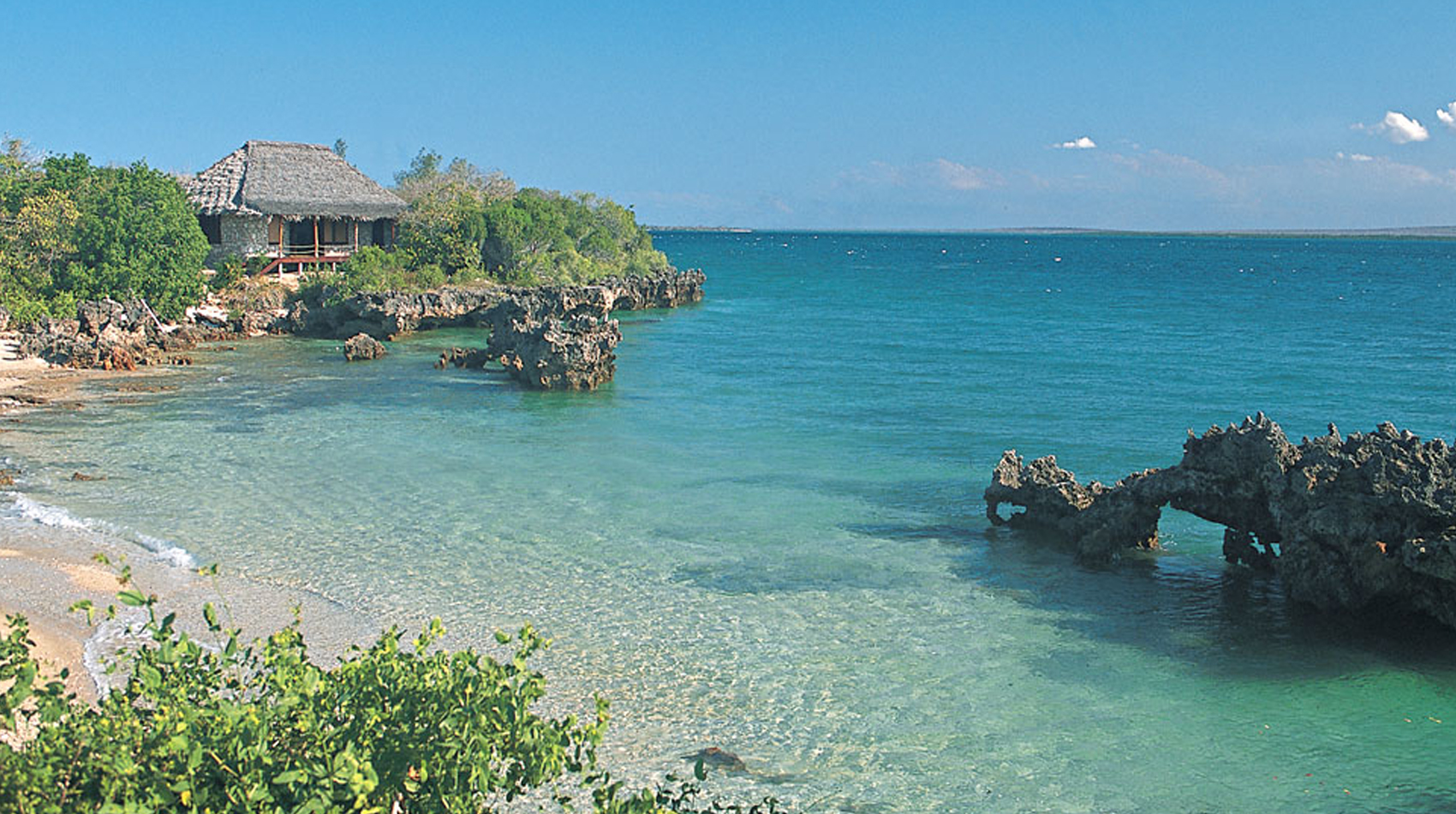
The magnificence and allure of the coastline along the Indian Ocean is a compelling reason why you should visit Mozambique Africa.
The coastline is characteristic of calm islands and historic settlements. You can experience a safari on Niassa Reserve, traditional silversmithing on Ibo, and snorkelling amid colourful reef fish at Bazaruto.
You could also take in the Afro-Mediterranean flavour of Maputo’s bustling marketplaces; or relax on a stretch of uninhabited beach in the country’s coastal city.
Whatever plans and motivation you have for travelling down to Maputo, you will surely enjoy your stay for various reasons. Mozambique’s cuisine, music, and art reflect the region’s deep cultural roots.
The weather is perfect for vacationers thanks to its warm, tropical atmosphere. This South African country is a tourist’s dream thanks to its many attractions. Many beaches, marine parks, colonial-era ruins, and delicious seafood exist. The beautiful coastline and the stunning white sand beaches make it an ideal destination for those searching for relaxation and rejuvenation.
See Africa Today delves deep into why you should visit Mozambique Africa.
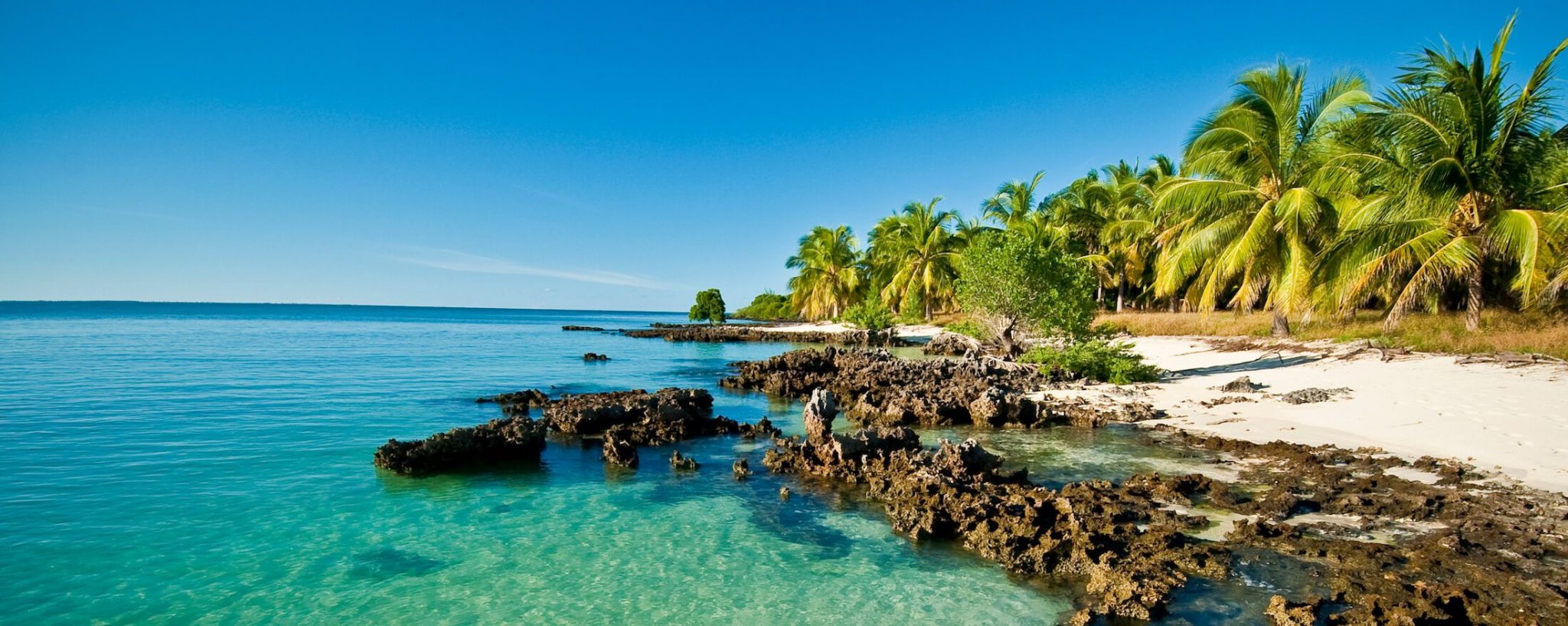
Extensive Coastlines with Pristine Beaches
Mozambique has all the elements of a perfect tropical beach. White sand, azure water, and swaying palm trees. The country’s many beautiful beaches mostly drive Mozambican tourism.
Mozambique boasts a coastline of more than 2,500 kilometres along the lush Indian Ocean and dozens of lovely offshore islands. Diving, fishing, whale viewing, and birdwatching are reasons why you should visit Mozambique Africa
Even at the most developed resorts, the coastline remains largely untouched, so visitors enjoy virtually empty beaches that stretch for kilometres.
Cool Old Cities
Visitors visiting Mozambique should not miss the opportunity to experience the tranquillity and history of Inhambane. The coastline of Inhambane is one of the most popular tourist destinations due to its abundance of beautiful beaches. It has unending groves of towering coconut palms and excellent marine activities.
The island of Mozambique, the first European settlement on Africa’s eastern coast, is one of the world’s most fascinating and unusual places. Several of the earliest surviving structures in the southern hemisphere are in Mozambique Island. It’s a crescent-shaped island measuring roughly 3 kilometres from north to south and no more than 600 meters wide.
The village of Ibo, located on the island of Ibo, is one of the oldest towns in all of Mozambique. Travellers who make it to this fascinating town rave about their time spent exploring its worn streets. Chatting with the friendly locals is always a high point of their Mozambican adventure.
Welcoming National Parks

Recent years have seen the improvement and opening of numerous national parks in Mozambique. The 5,250 km2 Gorongosa National Park was rehabilitated and is one of Africa’s finest safari locations.
Niassa Nature Reserve is the third largest wildlife refuge in Africa. It provides visitors with as close to a true unspoiled African bush experience as is possible in the modern era.
Canoeing down the river, past sputtering hippos, drinking elephants, and a splendid array of birds is completely enthralling. Guided game walks allow visitors to experience the thrill of the African bush, which is why you should visit Mozambique Africa.
Maputo’s Lively Cultural Scene
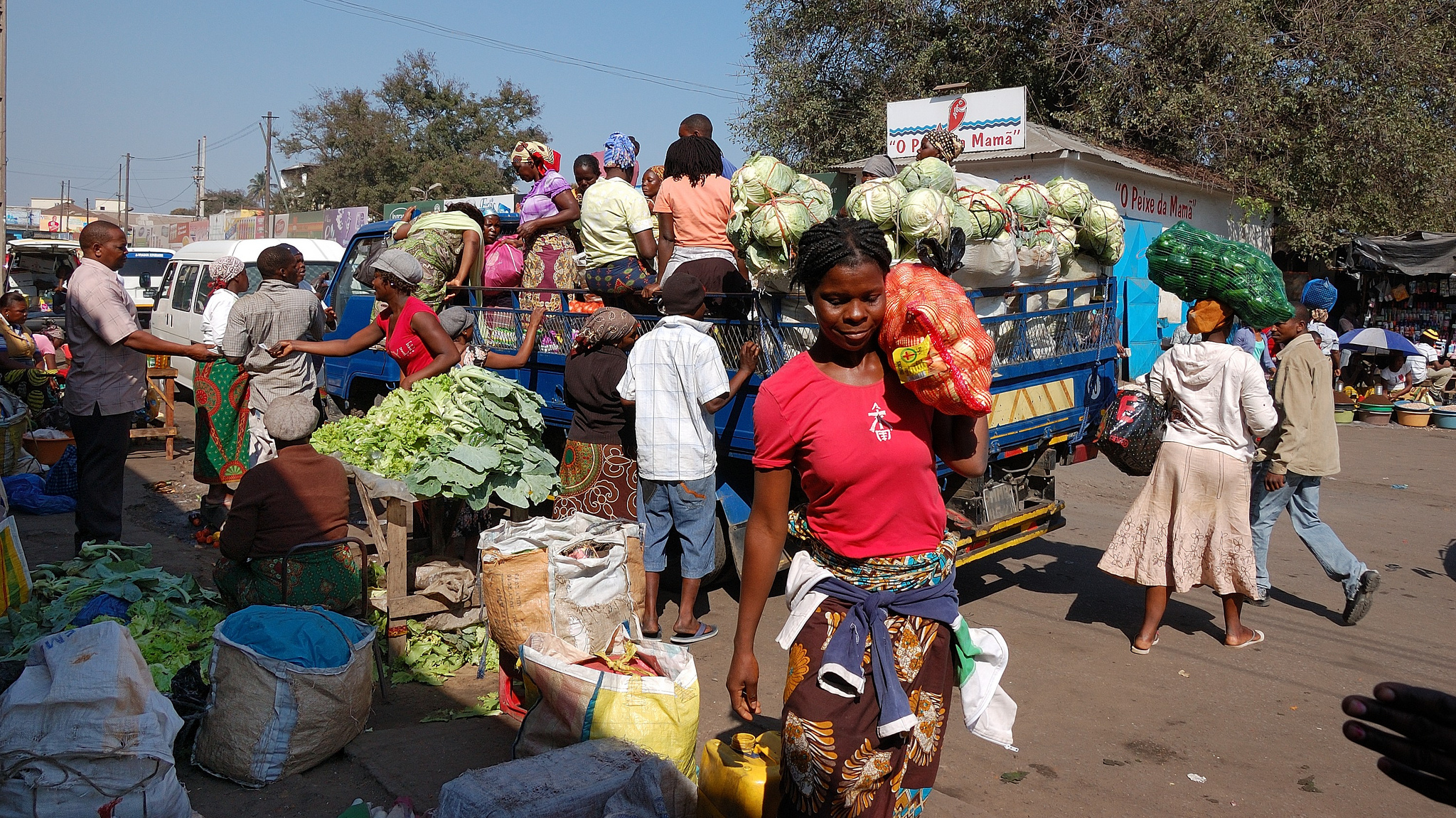
As Mozambique’s largest city, Maputo is and feels unique. The atmosphere in the streets and marketplaces is lively and upbeat. Drivers are generally polite and less frantic than in many other parts of Africa.
If you visit Maputo without any preconceived notions, you will find that it is, in fact, a really pleasant city. It’s safe as any other African city and boasts significantly more charm and personality than most of its contemporaries.
The avenidas have a laid-back, unhurried, Afro-Mediterranean vibe that is uniquely Mozambican. The jacaranda, flame, and palm trees that line them up support the abundance of street cafés. Charming historic colonial structures surround them in varying stages of repair or decay.
But it still gives the sense that this city has both a rich past and a promising future. That’s why you should visit Mozambique Africa.
The Waters of Niassa Lake
Lago Niassa, often known as Lake Malawi, is the third-largest lake in Africa and the ninth-largest lake in the world. It stretches 585 kilometres from north to south and can be as wide as 75 kilometres from east to west.
Located at the southern end of the Rift Valley, the lake is truly spectacular. It reaches depths of up to 700 meters and is surrounded by the towering mountains of the Rift Valley escarpment.
Thanks to its crystal-clear water and low pollution levels, it supports more fish species than any other lake on earth. This includes hundreds of endemic cichlids.
Further Africa

SUBSCRIBE TO GET OUR NEWSLETTERS :
Check your inbox or spam folder to confirm your subscription.

Airlink to Connect Cape Town and Maputo with Direct Flights
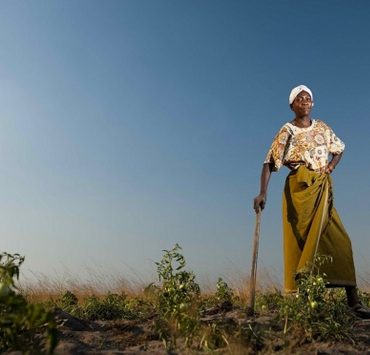
Women are Priority in the Granting of Land Titles – Nyusi
Mozambique’s kisawa sanctuary is the african beach holiday you’ve been dreaming of.
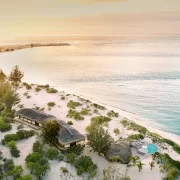
Discover the 5 Most Affordable African Countries to Visit
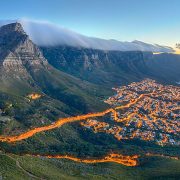
All You Need to Know About Kilimanjaro
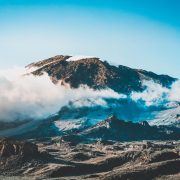
Beyond Sossusvlei Desert Lodge
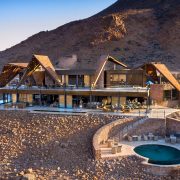
Comoros – A Fresh Look at African Destinations to Visit
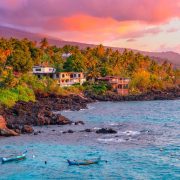
Breaking Down The Cost of a Dream African Safari

Rome, the Eternal City. From the Coliseum to… Flying Donkey

Meet Cidade Velha, the “Cradle” of Cape Verde
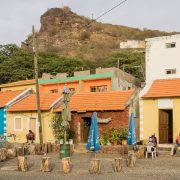
Meet the Largest Urban Forest in the World
Meet the Largest Cruise Ship in the World
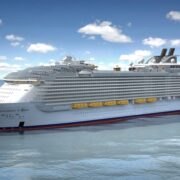
Voyager Station: the First Luxury Hotel in Space

Visual Requalification Project Gives Maputo a New Image

We have detected that you are using AdBlock Plus or other adblocking software which is causing you to not be able to view 360 Mozambique in its entirety.
Please add www.360mozambique.com to your adblocker’s whitelist or disable it by refreshing afterwards so you can view the site.

- &BEYOND LODGES
- South Africa
- Flying solo
- With my partner
- With my family
- Adventurous
- Responsible Travel
- Private Travel
- Slow Travel
- TRAVEL TRADE PORTAL
- MANAGE YOUR TRAVEL BOARD
Why visit Mozambique?
Soft, white sand beaches lined with coconut palms stretch as far as the eye can see..
- Indian Ocean Islands
- South America
- The Wild Coast
- Island adventure
- Island family fun
- Island romance
- Islands - when to go where
- Bazaruto Archipelago
- Quirimbas Archipelago
The pearl of the Indian Ocean, Mozambique boasts 2 500 km (1 550 miles) of pristine beachfront on the mainland, with a string of beautiful and idyllic tropical islands, glittering like jewels in the warm, azure waters of the Indian Ocean.
Mozambique has remained an exclusive destination as many of its islands and mainland beaches are isolated and secluded, offering travellers the ultimate escape. There are no golf courses or shopping malls here, but the unspoiled natural beauty and rich marine life has pushed the country to the top of the list for honeymooners, scuba divers and water sport fanatics.
- Several small island paradises, including the Bazaruto Archipelago , sit just off the coast
- World-class angling, including saltwater fly-fishing and big game fishing for marlin and sailfish (tag and release)
- Tropical luxury resorts on the islands and mainland
- A paradise for scuba diving and snorkelling
- Devour Mozambique’s world-famous prawns by the two dozen in the capital city of Maputo
- See the rare dugong and five species of dolphins in Bazaruto
A pleasant time to visit Mozambique is between May and October. This is the winter, when days are dry, sunny and not too hot – daytime temperatures reach 28ºC (82ºF). The rainy season occurs in summer, when temperatures can rise to 35ºC (95º).
Summer (October – April) Min 25°C/77°F to Max 35˚C/95°F
Winter (May – September) Min 21°C/70°F to Max 28°C/82°F
Hot and sunny weather year round, with little or no rainfall through most of the year.
TAILORMAKE YOUR STAY
Talk to one of our travel specialists to tailormake your stay to any of our destinations
Use the filters below to browse our selection of hand-picked travel ideas in this iconic destination
I dream of travel that leaves our world a better place.
You’re just 5 easy (and fun) steps away from creating your ideal Travel Dream Board.
Step 1: Start with where
Step 2: Clarify what kind of traveller you are
Step 3: Tick off those grand bucket list experiences that will fire your imagination
Step 4: Log in to create and add to your Dream Board
Step 5: Share & start dreaming
Leaving our world a better place for years
Discover the impact legacy that your travel with &beyond is driving. just as the un’s sustainable development goals have been a touchstone for our vision 2020 group-operation sustainability audits, so they continue to guide and underpin our ambitiously scaled vision 2030 goals., we're sorry but this site doesn't work properly without javascript enabled., please enable it to continue., privacy overview.

- Destinations
Mozambique Travel Guide
National Geographic’s latest travel stories about Mozambique
- Terms of Use
- Privacy Policy
- Your US State Privacy Rights
- Children's Online Privacy Policy
- Interest-Based Ads
- About Nielsen Measurement
- Do Not Sell or Share My Personal Information
- Nat Geo Home
- Attend a Live Event
- Book a Trip
- Inspire Your Kids
- Shop Nat Geo
- Visit the D.C. Museum
- Learn About Our Impact
- Support Our Mission
- Advertise With Us
- Customer Service
- Renew Subscription
- Manage Your Subscription
- Work at Nat Geo
- Sign Up for Our Newsletters
- Contribute to Protect the Planet
Copyright © 1996-2015 National Geographic Society Copyright © 2015-2024 National Geographic Partners, LLC. All rights reserved

IMAGES
VIDEO
COMMENTS
Mozambique beckons with its coastline and swaying palms, its traditions, its cultures, its vibe and its opportunities for adventure. This enigmatic southeast African country is well off most travelers' maps, but it has much to offer those who venture here: long, dune-fringed beaches, turquoise waters abounding in shoals of colorful fish, well-preserved corals, remote archipelagos in the north ...
Every day we added to our waistline gorging on lobsters, spicy crab, and endless amounts of prawns. The local and most famous staple is matapa, a delicious blend of coconut and cassava leaves. 3. The secluded beaches. Secluded beaches are one of the top reasons to visit Mozambique.
Read 10 reasons why Mozambique should be your next holiday destination ! 1. Mozambique has some of the most pristine dive sites in the world. The reefs of the Bazaruto Archipelago are home to over 1200 species of marine creatures including the rare Dugong. 2. With over 2500km of un-spoilt beaches Mozambique is the ideal secluded beach destination.
Mozambique is in the tropics and experiences a hot and humid climate throughout the year. December to April is the rainy season, so the best time to travel to Mozambique is between May and November. This is their winter season and will yield cooler temperatures and fewer chances of rain.
Points of Interest: Bazaruto Archipelago, Quirimbas Islands, and more… Average Flight Time: 24 h 45 min flight Fun Fact: The Island of Mozambique, just off Northern Mozambique, is a UNESCO World Heritage site. Why Visit Mozambique. With the turquoise beaches and rich marine life, Mozambique is already the number one choice of tourists from South Africa and overseas.
Flights are infrequent and illogical, rarely going from where you are to where you want to be, and especially not on the date you want to fly. When you're in Mozambique, less is more. Build travel delays into your schedule and aim to spend three-to-five days in each place rather than one or two.
Best Time for Birding. Mozambique is home to over 600 species of bird, all of which are best spotted during the months between November and February. This time of year is the country's green season, with the rainfall attracting many migratory species, including rare species of cuckoo. High Season. Low or Green Season.
In the Bazaruto Archipelago and the Quirimbas Islands, you can have the opportunity to go swimming, diving, or snorkeling; Mozambique has something for you. The Mozambique Channel along the country's coastline is a hotspot for scuba diving and snorkeling. The warm waters are home to a plethora of marine life, including colorful coral reefs ...
Here are our favourite reasons to go on vacation in Mozambique: 1. Soak Up the Sun on Immaculate Beaches & Unspoilt Islands. Swaying palm trees, year-round balmy weather, sparkling turquoise waters, and powder-white soft sand are staples of beaches in Mozambique. Whether you find yourself on the coastline of the mainland or the shores of one of ...
Ilha de Mozambique is not easy to reach, nor is the island cheap. There are many mid-range lodging options, but few budget or luxury options (but this is slowly changing). That puts Mozambique Island squarely off the tourist trail. And that is perhaps why Ilha is so fantastic for travelers willing to make the leap.
The weather in Mozambique can be quite unpredictable, making picking the best time to visit a little tricky. From December to March, the country is met with steamy thunderstorms, random downpours, and high humidity. During this season, you may not have the ideal Indian Ocean conditions, however, the water is warm, prices are low, and makes for ...
More affordable and less commercial than other African countries, here are our top five reasons to visit Mozambique now. 1. Bewitching Beaches and Secluded Islands. If the endless wide tropical ...
Places To Visit in Mozambique. Mozambique is a beautiful country located on the eastern coast of Africa, boasting stunning beaches, historical sites, and vibrant culture. From its idyllic islands and white sand beaches to its vibrant cities and colonial architecture, there's something for everyone in Mozambique. A trip to Mozambique is sure ...
Lets explore the best places to visit in Mozambique: 1. Bazaruto Archipelago. Source: flickr. Bazaruto Archipelago. There's nothing quite like the Bazaruto Archipelago. A speckling of elongated isles in the Indian Ocean, they are a patchwork of shimmering, aquamarine seas and coral gardens, windblown sand dunes and ochre-hued coastal hills ...
Here are 10 reasons why you should visit Mozambique. 1. Beaches. Mozambique is home to some of the world's most beautiful and unspoiled beaches. Whether you're looking for a romantic getaway, a family vacation, or a spot to relax and unwind, Mozambique's beaches have something for everyone. From the white sand beaches of the Bazaruto ...
The Mozambique Holiday Experience is One for Adventurers Seeking Authenticity during their Travels. A land of culture, exceptional people, and sun-kissed beaches, Mozambique jives to its own uniquely African vibe and has become the kind of place that adventurous travellers love to explore. Stretching lazily along around 2,500 km of Africa's ...
If you're keen to taste and experience Mozambique's unique mix of culture, sand and sea, here are five reasons to go on a Mozambique safari. 1. Africa's greatest wildlife restoration story. Elefante no Parque Nacional da Gorongosa em Moçambique #elefante #elephant #gorongosanationalpark #parquenacionaldagorongosa #gorongosa #projectnoah # ...
Throughout this comprehensive travel guide, we will delve into the various aspects of Mozambique, including how to get there, visa requirements, the best time to visit, top tourist destinations, cultural experiences, local cuisine, transportation options, and more. By the end of this guide, you will be equipped with all the information you need ...
Mozambique enjoys a beautiful coastline of 2,500 km and is beautiful year round. Nevertheless, he heavy rains come between December to April and travel during this period may be difficult. May to October are considered the best months to visit. Temperatures in the north are generally warmer than the south.
The magnificence and allure of the coastline along the Indian Ocean is a compelling reason why you should visit Mozambique Africa. The coastline is characteristic of calm islands and historic settlements. You can experience a safari on Niassa Reserve, traditional silversmithing on Ibo, and snorkelling amid colourful reef fish at Bazaruto. You could also take…
The pearl of the Indian Ocean, Mozambique boasts 2 500 km (1 550 miles) of pristine beachfront on the mainland, with a string of beautiful and idyllic tropical islands, glittering like jewels in the warm, azure waters of the Indian Ocean. Mozambique has remained an exclusive destination as many of its islands and mainland beaches are isolated and secluded, offering travellers the ultimate escape.
Destinations. Mozambique Travel Guide. National Geographic's latest travel stories about Mozambique.
Join us to find the top ten things to do in Mozambique and your holiday in Africa will be the most Instagrammable vacation on social media. Self-drive or fly, Mozambique is easily accessible and a warm, friendly country to visit. Explore the secluded beaches and desert islands along 2500km of coastline.